Boutique Japan

20 Essential Japanese Phrases for Travelers to Japan
If you’re visiting Japan and a little worried about the language barrier (or you simply love languages), we’ve got you covered with these essential Japanese phrases for travelers.
In our guide to what we believe are the most important Japanese phrases for travel, we’ll introduce you to a selection of key words and phrases — and explain why the Japanese language barrier is not as worrisome as you might think.
The truth is, you do not need to speak any Japanese to have a successful, wonderful trip to Japan (and if you’re looking for travel inspiration, check out our favorite destinations in Japan ). However, learning a few key Japanese phrases can make your trip just that much better. So let’s get into it!
Download our Free Japanese Phrasebook:
Originally written in 2014, this post was updated and republished on November 1, 2019.
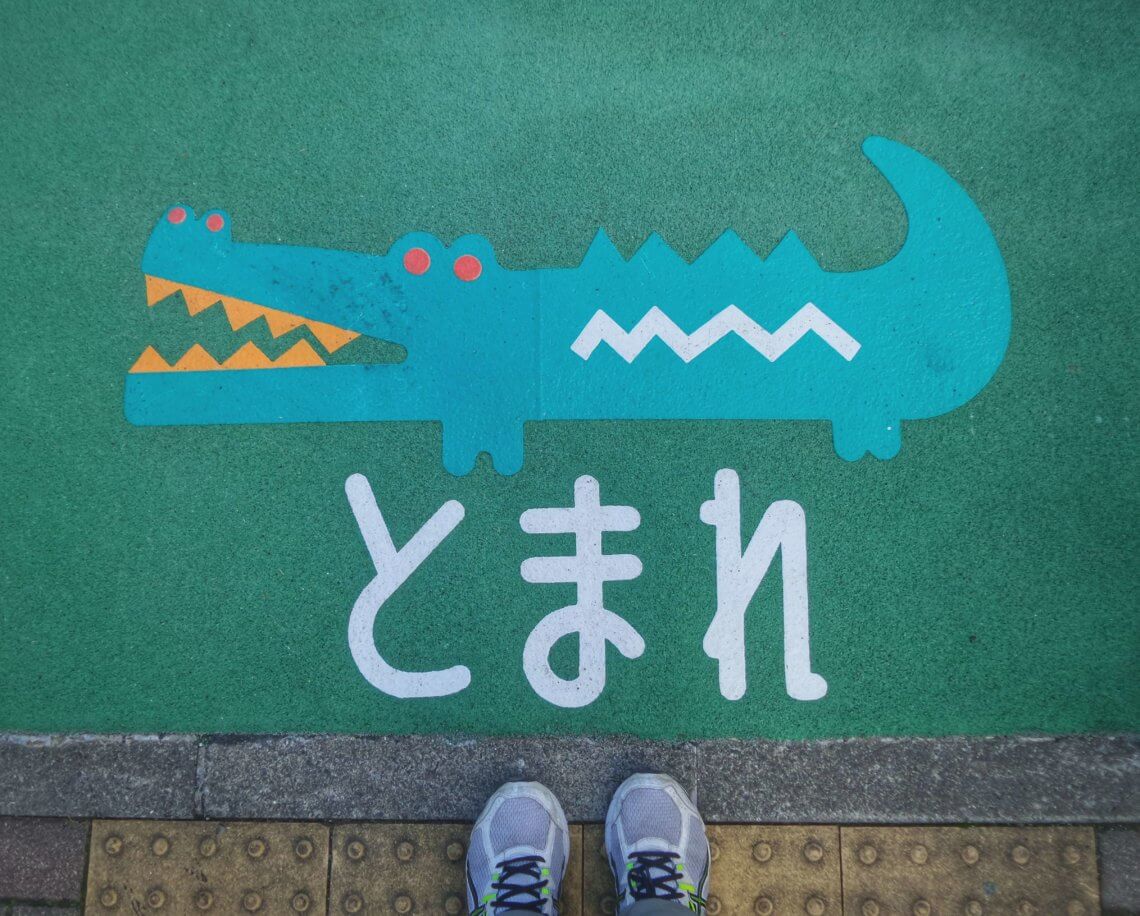
The Most Essential Japanese Words & Phrases for Your Trip to Japan
Learning Japanese can seem daunting, but don’t worry. You don’t need to learn any of these words or phrases to have a great time (see why we love Japan ).
However, as any seasoned traveler knows, making a little linguistic effort can go a long way, and it can be helpful to learn even a little of the local language for your travels. We’ve narrowed it down to a small selection of key words and phrases, divided by category:
- The Basics: Key Japanese Words and Phrases
- Food and Drink: Eating Your Way Around Japan
- Now or Later: Time-Related Phrases in Japanese
- Getting Around Japan: Transportation-Related Phrases
Here is a quick look at the words and phrase you’ll find below:
Top 20 Essential Japanese Travel Phrases:
- Konnichiwa (こんにちは) – Hello
- Arigatou Gozaimasu (ありがとうございます) – Thank you
- Sumimasen (すみません) – Excuse me
- __ o Kudasai (__をください) – I would like __, please
- __ wa Doko Desu ka? (__はどこですか) – Where is __?
- Itadakimasu (いただきます) – An expression of gratitude for the meal you’re about to eat
- Omakase de (お任せで) – Used to order chef’s recommendation (often for sushi)
- O-sake (お酒) – General term for alcohol
- Nihonshu (日本酒) – Japanese sake
- Kinen Seki (禁煙席) – Non-smoking seat
- Ima Nanji Desu ka? (今何時ですか) – What time is it now?
- Nanji ni? (何時に?) – At what time?
- Asa (朝) – Morning
- Kyou (今日) – Today
- Ashita (明日) – Tomorrow
- __ ni Ikitai (__に行きたい) – I want to go to __
- Tomete Kudasai (止めてください) – Stop, please
- Kippu (切符) – Ticket
- Shinkansen (新幹線) – Bullet train
- Dono Densha? (どの電車?) – Which train?
If you’re concerned about memorizing all this Japanese, or want to learn even more words and phrases, download Boutique Japan’s Tiny Phrasebook for free.
And for an introduction to how to say these words and phrases, see our bonus video to help you practice your Japanese pronunciation .
Basic Japanese Words and Phrases
Let’s start with a few of the most basic-yet-essential Japanese words and phrases. Even if you only remember how to say hello or thank you , you’ll find that Japanese people will be appreciative of your efforts!
1. Konnichiwa (こんにちは) – Hello
Let’s start with one you’ve probably heard before: the word for hello is konnichiwa .
Konnichiwa is typically used during the day, and there are other phrases for good morning and good evening ( ohayou gozaimasu , and konbanwa , respectively). But when you’re starting out it’s best to keep things simple, and if you simply learn konnichiwa you can use it throughout the day to say hello !
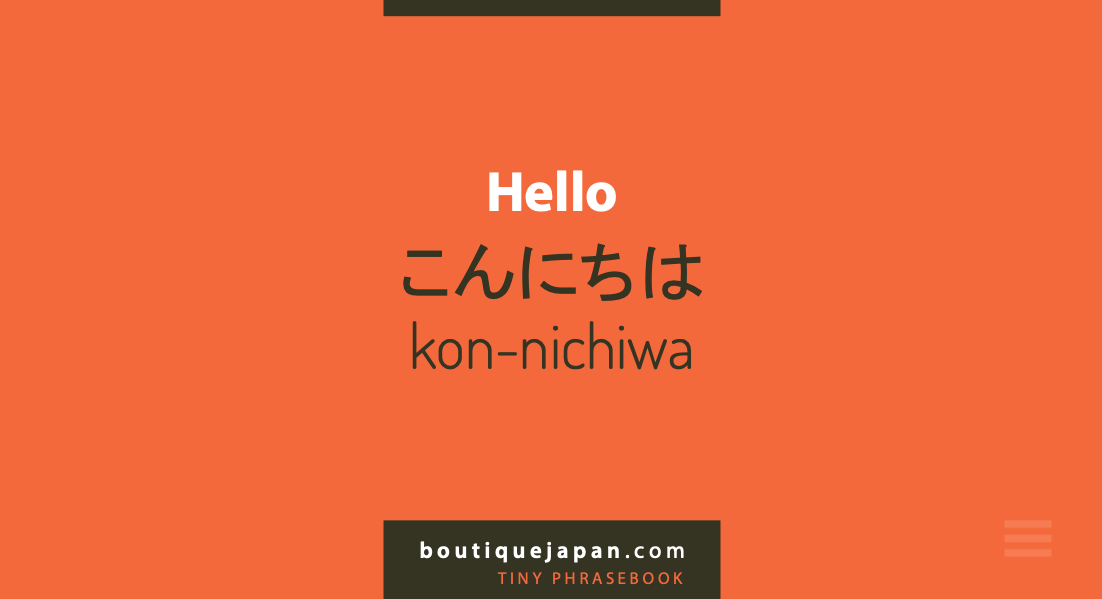
2. Arigatou Gozaimasu (ありがとうございます) – Thank you
In Japan, etiquette is no joke, and chances are you’ll be saying thank you a lot (learn more in our guide to Japanese etiquette ).
The word for thank you in Japanese is arigatou gozaimasu (in Japanese, the u at the end of some words is barely pronounced to the point of being nearly silent). You can usually simply say arigatou , which is a little more casual but usually perfectly fine. In Japan, where politeness is such a key part of the culture, you’ll be saying arigatou gozaimasu a lot!
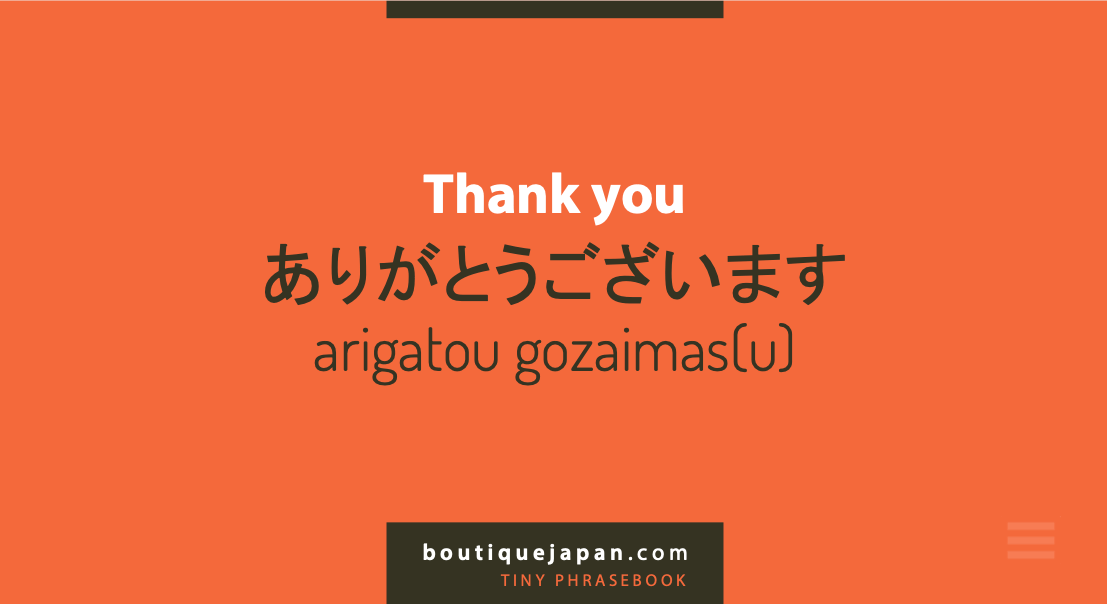
3. Sumimasen (すみません) – Excuse me
Excuse me is an important expression in any language, and Japanese is no exception.
The word for excuse me in Japanese is sumimasen . Chances are you’ll also be using this one quite a bit, so if you can try and memorize it! It’s a doubly useful word, as it can be used both to get a person’s attention, and also to apologize.
For example, use sumimasen at an izakaya (a Japanese-style gastropub) to get a waiter’s attention. At izakaya , it’s often called out as sumimaseeeeee~n ! On the other hand, if you accidentally walk onto a tatami floor with your shoes on (something you’re likely to do at some point) you can use sumimasen to say I’m sorry .
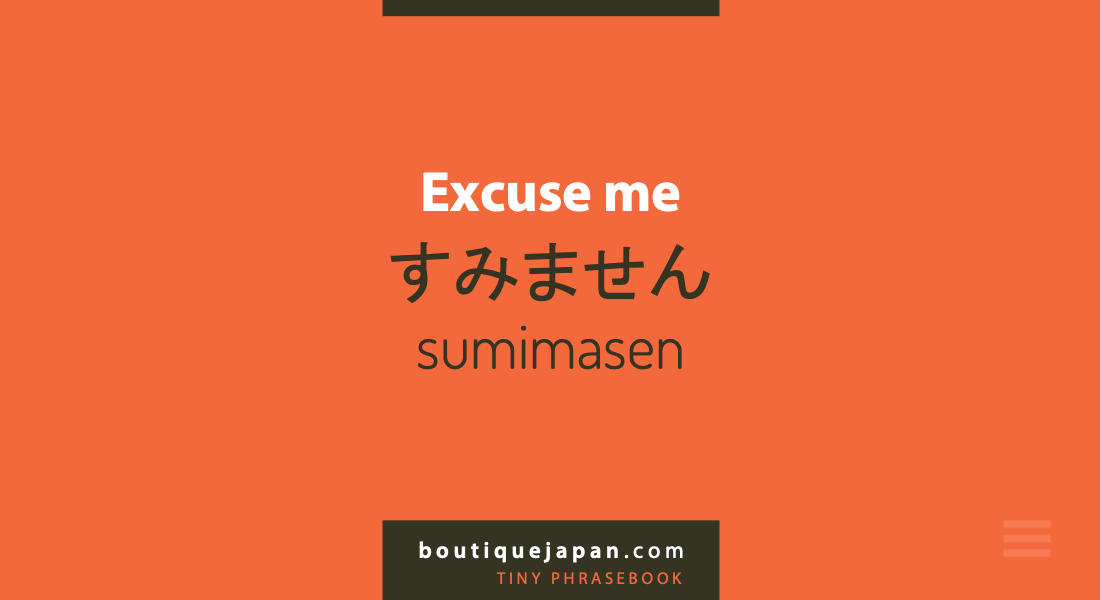
4. __ o Kudasai ( をください) – I would like , please
Now that we’ve covered three basic essentials, we can move onto two key sentences that will hopefully help you a lot.
First is I would like __, please . This is useful in a variety of situations: at restaurants, in stores, and on many other occasions you’ll encounter while traveling. In Japanese, it’s __ o kudasai (simply fill in the __ [blank] with the item of your choice).
To get the most out of this phrase, you may want to learn a few vocabulary words, such as water (mizu), beer (biiru) , sake , and others you think you may need.
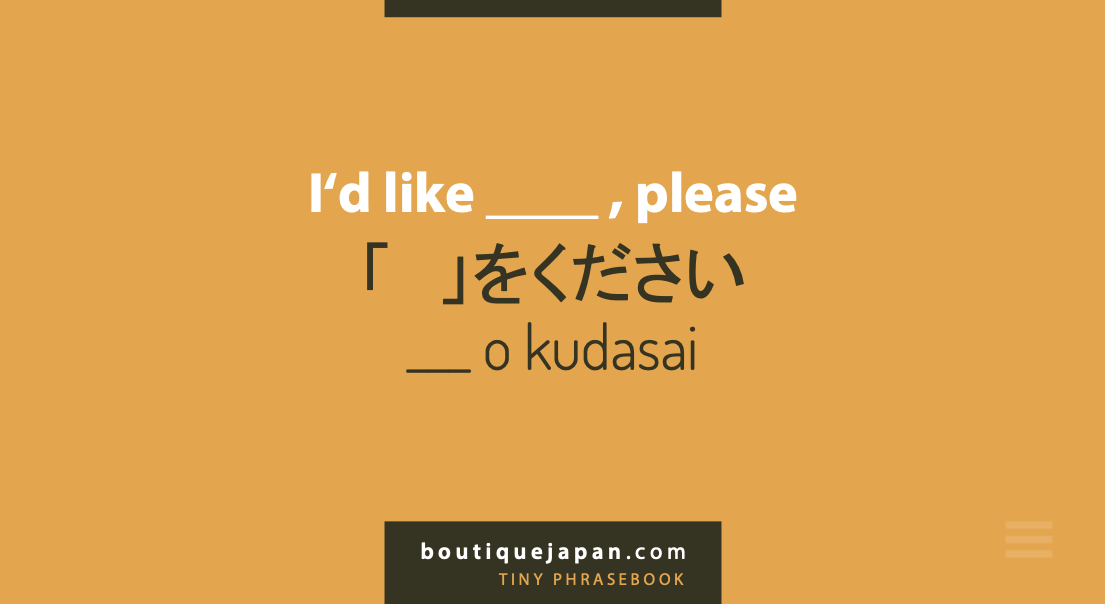
5. __ wa Doko Desu ka? ( はどこですか) – Where is __?
Last but not least, we think it’s quite useful to be able to ask Where is the __? This is useful even if you can’t understand the answer, because once you ask, people will be able to point you in the right direction, or even help you get to where you’re going!
In Japanese, it’s __ wa doko desu ka? (simply fill in the __ [blank] with the place you’re trying to reach, such as the Ghibli Museum ). One key vocabulary word that often goes along with this phrase for travelers is eki , which means station (for example, Shinjuku eki is Shinjuku station ).
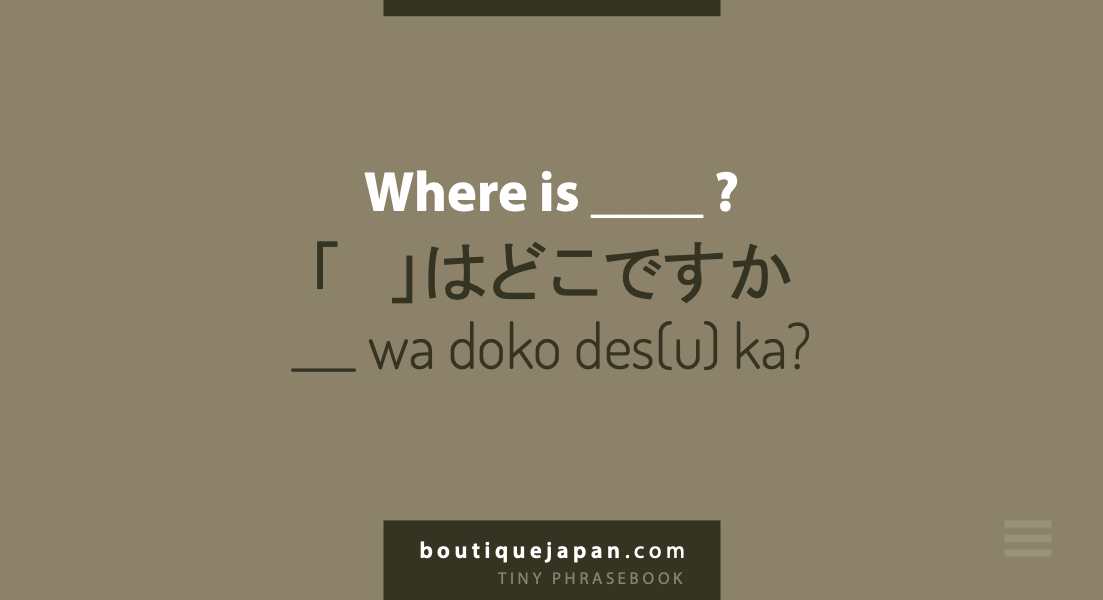
Eating Your Way Around Japan: Food and Drink Phrases
For many travelers, Japanese food is a top priority! From classic Tokyo sushi restaurants to the legendary food culture of Okinawa , there’s a lot to take in. For alcohol afficionados, Japan also offers sake , Japanese whisky , shochu , and other traditional beverages.
While you don’t need to speak any Japanese to enjoy eating and drinking in Japan, these key words and phrases will help you make the most of your culinary experiences.
6. Itadakimasu (いただきます) – An expression of gratitude for the meal you’re about to eat
Certainly not required, but if you say itadakimasu before you begin eating, whether in a restaurant or at a person’s home, they will surely be impressed with your manners.
Essentially, this phrase expresses humility and thanks for the meal you are about to enjoy. The website Tofugu does a very nice job of explaining the meaning of itadakimasu .

7. Omakase de (お任せで) – Used to order chef’s recommendation (often for sushi)
If you’re a passionate sushi enthusiast, you probably already know the meaning of omakase .
When you tell a chef omakase de , you’re letting them know that you’re placing the meal in their hands. Especially for travelers with adventurous palates, this is the best way to experience a meal at a Tokyo sushi shop , for example.
However, the phrase is not only used at sushi restaurants, and can often be used at other types of establishments as well.

8. O-sake (お酒) – General term for alcohol
Technically osake , this word has tripped many a non-Japanese speaker up! While in English the word sake means, well, sake , in Japanese the word sake — more politely, osake — refers to alcoholic beverages in general.
( Sake and osake are virtually interchangeable; the “o” is what is known as an honorific prefix, but unless you’re studying Japanese in more depth, you really don’t need to worry about this!)
So if you’re looking for sake (which in Japanese is called nihonshu) , it’s best to ask for nihonshu (see below). If you’re simply looking for an adult beverage (such as nihonshu , shochu , or Japanese whisky ), the catchall term sake will do the trick.

9. Nihonshu (日本酒) – Japanese sake
See above for the distinction between sake and nihonshu !
10. Kinen Seki (禁煙席) – Non-smoking seat
Encountering cigarette smoke is somewhat of an unavoidable aspect of traveling around Japan. This being said, most of our travelers are quite averse to smoke, and fortunately it’s possible to travel around Japan without smoke becoming too much of a nuisance.
In some places, such as restaurants, you may have a choice between the smoking and non-smoking sections. Kinen means non-smoking, and seki means seat : put them together and you’ve just conveyed that you’d like to be seated in the non-smoking area!

Time-Related Phrases in Japanese
Time-related phrases can be extremely helpful in certain travel situations, and below you’ll find a few of the most practical Japanese words and phrases on this topic.
11. Ima Nanji Desu ka? (今何時ですか) – What time is it now?
Chances are you’ll have a watch or cell phone on you, but once in a while you may need to ask a stranger for the time.
The basic phrase is simply nanji desu ka? which means, What time is it? People also commonly say ima nanji desu ka? which simply means, What time is it now? ( Ima means now.)

12. Nanji ni? (何時に?) – At what time?
This is a particularly useful phrase while traveling. It can be helpful when purchasing rail tickets (see more on getting around Japan below), making meal reservations, or arranging tickets to events.
Sure, you could just ask nanji? ( what time? ) and hope your point gets across, but by adding the preposition ni you can be assured of much more clarity!
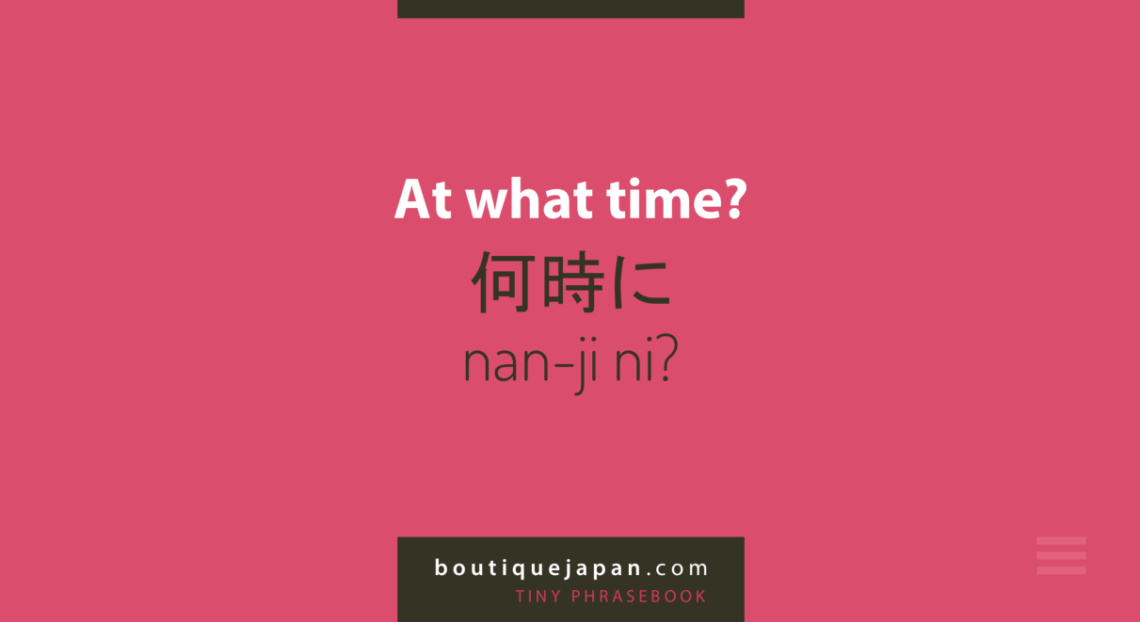
13. Asa (朝) – Morning
This one is fairly self-explanatory: asa means morning . While it’s no surprise that a food-loving culture like Japan has multiple words for breakfast , one of the most common is asagohan ( gohan literally means rice , but is more generally used to mean food ).

14. Kyou (今日) – Today
Words like today and tomorrow can be particularly useful when buying train tickets, for example. For more on transport, see the transport-related phrases below.

15. Ashita (明日) – Tomorrow
When pronouncing the word for tomorrow, ashita , the i is virtually silent, so it ends up sounding more like ashta . If you need to express the day after tomorrow, the word is asatte .

Getting Around Japan: Transportation-Related Phrases for Travelers to Japan
For some travelers, one of the biggest concerns about not speaking the language is the prospect of getting around the country, navigating the trains, and trying to avoid getting lost.
Fortunately, Japan has an incredibly efficient and easy-to-use rail network, and you can read all about it in our guide to train travel and getting around Japan . And here are some key Japanese words and phrases to help you on your way.
16. __ ni Ikitai ( に行きたい) – I want to go to __
On its own, ikitai means, I want to go .
To express that you’d like to go somewhere, use the phrase __ ni ikitai (simply fill in the __ [blank] with the place you’re trying to reach). For example, Kyoto ni ikitai means, I want to go to Kyoto .

17. Tomete Kudasai (止めてください) – Stop, please
Tomete means stop , and is particularly useful in taxis. The kudasai here means please , and makes the phrase much more polite ( tomete on its own would come off as quite brusque).

18. Kippu (切符) – Ticket
Kippu means ticket (as in train tickets). As you can easily imagine, when purchasing rail tickets it can be very useful to be able to tell the ticket agent that you’d like a ticket to a certain place!
Made means until or to (in this case, to your destination). For example, Osaka made means to Osaka . Thus, Osaka made no kippu means ticket to Osaka . Put it all together with kudasai (for politeness) and you have Osaka made no kippu o kudasai .

19. Shinkansen (新幹線) – Bullet train
Ah, the shinkansen . One of the utter joys of traveling around Japan is the world-famous shinkansen (bullet train).
Whether you have the well-known Japan Rail Pass or not, if you’re doing any domestic travel within Japan, chances are you’ll end up on the incredible (and incredibly pleasant) shinkansen for at least one if not more of your journeys. Enjoy, and grab a bento and some nihonshu (see above) for the ride!

20. Dono Densha? (どの電車?) – Which train?
Wondering which train you need? Imagine you’re in Kyoto Station, headed for Tokyo. You’re on your shinkansen’s departure platform, but you see two trains.
You show your ticket to a friendly Japanese person, and ask, dono densha? They take a look at your ticket and the two trains, and point you to the right one. And you’re on your way – happy travels!

Download our Free Japanese Phrasebook PDF
For those of you who want to learn even more Japanese for travel, we’ve created the Boutique Japan Tiny Phrasebook.
Our Tiny Phrasebook features carefully selected Japanese words and phrases designed to help you get the most out of your trip to Japan. You’ll find all of the words and phrases featured above, and many more!
The phrasebook is a beautifully designed PDF (it may take a few moments to load depending on your internet speed).
Simply save it to your smartphone, tablet, or computer. We suggest using an app like iBooks (or another PDF reader) so you can search for words and navigate easily.
Bonus Video: Practice your Japanese Pronunciation
One of the best things about Japanese is that it’s surprisingly easy to pronounce. Unlike several other languages throughout Asia, Japanese is not a tonal language.
In the video below, we go over basic pronunciation for some of the most useful Japanese words and phrases for your trip to Japan.
Do you need to speak any Japanese to travel around Japan ?
Absolutely not. You can travel to Japan without learning any of these words and have a great time.
People ask us about the Japanese language barrier all the time, with common questions such as, Do Japanese people speak English? How much (or how little)? The language barrier is a common myth that shouldn’t get in your way. Most of our travelers don’t speak a single word of Japanese, yet come back with testimonials of how much they love Japan .
The truth is that most Japanese people speak at least a little bit of English. These days, all Japanese students study English for a minimum of six years in secondary school, and many students — as well as adults — also take English-language classes after school or on weekends.
English-language fluency is not widespread, so most people you meet probably won’t be fluent in English, but almost everyone you meet will know at least a few English words – and many will know anywhere from hundreds to thousands.
Sometimes you may find that the people you meet are hesitant to try their English on you, but you’ll likely find that you can communicate in basic English in a huge variety of situations while traveling around Japan.
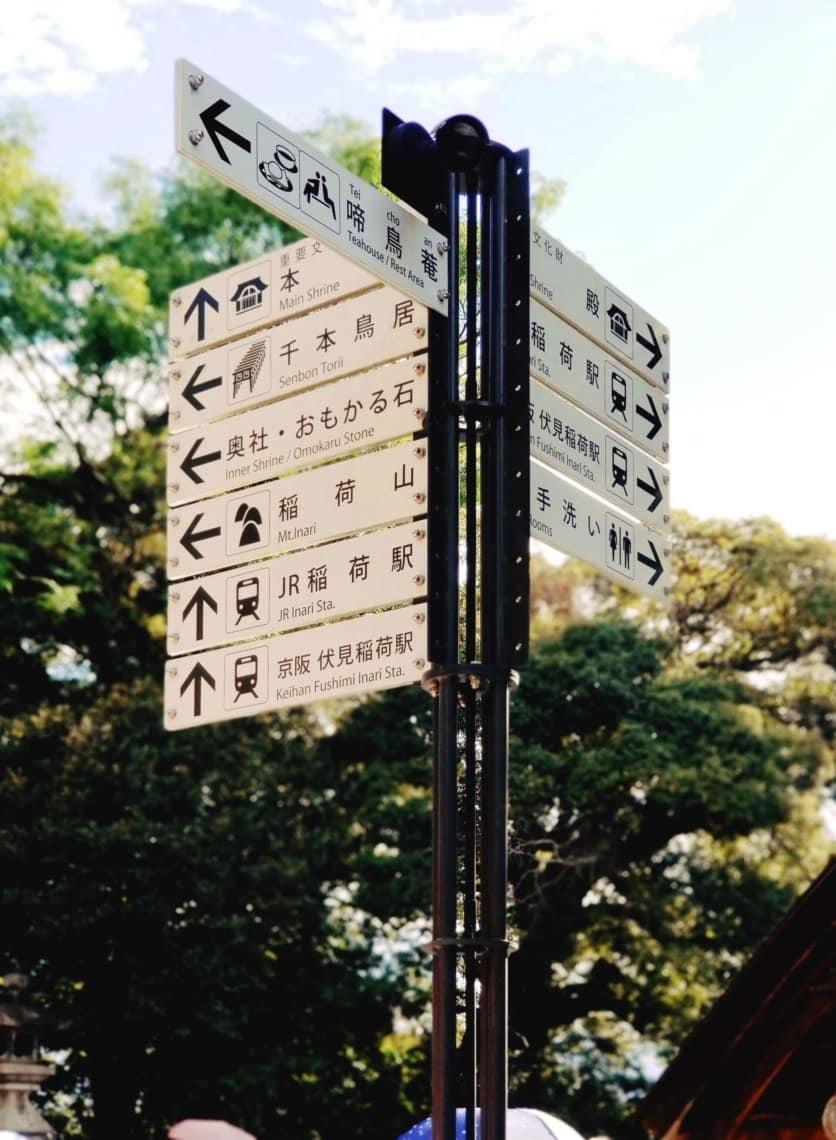
The Japanese Written Language
You may also be worried about the written language. The good news is that you don’t need to be able to read or write Japanese to enjoy Japan.
Japanese people don’t expect you to be able to read the Japanese language, and you’ll find English-language signage throughout the country. This is especially true in places frequented by travelers, such as sightseeing spots, shopping areas, train stations, airports, and often even on the street.
As for at restaurants, though it’s not always the case, in some cases you will find English-language menus. When English-language menus are not available, photos are often included to make pointing and ordering possible.
Despite Japan’s travel-friendliness, every visitor to Japan at some point finds him or herself in a situation in which linguistic communication is simply not possible, and sign language and gesturing are required.
Getting lost in a foreign country where you don’t speak the language is a fear of many would-be travelers, but if you had to pick a country in which to get lost, you couldn’t do much better than Japan! Japan is by far one of the safest countries in the world, with crime rates that are astonishingly low compared to places like the US and most of Europe. And Japanese people will often go to surprising lengths to help tourists.
Back when I first moved to Japan I spoke very little Japanese, and on my first visit to Kyoto I accidentally took the wrong train and ended up wandering around a neighborhood with no idea how to get where I wanted to go. Luckily, an older gentleman with his wife spotted me looking confused and came up to me with perhaps one of the only English phrases he knew: “ Are you lost? ” I said yes and showed him the name of the place I wanted to go.
If he had simply pointed me in the right direction it would have been helpful, but instead he started walking me in the right direction. After a few minutes of walking his wife split off, presumably to go home, and we continued. After 15 minutes of walking he had dropped me off at exactly the spot I needed to be, and – as is typical in Japanese culture – expected nothing in return. I thanked him profusely and we had a good laugh despite our inability to communicate linguistically.
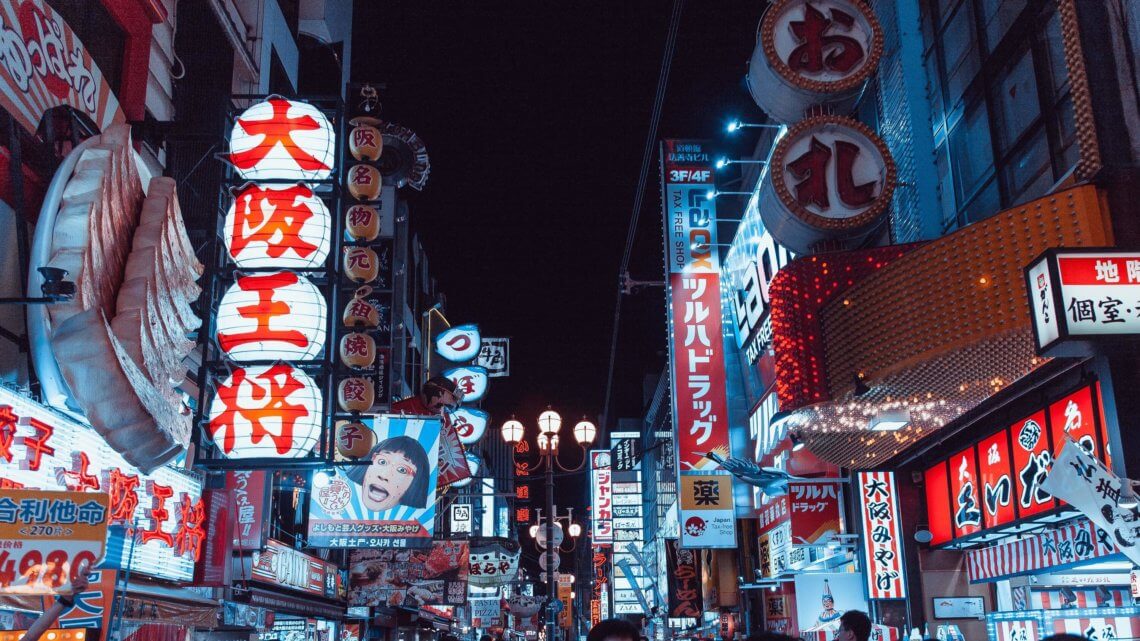
Why Learn Any Japanese if You Won’t Need it?
Almost everyone who has visited Japan has a similar story of a random act of kindness and generosity from a Japanese stranger (or a tale of a camera or passport left on a train being miraculously returned). So you can rest assured that even if you forget all of the words and phrases we’ve shown, you’ll be in good hands with the wonderful people of Japan.
But aside from the fact that it’s a rich and fascinating language, learning even just one or two Japanese words or phrases will help endear you to the Japanese people you meet during your trip, and enhance your overall travel experience.
Japanese people tend to be extremely appreciative of visitors who take the time to learn even just a word or phrase or two, and if you try then chances are you’ll be greeted with oohs and aahs of encouragement.
We hope you’ve found our guide to Japanese words and phrases for travelers helpful. Arigatou gozaimasu!
More Great Posts

Japan’s Best Boutique and Luxury Hotels & Ryokans
The best hotels and ryokans in Japan range from charming traditional inns in the countryside, to stylish design hotels and…

Traveler’s Guide to the JR Pass (Is It Worth It?)
The Japan Rail Pass (or JR Pass, for short) can be a good way to get around Japan, but many…
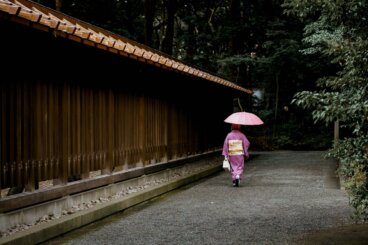
Major Holidays and Peak Travel Seasons in Japan
If you’re considering a trip to Japan during one of the country’s peak travel seasons, be aware that things can…
Plan Your Japan Trip
Learn more and contact us to discuss your unique trip.
Get Started
- The Process
- Testimonials
You are using an outdated browser. Please upgrade your browser or activate Google Chrome Frame to improve your experience.
Japanese Phrases for Tourists: 116 Essential Phrases for Your Japanese Vacation
Before I traveled to Japan for the first time, everyone assured me that “Everybody speaks English there,” and I wouldn’t need to use Japanese at all.
But in reality, most of the people I encountered in Japan had a fairly elementary level of spoken English .
For a better travel experience, you should learn some basic travel words and phrases in Japanese.
Greetings and Basic Japanese Phrases
Airport phrases you’ll hear, airport phrases you’ll use, asking for directions, receiving directions, transportation phrases, hotel phrases, eating and drinking in japan: what you’ll hear, eating and drinking in japan: what you’ll say, shopping in japan: phrases you’ll hear, shopping phrases you’ll use, number of items in japanese, tips to use your new phrases: politeness and pronunciation, how to study these japanese travel phrases.
Download: This blog post is available as a convenient and portable PDF that you can take anywhere. Click here to get a copy. (Download)

I’ll provide the hiragana, kanji and romaji for each word, and will explain the use of certain Japanese phrases for tourists in context.
1. Hello — konnichiwa
2. good morning — ohayou gozaimasu, 3. nice to meet you — hajimemashite, 4. goodbye — sayounara, 5. please — onegaishimasu, 6. thank yo u — arigatou gozaimasu, 7. you’re welcome — dou itashimashite, 8. excuse me/sorry — sumimasen.
This is definitely one to memorize. I say すみません at least 30 times a day in Japan. It’s a magical word.
It helps you push through a crowd, get attention from a waiter, ask for directions or be excused for basically any touristy blunder.
Simply saying すみません and gesturing is a pretty good way to express that you need help, but don’t speak Japanese.
9. Yes — hai
10. no — iie, 11. let’s eat/ “bon appetit” — itadakimasu .
Similar to the French “ bon appetit” , this is what Japanese people say before they eat. It doesn’t have a literal translation in English, but it’s a way to give thanks for a meal .
You should also remember this phrase’s pair: ごちそうさま (gochisousama) or ごちそうさまでした (gochisousama deshita). These phrases are used at the end of a meal and translate as “What a good meal,” or “Thank you for the meal,” the latter being the more polite form.
12. I don’t understand — wakarimasen
13. i don’t speak japanese — nihongo o hanashimasen, 14. do you speak english — eigo o hanashimasu ka , 15. can you please repeat that — mou ichido itte kudasai, 16. can you please speak slowly — yukkuri hanashite kudasai, 17. what is your name — onamae wa nan desu ka, 18. my name is… — watashi no namae wa…, 19. what is this — kore wa nan desu ka.
これ and それ literally just mean “this” and “that.”
20. How much does this cost? — kore wa ikura desu ka?
If you’re pointing at something that you can’t reach, you say それは いくらですか?
21. Can you please help me? — tasukete moraemasuka ?
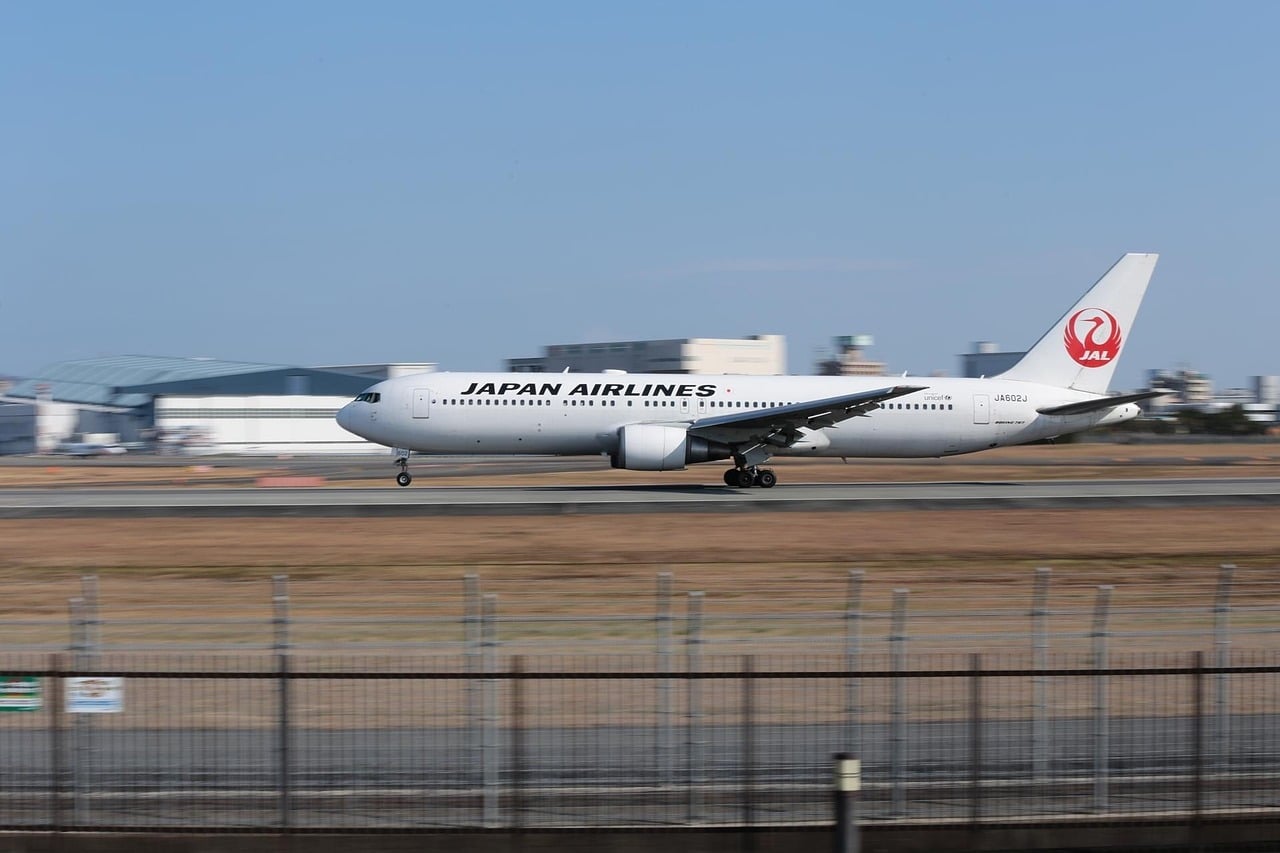
Japanese airports aren’t just places to land: they’re an entire cultural showcase on their own. For example, at the Narita Airport , you’ll see pet hotels , gacha machines , the (in)famous smart toilets and even a Pokémon Store !
22. Welcome, please come in — yokoso, o-hairi kudasai
23. please show your ticket — chiketto o misete kudasai, 24. please show your passport — pasupooto o misete kudasai, 25. what is your reservation name — yoyaku-mei wa nan desu ka, 26. the flight is delayed — furaito chien shiteimasu, 27. the flight has been canceled — furaito kyanseru saremashita, 28. baggage claim is this way — baggeji kureimu wa kochira desu, 29. we have arrived at … airport — … kuko ni tochaku shimashita, 30. we will depart for … airport — … kuko e shuppatsu shimasu, 31. there is a delay in the flight — furaito ni okure ga arimasu, 32. there are restrictions on carry-on baggage — kinai mochikomi no nimotsu niwa seigen ga arimasu.
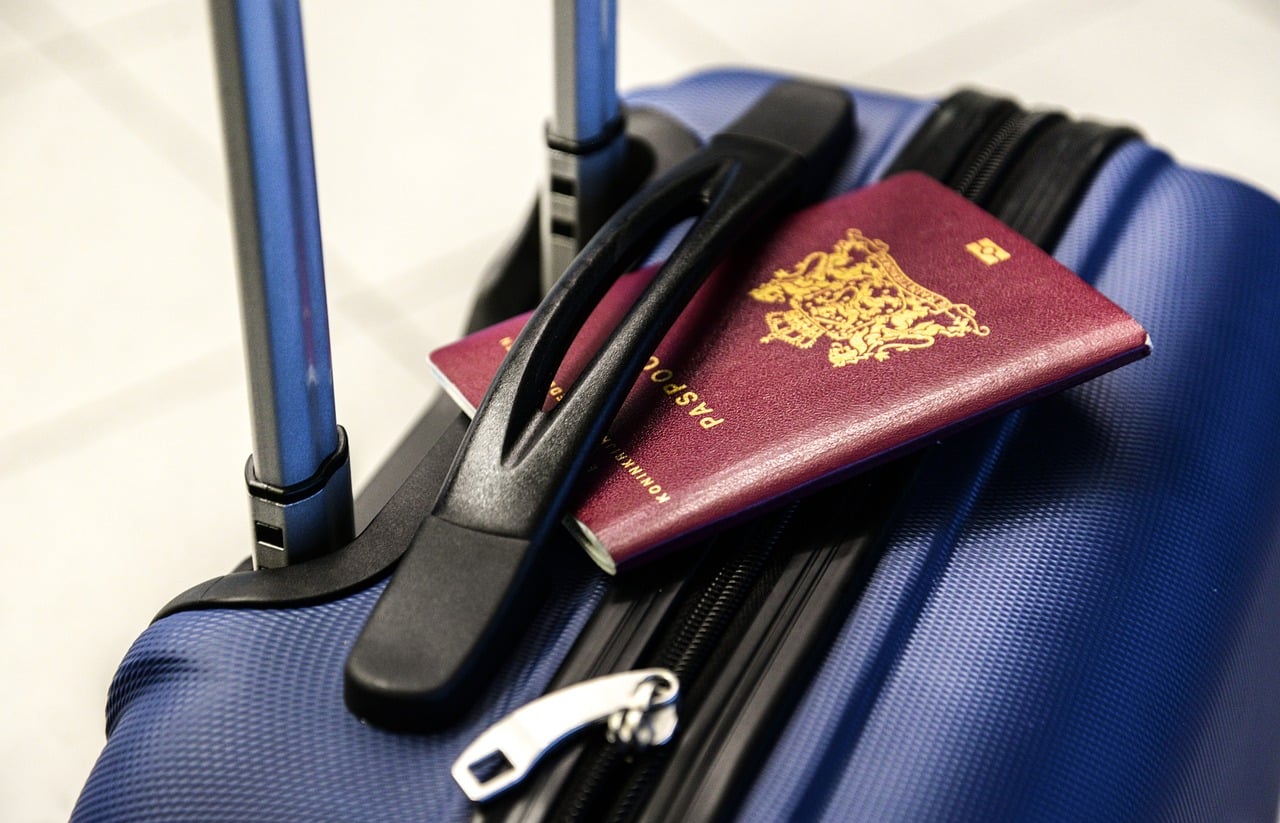
33. Please tell me how to get to the airport — kuko e no ikikata o oshiete kudasai
34. is this a departure flight — korewa shuppatsu-bin desu ka, 35. is this an arrival flight — korewa tochaku-bin desu ka, 36. where is the boarding gate — tojyo-guchi wa doko desu ka, 37. i’ll check my baggage — tenimotsu azukemasu, 38. please call a taxi — takushii o yonde kudasai, 39. i’d like to rent a car — rentakaa o karitai desu, 40. where is the gate for the connecting flight — noritsugi-bin no geeto wa doko desu ka.

Asking for directions is sort of daunting, especially when the person answers in a whole stream of fast-paced Japanese.
But you’ll find that Japan is one of the best places to be a lost and hopeless tourist. There’s always someone nearby who’s more than happy to help. I’ve even had people take time out of their days to walk me where I needed to go!
Simply say wherever it is that you want to go followed by どこですか? — doko desu ka? (Where is …?).
41. I want to go… (here) — (koko) ni ikitai desu
Say ここ if you have an address written down or a point marked on a map of where you want to go.
If you know the name or address of the place where you want to go, simply say the place name followed by に行きたいです . For example, if you want to go to Shinjuku station, you simply say 新宿駅に行きたいです — Shinjuku eki ni ikitai desu . (I want to go to Shinjuku station.)
42. Where is the…? — …wa doko desu ka?
43. can you please show me where we are on the map — watashitachi ga doko ni iru no ka, chizu de oshiete kudasai.
This might seem like an odd question (and a bit of a mouthful), but it can be a lot more helpful than asking for directions from someone who doesn’t know English.
44. Is it near? — chikai desu ka?
45. is it far — tooi desu ka.

46. Go straight ahead — massugu itte kudasai
47. turn left — hidari ni magatte kudasai, 48. turn right — migi ni magatte kudasai.

In Japan, public transportation is how most people get around. If you’re not used to taking the bus, train or anything similar, better keep the following phrases handy!
49. Take me to this address, please — kono jyusho made tsureteitte kudasai
50. what is the fare — ryoukin wa ikura desu ka, 51. stop here, please — koko de tomatte kudasai, 52. does this bus go to (street name) — kono basu wa … ni ikimasu ka, 53. does that train stop at … — sono denshya wa … de tomarimasu ka, 54. a map, please — chizu o onegai shimasu, 55. this hotel — k ono hoteru, 56. the subway — chikatetsu , 57. the train station — denshya no eki, 58. the bus stop — basutei, 59. the taxi stand — takushii noriba, 60. the exit — deguchi, 61. the entrance — iriguchi, 62. the bathroom — toire.

Like other service-oriented businesses in the country, Japanese hotels subscribe to the concept of omotenashi , which roughly translates to pouring your whole heart into service. That means you can expect employees at Japanese hotels to go above and beyond when it comes to making you feel welcome.
63. I have a reservation under the name of … — … no yoyaku o shiteimasu
64. i would like to check-in — chekkuin shitai desu, 65. what time is check-in — chekkuin wa nanji desu ka, 66. is breakfast included — choshoku wa fukumareteimasu ka, 67. where is my room — watashi no heya wa doko desu ka, 68. please give me a wake-up call at … — … ni weikuappu kooru onegaishimasu., 69. where is the nearest convenience store — ichiban chikai konbini wa doko desu ka, 70. can you recommend a good restaurant nearby — chikaku no oishii resutoran o shokaishite moraemasu ka, 71. what time is check-out — chekkuauto no jikan wa nanji desu ka, 72. where can i store my luggage — nimotsu wa dokoni azukeraremasu ka, 73. is there wi-fi in the hotel — hoteru ni wa wai-fai ga arimasu ka, 74. where is the nearest atm — ichi-ban chikai atm wa doko desu ka, 75. i’d like to have some extra towels, please — yobun no taoru o kudasai., 76. what time is breakfast served — choshoku wa nanji kara desu ka, 77. excuse me, i need an iron and ironing board — sumimasen, airon to iron-dai ga hitsuyo desu..
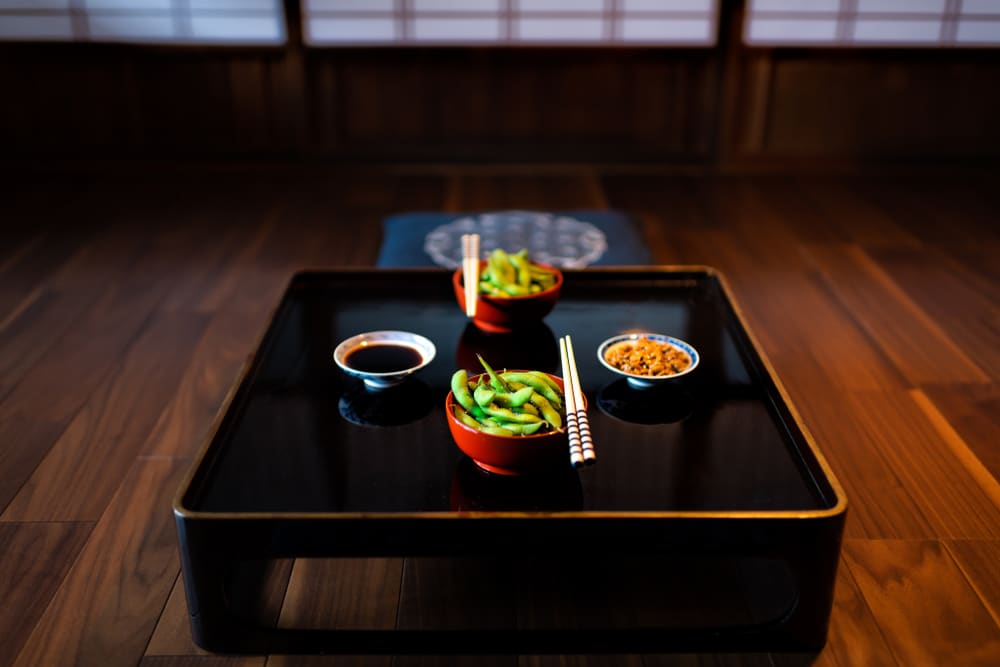
Like Japanese hotels, Japanese restaurants also practice omotenashi. Here are some of the more common phrases you’ll hear from Japanese restaurant staff.
78. Welcome — Irasshaimase
79. how many people in your party — nan mei sama desu ka, 80. this way, please — kochira e douzo, 81. certainly (in response to your order) — kashikomarimashita, 82. thank you for waiting — omatase itashimashita.

The best restaurants in Japan are the authentic ones that don’t cater to tourists. But these are also the places that have no English menus, and sometimes no English-speaking waitstaff.
Luckily, it’s very common for Japanese menus to feature photos of all the dishes. And many places have models of their dishes on display, so you likely won’t be going in completely blind.
Use these phrases , and you should be in and out of a restaurant without too many hiccups.
83. A table for two, please — futari you no teeburu o onegai shimasu
You can also replace futari with the number of people who you need to have seated:
- one — hitori ( 一人 )
- three — sannin ( 三人 )
- four — yonin ( 四人 )
If you’re confused about Japanese numbers and counters, don’t despair. You can just do as the locals do and indicate the number of diners by holding up your fingers.
84. The menu, please — menyu o onegai shimasu
85. what are today’s recommendations — kyo no osusume wa.
If everything on the menu looks appetizing and you’re not quite sure what to order, use this phrase.
86. Water, please — mizu o onegai shimasu
87. two beers, please — biiru o nihai onegai shimasu, 88. can i please have (one, two) of this — kore o (hitotsu, futatsu) onegai でdekimasu, 89. do you have a vegetarian dish — bejitarian youno ryouri ga arimasu ka.
I’ve traveled in Japan with vegetarians twice, and this question usually draws quite strange looks. Vegetarianism basically doesn’t exist in Japan, although Japanese cuisine is generally quite vegetarian-friendly.
It might work better to say これは肉ですか? — kore wa niku desu ka? , to say “is this meat?” Follow up with 私は肉を食べません — watashi wa niku o tabemasen, which means “I don’t eat meat,” if you want to make yourself understood.
90. Is … in it? — … wa haitte imasu ka?
Alternatively, you can also ask if specific ingredients are included in your food, so you’ll know whether you should order it or not.
91. That’s okay — daijyoubu desu
You can also use this expression to ask someone if they’re okay. Just add the question particle ka to the end: 大丈夫ですか ? — daijyoubu desu ka?
92. The check, please — okanjyou o onegai shimasu
Say the above, or you can do as the locals do and catch the waiter’s eye (with a smile!) and draw a clockwise circle in the air with your index finger pointing towards the roof.
In some restaurants, you need to bring the check to the cash register which is usually located by the restaurant’s doorway.
93. Cheers! — kanpai!
94. it was delicious — oishikatta desu, 95. water — mizu, 96. wine — wain, 97. beer — biiru , 98. tea — ochya, 99. coffee — coohii, 100. juice — juusu, 101. meat — niku, 102. chicken — toriniku , 103. pork — butaniku, 104. beef — gyuniku , 105. fish — sakana , 106. rice — gohan, 107. bread — pan , 108. vegetables — yasai , 109. fruit — kudamono.
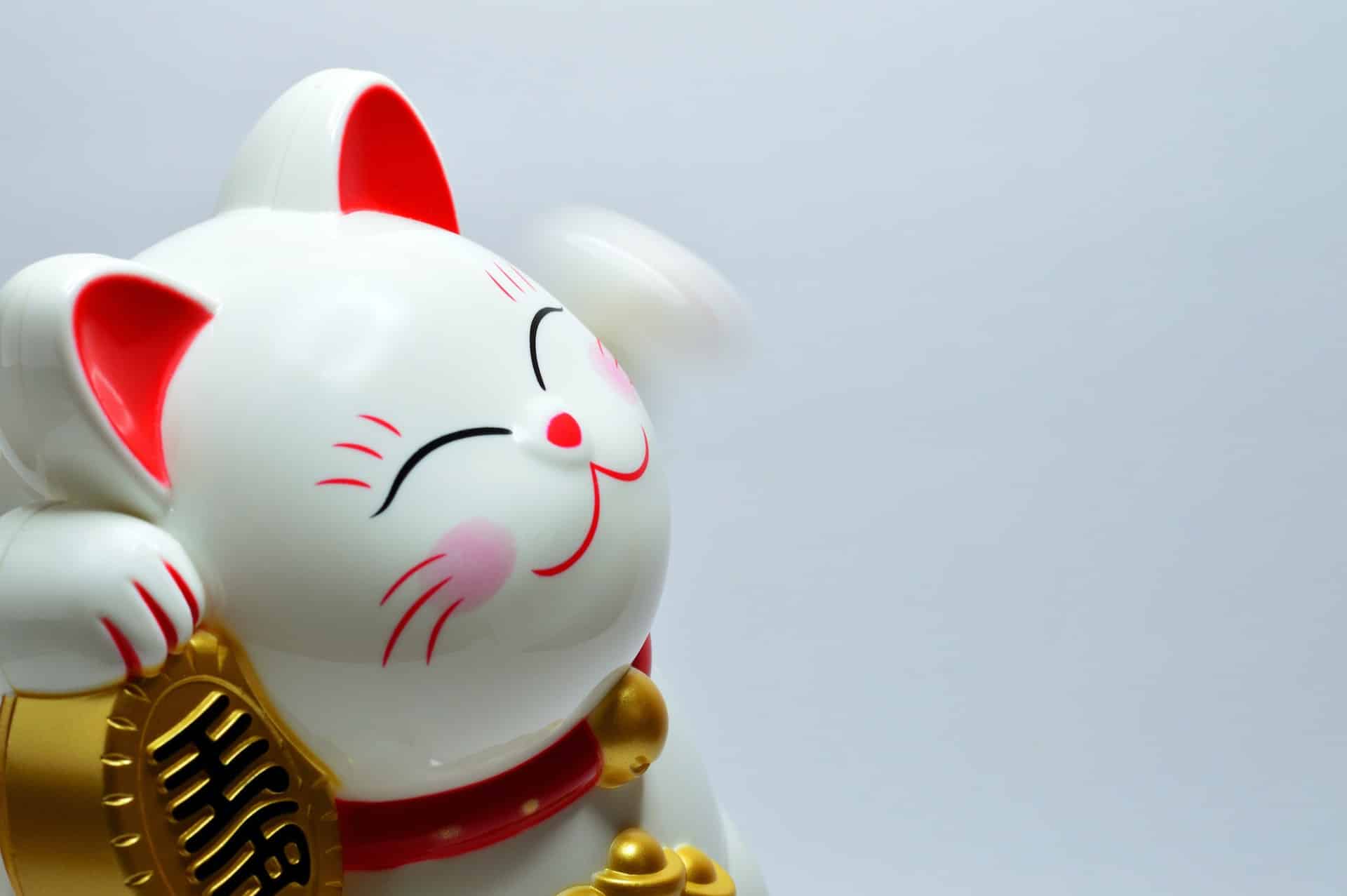
When you’re met with cries of いらっしゃいませ!, you’re not really expected to respond to this greeting. As for me, I just smile and say こんにちは which means, of course, “hello.”
Walking into a department store is particularly surreal, with each assistant taking cues from the others, so that every time a customer walks in, いらっしゃいませ bounces around the entire floor.
110. Are you looking for something? — nani ka osagashi desu ka?
111. is that all — ijyou de yoroshii desu ka, 112. here it is / here you go — hai, douzo.

113. I would like this — kore o onegai shimasu
114. i would like one of those — sore o hitotsu onegai shimasu, 115. i would like to pay in cash — genkin de onegai shimasu, 116. i would like to pay by credit card — kurejitto kaado de onegai shimasu.
The only real challenge with ordering meals in Japanese is the use of counters.
We have counters in English, too (for example “sheets” of paper, “glasses” of water, “blades” of grass), but not as many or as complicated as in Japanese.
Luckily Japanese has a “universal” counter, つ ( tsu ), which you can use for anything, including food.
The numbers one to four as つ counters are pronounced 一つ ( hitotsu )、 二つ ( futatsu )、 三つ ( mittsu ) and 四つ ( yottsu ). You can use this counter for drinks too, and the waiter will understand you.
However, if you want to be a little more impressive, you can use the drinks counter: 杯 ( hai/bai/pai depending on the number used with it). The numbers one to four using this counter are 一杯 ( ippai )、 二杯 ( nihai ) 、 三杯 ( sanbai ) and 四杯 ( yonhai ).
If you want to learn more about counters, this post explains them in more detail.
All the examples I’ve given are in the polite, neutral form of speech . You basically can’t go wrong speaking this way in Japan, so you don’t need to worry about making any social faux pas!
Some notes on pronunciation:
- Avoid turning vowels into dipthongs (vowel sounds that run into each other, like the oi in “coin”). Pronounce each vowel on its own even when there are two vowels next to each other. Onegai is read as “o-ne-ga-i,” not “o-ne-gai”
- The sound ou and repeated vowels like ii and ee are exceptions: they show an elongation of the sound. Ohayou is read as “o-ha-yoh,” not “o-ha-yo-u.”
- Treat ん (n) as its own syllable. Konnichiwa is read “ko-n-ni-chi-wa,” not “ko-ni-chi-wa.” It’s subtle, but it makes a difference!
- Repeated consonants are pronounced. For an example of how to do this, just read the word “bookkeeper” out loud.
- The small kana っ like in いって signify a break between the sounds —”it-te,” not “i-te.”
- Small y- kana like ゃ in おちゃ add the y sound to the preceding syllable —”o-chya,” not “o-chi-a.”
- は (ha) as a particle is pronounced wa, and を (wo) as a particle is pronounced o.
The beauty of Japanese is that it’s an extremely phonetic language, so if you say the words exactly as you read them, you can’t really get them wrong.
Having said that, people will probably struggle to understand you if you speak in a strong non-Japanese accent, so it might pay to listen to some spoken Japanese before you start practicing pronunciation.
The most important thing to remember is that, unlike English speakers, Japanese speakers don’t put emphasis on the second or third syllable of a word—there’s some emphasis on the first syllable, but it’s subtle.
Some ways that you can listen to Japanese being spoken is by watching Japanese films , television programs , anime or YouTube clips .
The Japanese language program FluentU has a little bit of everything in the media, with interactive subtitles and customizable flashcards for a well-rounded learning experience.
Maybe this seems like a lot, but learning Japanese travel phrases for tourists will make your trip run more smoothly, and the people you meet will appreciate your effort.
Speaking the local language tends to get people on your side. They’re less likely to try to rip you off, and often will want to become your best friend.
I like to make little phrasebooks for myself when I travel, so I can have these Japanese travel phrases and vocabulary always on hand.
I’ve been treated to tea and dinner in people’s homes, and once was driven around a city with a personal guide/impromptu friend all day, just because I struck up conversations in the local language.
Don’t be scared! Give it a try!
Enter your e-mail address to get your free PDF!
We hate SPAM and promise to keep your email address safe

- Skip to primary navigation
- Skip to main content
- Skip to primary sidebar
- Skip to footer
StoryLearning
Learn A Language Through Stories
83 Must-Know Japanese Travel Phrases For Your Next Trip To Japan
If you're learning Japanese and considering a trip to Japan, you'll probably want to learn some Japanese travel phrases so you can make the most of your trip.
Getting a feel for which expressions will be most important to you can vary depending upon your specific interests and goals while traveling. But some vocab is particularly useful no matter what.
If you spend time learning any basic Japanese phrases and words, start with these 83 Japanese travel phrases so that you can head into Japan on the right foot!
Regardless of where you are or what you’re doing, two of the most important words you’ll need to know are arigatou gozaimasu and sumimasen .
Arigatou (gozaimasu ) means “thank you,” and it’s very polite; you can use it with anyone. Sumimasen means “excuse me” (when trying to get someone’s attention) or “I’m sorry” (if you’ve inconvenienced someone, such as by misunderstanding or taking up time).
Let's discover the other Japanese travel phrases that will be a must on your next trip to Japan.
By the way, if you want to learn Japanese fast and have fun while doing it, my top recommendation is Japanese Uncovered which teaches you through StoryLearning®.
With Japanese Uncovered you’ll use my unique StoryLearning® method to learn Japanese naturally through story… not rules. It’s as fun as it is effective.
If you’re ready to get started, click here for a 7-day FREE trial.
At The Airport
So you have arrived in Japan, and you’re in the airport. Depending on how your travels went and what you’re planning on doing next, you might have multiple places you need to visit.
To start, review your vocab and see if any of these locations apply to you for your next stop:
#1 currency exchange ( ryougaejo 両替所) #2 toilet ( toire トイレ) #3 customs ( zeikan 税関) #4 immigration ( nyuukoku shinsa 入国審査) #5 information ( desksougou annaijo 総合案内所) #6 souvenir shop ( omiyageya お土産屋) #7 Seat ( seki 席) #8 Train ( densha 電車) #9 Taxi ( takushi タクシー)
These are the most likely places you’ll need to stop next once you arrive. If you need to locate a certain establishment or find where to go, you can always ask someone:
#10 Where is the ______? (____ ha doko desu ka? __はどこですか。)
After you conclude your business wandering around the airport, you’ll probably be heading out into the city. In order to do that, you’ll most likely need to take a train out of the airport. If you feel confident using the airport’s self-service ticket machines, you can buy your own ticket.
However, if you have a JR Pass or need to use special train services, or if you don’t know how to use the machines, you can approach the manned ticket counter and ask:
#11 Can I have a ticket to _______ please? (____ made no chiketto wo kudasai. __までのチケットをください。)
If you are concerned that you may have to change trains during the process, you can ask about this too by saying:
#12 Is there a transfer? ( Norikae ha arimasu ka? 乗り換えはありますか。)
Taking A Taxi
Taxis in Japan are much more economical options than people give them credit for, so if you’re overwhelmed about navigating by yourself, a taxi can be a great option. The vocabulary for taking a taxi is simple, and drivers typically go above and beyond to help you.
#13 Taxi ( takushi タクシー)
When you have located the taxis, you will see that they typically drive up in a line. Wait your turn, and when one drives up, approach. Remember: do not open or close the taxi doors yourself; the driver has an automated button to do this for you.
#14 I’d like to go to _____, please. (____ made onegaishimasu __までお願いします) #15 How much does it cost? ( Ikura desu ka? いくらですか。)
One important thing to remember is that Japan is a very cash-centric society . The use of credit cards is much rarer than you may be used to, so you should plan to carry larger than normal amounts of cash with you in general. This also means that you should be prepared to ask your taxi driver if he or she accepts credit cards at all.
#16 Is paying by credit card okay? ( Kurejitto kaado de ii desu ka? クレジットカードでいいですか。)
Checking Into Your Hotel
So you have taken a taxi or train, and you’ve arrived at your hotel. Hotels have a wide array of commodities that you can take advantage of, which means that you’ll also get to use a lot of unique vocabulary.
Check out some of the words you’re most likely to use:
#17 Key ( kagi 鍵) #18 Front desk ( chouba (but furonto desuku is more common) 帳場 (フロントデスク)) #19 Lobby ( robii ロビー) #20 Dining room ( shokudou 食堂) #21 Hall ( rouka 廊下) #22 Towel ( taoru タオル) #23 Soap ( sekken 石鹸) #24 Toothbrush ( ha-burashi 歯ブラシ) #25 Toothpaste ( ha-migaki 歯磨き) #26 Razor ( kamisori かみそり) #27 Television ( terebi テレビ) #28 Housekeeping ( kaji-gakari かじがかり) #29 Laundry ( sentaku 選択)
If you are looking to do laundry at a hotel, be aware that Japanese dryers are not as powerful as most countries’, so you may need to run the dryer multiple times or simply hang your clothes to dry.
When you are ready to check in, you can approach the front desk. Depending on what you need to do next, you can use phrases such as:
#30 I’d like to check in. ( Chekku in wo onegaishimasu .チェックインをお願いします。) #31 My name is _______. ( Namae wa _____desu .名前あ___です。) #32 I’d like to make a reservation. ( Yoyaku wo shitai desu .予約をしたいです。) #33 Is there wifi? ( Wi-Fi ga arimasu ka? WIFIがありますか。) #34 What time is checkout? ( Chekku auto wa nanji desu ka? チェックアウトは何時ですか。`) #35 Can you hold my luggage for me? ( Nimotsu wo koko ni oite itte mo ii desu ka? 荷物はここに置いていってもいいですか。)
Japanese Greetings
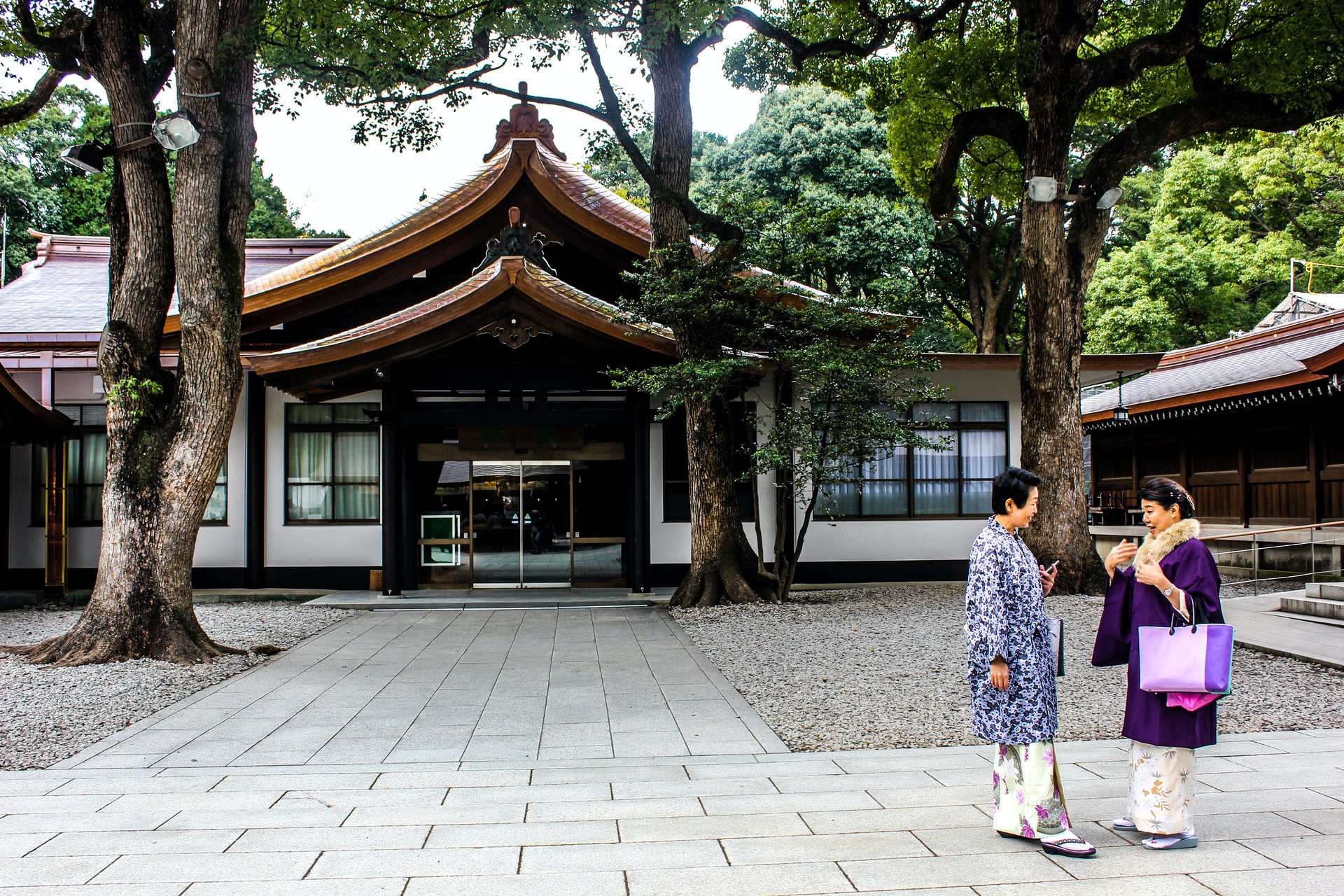
Now that you have settled into Japan a little bit, you’ll probably enjoy going for a walk to see the sights. As you interact with other people, the phrases you’re most likely to hear them say are:
#36 Ohayou/konnichiwa/konbanwa
These are the “daily” greetings that mean “hello.” Ohayou (good morning) is typically used until about 11:30 or noon, then people switch to konnichiwa (good afternoon). At about 5pm, most people will switch to konbanwa (good evening).
#37 Itterasshai/Okaeri
When you leave and return for the day, you may be greeted with unique phrases. Itterasshai means “have a safe trip” or simply “goodbye for the day,” said as you leave. Your hotel staff may say this to you. They may also greet you with okaeri (welcome back) when you return.
#38 Irasshaimase
Whenever you enter a business, you’ll likely be greeted with irasshaimase , a very formal welcome. You are not expected to say anything in response; it’s sort of like the staff saying hello while also thanking you for shopping or visiting.
Buying Coffee
If you can’t go a day without your morning brew, take heart—Japanese coffee shops are everywhere, and the vocabulary is actually almost identical to what you may be used to ordering.
#39 Coffee shop ( kissaten 喫茶店) #40 Hot coffee ( hotto kohi ホットコーヒー) #41 Iced coffee ( aisu kohi アイスコーヒー) #42 Cafe latte ( kafe rate カフェラテ) #43 Drip coffee ( dorippu kohi ドリップコーヒー) #44 Soy milk ( soi miruku ソイミルク)) #45 Espresso ( Esupuresso エスプレッソ)
When it comes time to order your drink, you can specify what you want via the following format:
#46 I’d like to order [number] of [item]. ([item] wo [number] onegaishimasu .[item] を [number]お願いします。)
The [item] can be kohi, mizu (water), or any other item you would like to order. If you don’t know how to say what you want to order, you can point to a menu and simply say “kore” (this) in the [item] place. You can fill the [number] slot with the quantity you would like; the words hitotsu, futatsu , and mitsu mean one, two, and three, respectively.
For example:
- I’d like one hot coffee, please. ( Hotto kohi wo hitotsu onegaishimasu. )
After this, the waitress may ask what size you would like. You can typically choose from small (S), medium (M), and large (L).
Use the letter to indicate which size you would like:
#47 Size ( saizu サイズ) #48 Medium M ( saizuM サイズ)
In A Japanese Restaurant
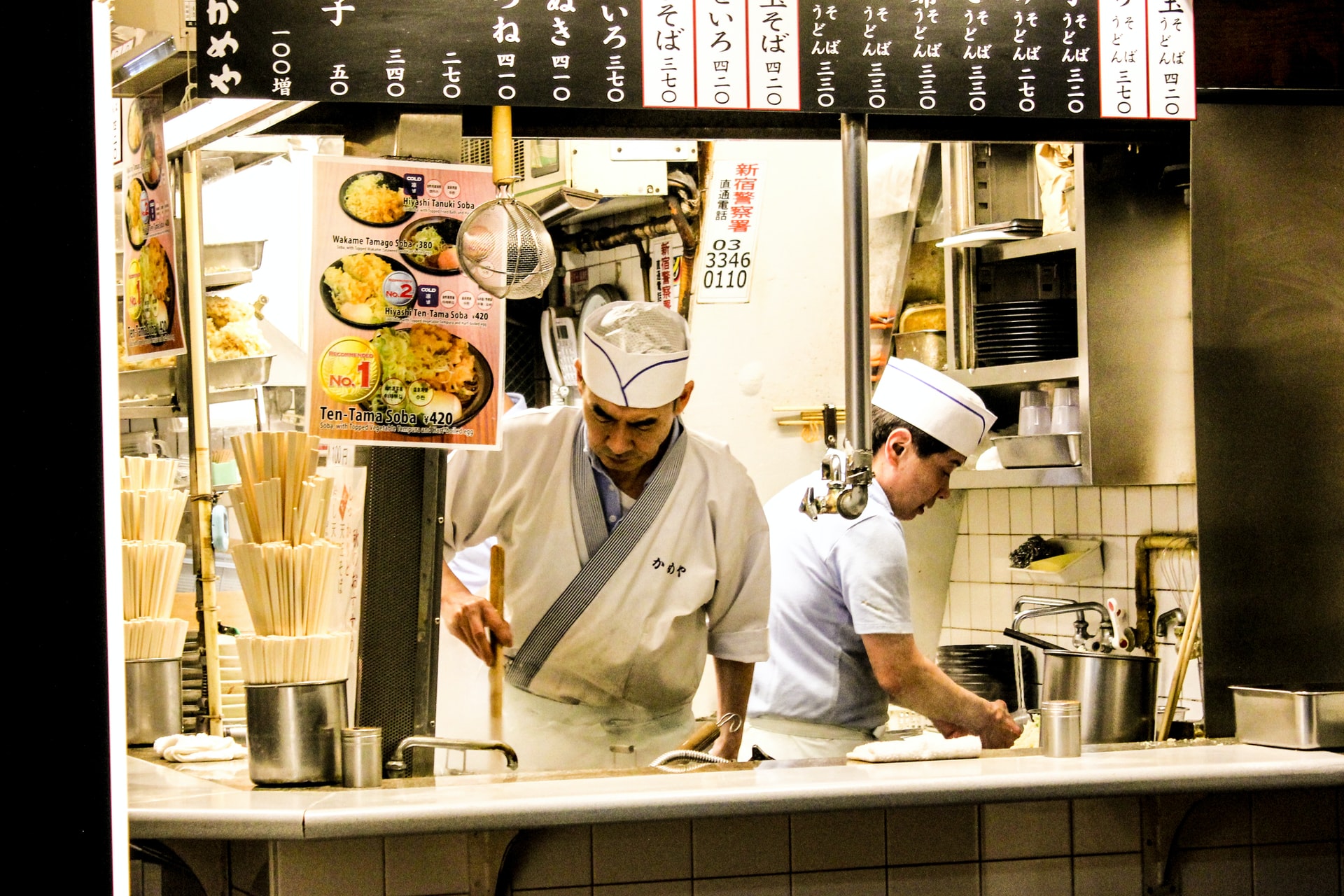
If you’ve decided to stop by a Japanese restaurant instead of a café, you might need a wider variety of words to make sure you can get by.
The good news is that many restaurants—especially in large cities—have pictures on their menus, and no one will be upset if you point and simply say “this, please.”
To start, the vocabulary you’re most likely to need include:
#49 Fish ( sakana 魚) #50 Meat ( niku 肉) #51 Vegetables ( yasai 野菜) #52 Vegetarian ( begitarian ベジタリアン) #53 Beer ( biiru ビール) #54 Water ( mizu 水) #55 Tea ( ocha お茶)
As you enter a restaurant, you will likely be asked how many people are in your party. Using basic Japanese numbers 1-10, you can create the following sentence:
#56 There are [number] people. ([number] mei desu .___名です)
Once you have been seated, you may need to use some of the following phrases:
#57 Do you have an English menu? ( Eigo no menyu arimasu ka? 英語のメニューありますか。) #58 What is this [while pointing]? ( Kore ha nan desu ka? これは何ですか。)
When you have decided what you would like to order, you can simply state:
#59 [item] please. (____ onegaishimasu .__お願いします。)
If you do not know the name of the item and would like to order just by pointing at the menu, you can use:
#60 I’d like to order [number] of [item]. ([item] wo [number] onegaishimasu .[item] を [number]お願いします。)
When your meal is over, your next step is to pay. Important phrases that can get you through this phase of the interaction include:
#61 Could we have the bill, please? ( Okaikei kudasai. お会計ください。) #62 Can I pay with a credit card? ( Kurejitto kaado de daijoubu desu ka? クレジットカードで大丈夫ですか。)
In A Convenience Store
If you don’t feel like stopping by a restaurant, or if you’d just like a quick bite to eat or other item, the thousands of convenience stores (called konbini , short for konbiniensu sutoa , “convenience store”) that appear on nearly every street corner are ready to serve you.
The easiest meals in terms of simplicity will be bento boxes, or small boxes (in the cold section) that serve as a whole meal. If you pick one of those up and stand in line, you will almost always hear the following three phrases (to which you can answer yes or no, which keeps things simple):
#63 Next in line, please! ( Otsugi no kata douzo! お次の方どうぞ。) #64 Do you have a point card [a rewards card for the convenience store]? ( Pointo ka-do ha omochi desu ka? ポイントカードはお持ちですか。) #65 Would you like your bento warmed up? ( Obento atatamemasu ka? お弁当温めますか。)
Getting Directions And Getting Lost
Almost inevitably, you’ll find yourself turned around once you start exploring. That’s not such a bad thing! Japan is full of small, tucked away secrets, and the people are eager to help you get back to a familiar place much more often than not.
If you need to ask directions, the phrases that will serve you best are:
#66 Where is [place]?( ____ ha doko desu ka? __ はどこですか。) #67 Can I ask you for directions? ( Michi wo kiite mo ii desu ka? 道を聞いてもいいですか。) #68 Can you help me? ( Tasukete kudasaimasen ka? 助けてくださいませんか。)
In response, Japanese people are likely to use the following words:
#69 Next ( totonari となり) #70 In front of ( mae 前) #71 Behind ( ushiro 後ろ) #72 Nearby ( chikaku 近く) #73 North ( kita 北) #74 South ( minami 南) #75 East ( higashi 東) #76 West ( nishi 西) #77 Right ( migi 右) #78 Left ( hidari 左) #79 Street/road/path ( michi 道) #80 Bridge ( hashi 橋) #81 Corner ( kado 角)
Thanks to the consistent presence of trains and other forms of public transport, you should feel emboldened to explore as much as you like. There will always be a train station or bus nearby where you can ask directions or head back to a familiar place!
Japanese Travel Phrases
So there you have it – 83 Japanese travel phrases to hit the ground running on your next trip to Japan. From the airport to the convenience store and from the hotel to Japanese restaurants these knowing these Japanese travel phrases will help you feel less like a tourist.
And who knows, maybe getting started with these Japanese travel phrases will be your gateway into learning the language.
By the way, if you'd like to learn some more Japanese phrases before your trip, make sure you check out this post on basic conversational Japanese for your first chat with a native speaker. You might also like this list of Japanese conversation starters.
Language Courses
- Language Blog
- Testimonials
- Meet Our Team
- Media & Press
Download this article as a FREE PDF ?
What is your current level in Swedish?
Perfect! You’ve now got access to my most effective [level] Swedish tips…
Where shall I send the tips and your PDF?
We will protect your data in accordance with our data policy.
What is your current level in Danish?
Perfect! You’ve now got access to my most effective [level] Danish tips…
NOT INTERESTED?
What can we do better? If I could make something to help you right now, w hat would it be?
Which language are you learning?
What is your current level in [language] ?
Perfect! You’ve now got access to my most effective [level] [language] tips, PLUS your free StoryLearning Kit…
Where shall I send them?
Download this article as a FREE PDF?
Great! Where shall I send my best online teaching tips and your PDF?
Download this article as a FREE PDF ?
What is your current level in Arabic?
Perfect! You’ve now got access to my most effective [level] Arabic tips…
FREE StoryLearning Kit!
Join my email newsletter and get FREE access to your StoryLearning Kit — discover how to learn languages through the power of story!
Download a FREE Story in Japanese!
Enter your email address below to get a FREE short story in Japanese and start learning Japanese quickly and naturally with my StoryLearning® method!
What is your current level in Japanese?
Perfect! You’ve now got access to the Japanese StoryLearning® Pack …
Where shall I send your download link?
Download Your FREE Natural Japanese Grammar Pack
Enter your email address below to get free access to my Natural Japanese Grammar Pack and learn to internalise Japanese grammar quickly and naturally through stories.
Perfect! You’ve now got access to the Natural Japanese Grammar Pack …
What is your current level in Portuguese?
Perfect! You’ve now got access to the Natural Portuguese Grammar Pack …
What is your current level in German?
Perfect! You’ve now got access to the Natural German Grammar Pack …
Train as an Online Language Teacher and Earn from Home
The next cohort of my Certificate of Online Language Teaching will open soon. Join the waiting list, and we’ll notify you as soon as enrolment is open!
Perfect! You’ve now got access to my most effective [level] Portuguese tips…
What is your current level in Turkish?
Perfect! You’ve now got access to my most effective [level] Turkish tips…
What is your current level in French?
Perfect! You’ve now got access to the French Vocab Power Pack …
What is your current level in Italian?
Perfect! You’ve now got access to the Italian Vocab Power Pack …
Perfect! You’ve now got access to the German Vocab Power Pack …
Perfect! You’ve now got access to the Japanese Vocab Power Pack …
Download Your FREE Japanese Vocab Power Pack
Enter your email address below to get free access to my Japanese Vocab Power Pack and learn essential Japanese words and phrases quickly and naturally. (ALL levels!)
Download Your FREE German Vocab Power Pack

Enter your email address below to get free access to my German Vocab Power Pack and learn essential German words and phrases quickly and naturally. (ALL levels!)
Download Your FREE Italian Vocab Power Pack
Enter your email address below to get free access to my Italian Vocab Power Pack and learn essential Italian words and phrases quickly and naturally. (ALL levels!)
Download Your FREE French Vocab Power Pack
Enter your email address below to get free access to my French Vocab Power Pack and learn essential French words and phrases quickly and naturally. (ALL levels!)
Perfect! You’ve now got access to the Portuguese StoryLearning® Pack …
What is your current level in Russian?
Perfect! You’ve now got access to the Natural Russian Grammar Pack …
Perfect! You’ve now got access to the Russian StoryLearning® Pack …
Perfect! You’ve now got access to the Italian StoryLearning® Pack …
Perfect! You’ve now got access to the Natural Italian Grammar Pack …
Perfect! You’ve now got access to the French StoryLearning® Pack …
Perfect! You’ve now got access to the Natural French Grammar Pack …
What is your current level in Spanish?
Perfect! You’ve now got access to the Spanish Vocab Power Pack …
Perfect! You’ve now got access to the Natural Spanish Grammar Pack …
Perfect! You’ve now got access to the Spanish StoryLearning® Pack …
Where shall I send them?
What is your current level in Korean?
Perfect! You’ve now got access to my most effective [level] Korean tips…
Perfect! You’ve now got access to my most effective [level] Russian tips…
Perfect! You’ve now got access to my most effective [level] Japanese tips…
What is your current level in Chinese?
Perfect! You’ve now got access to my most effective [level] Chinese tips…
Perfect! You’ve now got access to my most effective [level] Spanish tips…
Perfect! You’ve now got access to my most effective [level] Italian tips…
Perfect! You’ve now got access to my most effective [level] French tips…
Perfect! You’ve now got access to my most effective [level] German tips…
Download Your FREE Natural Portuguese Grammar Pack
Enter your email address below to get free access to my Natural Portuguese Grammar Pack and learn to internalise Portuguese grammar quickly and naturally through stories.
Download Your FREE Natural Russian Grammar Pack
Enter your email address below to get free access to my Natural Russian Grammar Pack and learn to internalise Russian grammar quickly and naturally through stories.
Download Your FREE Natural German Grammar Pack
Enter your email address below to get free access to my Natural German Grammar Pack and learn to internalise German grammar quickly and naturally through stories.
Download Your FREE Natural French Grammar Pack
Enter your email address below to get free access to my Natural French Grammar Pack and learn to internalise French grammar quickly and naturally through stories.
Download Your FREE Natural Italian Grammar Pack
Enter your email address below to get free access to my Natural Italian Grammar Pack and learn to internalise Italian grammar quickly and naturally through stories.
Download a FREE Story in Portuguese!

Enter your email address below to get a FREE short story in Brazilian Portuguese and start learning Portuguese quickly and naturally with my StoryLearning® method!
Download a FREE Story in Russian!
Enter your email address below to get a FREE short story in Russian and start learning Russian quickly and naturally with my StoryLearning® method!
Download a FREE Story in German!
Enter your email address below to get a FREE short story in German and start learning German quickly and naturally with my StoryLearning® method!
Perfect! You’ve now got access to the German StoryLearning® Pack …
Download a FREE Story in Italian!
Enter your email address below to get a FREE short story in Italian and start learning Italian quickly and naturally with my StoryLearning® method!
Download a FREE Story in French!

Enter your email address below to get a FREE short story in French and start learning French quickly and naturally with my StoryLearning® method!
Download a FREE Story in Spanish!
Enter your email address below to get a FREE short story in Spanish and start learning Spanish quickly and naturally with my StoryLearning® method!
FREE Download:
The rules of language learning.

Enter your email address below to get free access to my Rules of Language Learning and discover 25 “rules” to learn a new language quickly and naturally through stories.
What can we do better ? If I could make something to help you right now, w hat would it be?
What is your current level in [language]?
Perfect! You’ve now got access to my most effective [level] [language] tips…
Download Your FREE Spanish Vocab Power Pack

Enter your email address below to get free access to my Spanish Vocab Power Pack and learn essential Spanish words and phrases quickly and naturally. (ALL levels!)
Download Your FREE Natural Spanish Grammar Pack
Enter your email address below to get free access to my Natural Spanish Grammar Pack and learn to internalise Spanish grammar quickly and naturally through stories.
Free Step-By-Step Guide:
How to generate a full-time income from home with your English… even with ZERO previous teaching experience.
What is your current level in Thai?
Perfect! You’ve now got access to my most effective [level] Thai tips…
What is your current level in Cantonese?
Perfect! You’ve now got access to my most effective [level] Cantonese tips…
Steal My Method?
I’ve written some simple emails explaining the techniques I’ve used to learn 8 languages…
I want to be skipped!
I’m the lead capture, man!
Join 84,574 other language learners getting StoryLearning tips by email…
“After I started to use your ideas, I learn better, for longer, with more passion. Thanks for the life-change!” – Dallas Nesbit
Perfect! You’ve now got access to my most effective [level] [language] tips…
Perfect! You’ve now got access to my most effective [level] [language] tips…
Join 122,238 other language learners getting StoryLearning tips by email…
Find the perfect language course for you.
Looking for world-class training material to help you make a breakthrough in your language learning?
Click ‘start now’ and complete this short survey to find the perfect course for you!
Do you like the idea of learning through story?
Do you want…?
The journey is the reward
42 Basic Japanese Phrases to Survive in Japan [With Audio]

Japan’s beauty is unique in Asia and attracts millions of people worldwide. Who hasn’t thought to themselves at least once,
I would love to get lost here.
If you plan to travel to Japan someday, learning some basic Japanese phrases will not onl y help you to survive in Japan, but also increase your chance of communicating with native Japanese that adds amazing flavor to your journey.
In this post, we’ll present you with 42 basic Japanese phrases that can navigate you through your stay in Japan. From introducing yourself, navigating public transportation and asking for directions, shopping, eating out, and coping with an emergency, this article will cover almost all the basic Japanese phrases for tourists .
Read on to prepare for your next trip to Japan!
Table of Contents
Japanese Phrases for Meeting and Greeting
We all know that Japanese people speak and act politely. Here are some greeting phrases that will make your life in Japan a lot smoother.
First, if you want to talk to someone, you’d better start with a greeting. If you meet somebody in the morning, you can start the conversation by saying:
Note that Japanese people use “すみません” frequently to apologize for things like stepping someone in the bus, or stopping someone to ask for direction. So this could be one of the most useful Japanese phrases you want to memorize.
Japanese Phrases for Navigating Public Transportation and Getting Around
When Using Public Transportation, y ou may have heard that Japanese cities like Tokyo have one of the most complex railway systems in the world. But don’t worry, here are several phrases to help you survive in those underground labyrinth ( Navitime can help to navigate you through Japan’s confusing metro system). First, you need to find the bus stop (バス停, basutei) or the railway station (駅, eki).
You may want to try the Japan Rail Pass to save some money as well as effort to buy tickets every time. Also, a useful app called HyperDia can help you decide which train to take and warn you when a journey isn’t covered by the Japan Rail Pass .

Now try yourself!
To find digital maps or travel brochures, you can consult JNTO-Travel Brochures . For all the help you received, you can express your gratitude with the simple phrase:
Japanese Phrases for Shopping
While traveling in Japan, you may find there are so many things you want to purchase and take home. Then what phrases are used when shopping for souvenirs?
Don’t forget to get your tax refund if you are an international tourist staying in Japan for less than 6 months.

Japanese Phrases for Eating Out
After walking and shopping, you may find yourself hungry and want some authentic Japanese cuisine. With these basic Japanese phrases, you can walk into any restaurant you want with confidence.
If you want to ask for an English menu, you may say: 英語のメニュー、お願いします。(eigo no menyu, onegaishimasu.) When you find something you are interested in, you can just point to the menu and tell the waiter:
If you want to order the food by its name, you could use the sentence structure “ください (kudasai)”. For example, if it is the tea that you want, you can say:

If you happen to be dining with a Japanese person, say this before you start:
Japanese people say “ いただきます ” before eating (not towards anyone, but to the food), and “ごちそうさまでした” after finishing it. You can say “ごちそうさまでした” to the owner of the restaurant, and he or she will be very much glad. When you are satisfied with the food, you can say this Japanese phrase to compliment the food:
After finishing the delicious meal, you may want to express your gratitude by saying:
As one can imagine, the amount of help you might receive doesn’t only depend on the welcoming nature of your host but also on how respectful you are.
💡Tips: Japanese dining etiquette 101
- Don’t point at someone or something with your chopsticks.
- Use the chopsticks to grab your food, not as a fork.
- Do not leave your chopsticks planted up in your rice.
- Don’t pass on food to other people around you from chopsticks to chopsticks.
To better plan your trip and find local cuisine, you can consult: Japan Travel ; Japan-Guide and Gurunavi. Before going to Japan, you might want to know more about Japanese Manners Do’s and Don’ts . Know their manners so that you can use these Japanese phrases wisely.
Japanese Phrases for Emergency
I do hope you will not run into any unpleasant situations in Japan. However, as the saying goes, “Better safe than sorry”, I hope you can remember the following phrases to prepare for any emergency cases that might occur. First, the situation will be a lot better if you can find anyone who is able to speak English, so you can try to find one by asking:
If it is getting dangerous, just shout out:
If you get lost, try to explain your situation to people around you. Remember you can get help from the embassy and do note down the phone number and address of the embassy of your country. If you cannot use your phone, try to ask others for help:
Except for the last section, I do hope all the basic Japanese phrases you learned in this post will come in handy during your stay in Japan. As a bonus, I will introduce several cute Japanese phrases that can be used to express your emotion when talking to native speakers!
Japanese Phrases to Express Emotion
You may have already known the phrase, Japanese people do use “かわいい” a lot. It seems that “かわいい” can be used to show their likeness for almost anything, from clothes, stationery, to buildings and shops.
Another phrase that you are most likely to hear in Japan is “すごい ”. Try to use “ すごい” to compliment others and you may make some native friends.
If you are interested in learning more Japanese phrases, check out LingoDeer’s travel phrasebook and learn 1000+ common Japanese travel phrases for free . You may also encounter some anime expressions;)
If you already fall in love with Japanese, go on and read our blog articles How long does it take to learn Japanese, or this essential guide to Learn Japanese From Beginner to Advanced. Hope you can find something useful there, too!
See, learning Japanese is not as hard as you think! If you wish to find more Japanese learning resources, check out this article about the best Japanese learning apps and hopefully you’ll find one suits you!
Wish to learn more Japanese phrases but don’t know where to start? Let me help!
I’m LingoDeer . I’m here to make your Japanese learning journey smart and fun!
Try LingoDeer for FREE
Published by Cindy Fan
Hi, I am Cindy Fan. I majored in Japanese for four years in undergraduate school and spent 7 months in Tokyo as an exchange student. There, I fell in love with Japanese culture. Currently, I am studying for an LLM degree at BFSU. View all posts by Cindy Fan
Leave a comment Cancel reply

[…] Related post: Essential list of Japanese travel phrases. […]
[…] time now to be finalizing your plans, making a list of things to see and do, booking tickets, and learning the phrases you need to get you […]
[…] will find you are one step closer to understanding Japanese culture. You may also want to know some basic Japanese phrases to show your […]
Discover more from LingoDeer
Subscribe now to keep reading and get access to the full archive.
Type your email…
Continue reading

Japanese Travel Phrases for an Enjoyable Trip to Japan

Are you traveling to Japan and want to learn practical Japanese travel phrases? This article is designed to help you learn the most useful Japanese words for travel.
It’s always good to learn basic words when you travel to a foreign country. Not only does it make getting around easier, but it also allows you to enjoy communicating with the locals.
In general, Japanese people are not so good at speaking English , free wifi services aren’t very prevalent (especially outside of the central cities), and Japan is still more of a cash-based society than you may think. However, Japanese people are very kind; they’ll listen to you patiently and do their best to help. So just use these basic Japanese travel phrases to talk to Japanese people when you want to ask something.
When you speak even a little bit of Japanese, locals will appreciate your effort and will be more friendly. Here’s JapanesePod101’s list of practical Japanese travel phrases for your travels to Japan!
Table of Contents
- Greeting/Communication
- Asking for Directions
- Restaurants
- When You Need Help
- Conclusion: How JapanesePod101 Can Help You Learn More Japanese

1. Greeting/Communication

To begin our list of essential Japanese travel phrases, we’ll go over greetings and basic travel phrases in Japanese for solid communication. These simple Japanese travel phrases can make a world of difference in your conversations and overall experience in Japan.
- Romanization: Kon’nichiwa
- English Translation: Hello
In terms of must-know Japanese travel phrases, you probably already know that this is the most common Japanese greeting word . You can say this to anybody for any occasion during the daytime.
- Romanization: Hai / Iie
- English Translation: Yes / No
Hai is “Yes” and it’s pronounced like the English word “Hi.” In Japan, saying yes also means that you understand. Iie is “No” and it’s pronounced ‘EE-eh.’
3- ありがとうございます
- Romanization: Arigatō gozaimasu
- English Translation: Thank you
Arigatō gozaimasu is the polite way to say “Thank you” in Japanese, and you can use this for any occasion. In case of a casual situation, you can just say Arigatō , or even more casually, Dōmo (どうも) which means “Thanks.”
4- いいえ、いりません
- Romanization: Iie, irimasen
- English Translation: No, thank you.
It literally means “No, I don’t need it,” in Japanese. At a restaurant, say this phrase when a waiter offers to fill your glass of water and you don’t want more.
- Romanization: Sumimasen
- English Translation: I’m sorry / Excuse me
This word is usually used to say “sorry” or “excuse me” . Say this when you bump into someone in a crowd or when you ask someone for directions. Japanese people also use this to mean “thank you,” in some cases, such as when someone picks up something you dropped.
- Romanization: Onegai shimasu
- English Translation: Please
When you request something, it’s polite to say Onegai shimasu . When someone offers you something and says please, she/he would say Dōzo (どうぞ) in Japanese.
- Romanization: Watashi wa XX desu.
- English Translation: I am XX.
Watashi is “I,” wa is “am/is/are,” and desu is a present-tense word that links subjects and predicates; it’s placed at the end of a sentence. You can put your name, or your nationality, such as: Watashi wa Amerika-jin desu (私はアメリカ人です) which means “I am American.”
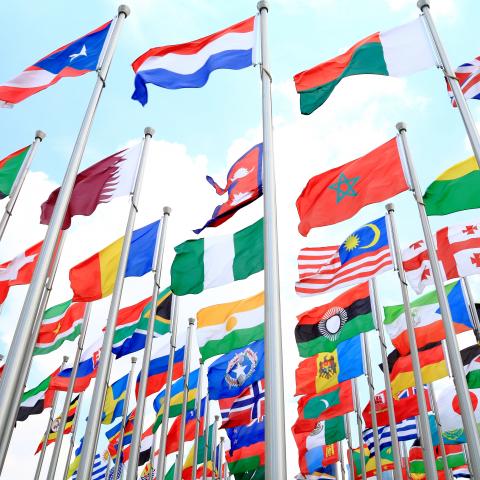
8- 私は日本語がわかりません
- Romanization: Watashi wa nihongo ga wakarimasen.
- English Translation: I don’t understand Japanese.
Nihongo is stands for the Japanese language, and Wakarimasen means “I don’t understand.” If you don’t know something, you can just say Wakarimasen meaning “I don’t know.”
9- 英語を話せますか
- Romanization: Eigo o hanasemasu ka
- English Translation: Can you speak English?
This is one of the most useful Japanese phrases for travelers. Eigo means “English,” Hanasemasu is a polite way to say “I speak,” and ka is a word that you add to the end of a complete sentence to make a question.
10- 英語でお願いします
- Romanization: Eigo de onegai shimasu
- English Translation: English, please.
This is another important Japanese travel phrase. De is the particle, and in this case it means “by” or “by means of.” The phrase literally translates as “English by please.” You can also say M saizu de onegai shimasu (Mサイズでお願いします) which means “Medium size, please.”
2. Asking for Directions

One of the most important Japanese travel phrases you should know are directions . Here are some useful vocabulary words and two Japanese language travel phrases you need to know!
1- Vocabulary
- 駅 ( Eki ) : Station
- 地下鉄 ( Chikatetsu ) : Subway/Metro
- トイレ ( Toire ) : Toilet
- 銀行 ( Ginkō ) : Bank
- 切符売り場 ( Kippu uriba ) : Ticket machine/Office
- 観光案内所 ( Kankō annaijo ) : Tourist information office
- 入口 ( Iriguchi ) : Entrance
- 出口 ( Deguchi ) : Exit
- 右 ( Migi ) : Right
- 左 ( Hidari ) : Left
- まっすぐ ( Massugu ) : Straight
- 曲がる ( Magaru ) : Turn
- 交差点 ( Kōsaten ) : Intersection
- 角 ( Kado ) : Corner
2- XXはどこですか
- Romanization: XX wa doko desu ka
- English Translation: Where is XX?
Doko means “where” and you replace XX with the name of where you want to go.
For example
- Toire wa doko desu ka (Where is the toilet?)
- Deguchi wa doko desu ka (Where is an exit?)
3- XX e wa dō ikeba ii desu ka (XXへはどう行けばいいですか) : How can I go to XX?
- Romanization: XX e wa dō ikeba ii desu ka
- English Translation: How can I go to XX?
Dō is “how,” e is “to,” and ikeba ii can be translated as “good to go.” When you want to know how you can get somewhere, replace XX with where you want to go.
For example:
- Eki e wa dō ikeba ii desu ka (How can I go to the station?)
- Ginkō e wa dō ikeba ii desu ka (How can I go to the bank?)
4- Other Examples
1. この道をまっすぐ行きます ( Kono michi o massugu ikimasu. ):Go straight on this street.
Kono michi is “this street” and ikimasu is the polite way to say “Go.” O is a Japanese postpositional particle which indicates an object (in this case, kono michi ).
2. 次の角を右へ曲がります ( Tsugi no kado o migi e magarimasu. ):Turn right at the next corner.
Tsugi no kado means “next corner” and magarimasu is the polite way to say “Turn.” E is another postpositional particle that indicates direction; this can be translated as the English word “to.”
3. 交差点を渡って左へ行きます ( Kōsaten o watatte hidari e ikimasu. ):Cross an intersection and go to the left (direction).
Watatte is a conjugated form of wataru which means “cross.”
3. Shopping
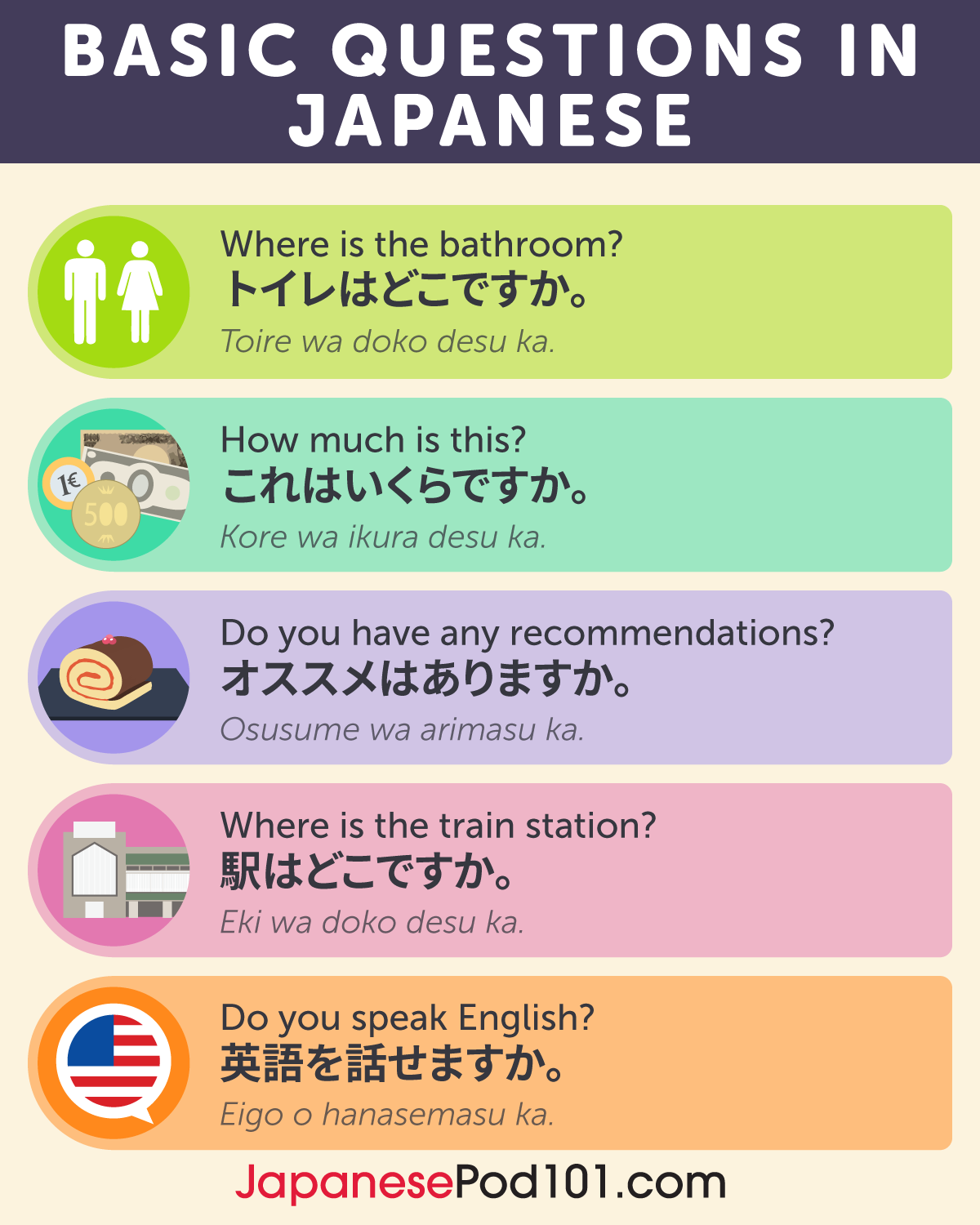
You’ll definitely love shopping when traveling in Japan, and some of the best Japanese phrases for travel are those related to this fun past-time. Knowing some useful Japanese words will make your shopping even more enjoyable.
1- XXはありますか
- Romanization: XX wa arimasu ka
- English Translation: Do you have XX?
When you’re at a store and looking for something, you can use this phrase by replacing XX with what you want.
- Romanization: Ikura desu ka
- English Translation: How much is it?
This is probably one of the most useful Japanese words for traveling and shopping. You can say Ikura desu ka in many situations, such as when you’re shopping, buying tickets, paying for a taxi, etc.
- Romanization: Menzei dekimasu ka
- English Translation: Can you do a tax exemption?
Did you know that, as a traveler, you can get a sales tax exemption when you purchase things greater than 5,000 yen? Menzei is “tax exempted” and dekimasu means “can do.” Don’t forget to say this when you buy something big!
- Romanization: Kore wa nan desu ka
- English Translation: What is this?
Kore is “this” and nan is another form of nani which means “what.” There are many unique foods, gadgets, and things which are unique to Japan, so when you wonder what it is, point to it and say this phrase.
- Romanization: Kore o kaimasu
- English Translation: I’ll buy this.
Kaimasu is the conjugation of the verb kau , which means “buy.”
6- カードは使えますか
- Romanization: Kādo wa tsukaemasu ka
- English Translation: Can I use a credit card?
Kādo is “card” and you pronounce it just like the English word “card.” Tsukaemasu is a conjugation of the potential form of the verb tsukau which means “use.” This phrase is useful when you want to use your card at small shops and restaurants.

4. Restaurants
Japan has an array of delicious foods, of which sushi and ramen are just the tip of the iceberg. Amazingly, Tokyo is the city with the most Michelin-starred restaurants in the world, for several consecutive years. Enjoy yummy food at restaurants with useful Japanese words for restaurants and easy Japanese travel phrases related to food.
- 英語のメニュー ( Eigo no menyū ) : English menu
- ベジタリアンのメニュー ( Bejitarian no menyū ) : Vegetarian menu
- 豚肉を含まないメニュー ( Butaniku o fukumanai menyū ) : Menu without pork
- 水 ( Mizu ) : Water
- 白/赤ワイン ( Shiro / Aka wain ) : White / Red wine
2- XXはありますか
When you want to ask if the restaurant has something you want, say this phrase (replacing XX with what you want).
- Eigo no menyū wa arimasu ka (Do you have an English menu?)
- Aka wain wa arimasu ka (Do you have red wine?)
- Romanization: XX o kudasai
- English Translation: Can I have XX?
This is another very useful phrase. Simply replace XX with what you want. You can also use this versatile phrase in various occasions, such as when shopping, choosing something, etc.
- Kore o kudasai (Can I have this?)
- Mizu o kudasai (Can I have water?)
4- お会計お願いします
- Romanization: O-kaikei onegai shimasu
- English Translation: Check, please.
O-kaikei means “check.” In Japan, people often cross their index fingers in front of their face as a gesture to indicate “check, please” at casual restaurants. However, when you’re at a nice restaurant, simply tell a waiter: O-kaikei onegai shimasu .
5. When You Need Help

Sometimes you get faced with unexpected emergencies while you’re traveling. Japan is famous for being one of the safest countries in the world, but you might fall very ill or be caught in a great earthquake.
1- Vocabularies
- 警察 ( Keisatsu ) : Police
- 病院 ( Byōin ) : Hospital
- 救急車 ( Kyūkyūsha ) : Ambulance
- ドラッグストア/薬局 ( Doraggu sutoa / Yakkyoku ) : Drug Store/Pharmacy
- タクシー ( Takushī ) : Taxi
2- XXを呼んでください
- Romanization: XX o yonde kudasai
- English Translation: Can you call XX?
When you’re severely ill or in case of emergency, let people know by using this phrase. Japanese people will kindly help you.
- Yūkyūsha o yonde kudasai (Can you call an ambulance?)
- Keisatsu o yonde kudasai (Can you call the police?)
3- どこでインターネットを使えますか
- Romanization: Doko de intānetto o tsukaemasu ka
- English Translation: Where can I use the internet?
Although large cities in Japan provide free public wifi at major stations, metros, and cafes, you may need to find internet access in smaller cities. Remember that there will be kind Japanese people who will share their personal hotspots, or look things up for you with their own phones, as well.
4- 電話を貸してください
- Romanization: Denwa o kashite kudasai
- English Translation: Can I use your phone?
Denwa is “phone” and kashite is a conjugation word of kasu , which means “lend.” This phrase is literally translated as “Please lend (me) a phone.”
- Romanization: Tasukete kudasai
- English Translation: Please help me.
I believe this phrase is the last thing you would ever use in Japan, but in case something does happen, this is useful survival Japanese for tourists.


6. Conclusion: How JapanesePod101 Can Help You Learn More Japanese
I hope this article of Japanese travel phrases is helpful and that you’ll enjoy your trip to Japan!
If you would like to learn more about the Japanese language, you’ll find more useful content on JapanesePod101.com . We provide a variety of free lessons for you to improve your Japanese language skills.
We also have YouTube channel: JapanesePod101 . It’s fun to learn Japanese through watching videos and listening to actual Japanese pronunciation, so we recommend you check it out!
Don’t forget to study with our free Japanese vocabulary lists , read more insightful blog posts like this one, and download our mobile apps to learn anywhere, anytime! Whatever your reason for learning Japanese , know that we’re here to help and you can do it ! Keep in mind that the best way to learn Japanese phrases for travel is repetition and practice.
Before you go, let us know in the comments how you feel about using these useful travel phrases in Japanese after reading this article. More confident, or still a little confused about something? Feel free to ask questions in the comments!
Or sign up using Facebook
Got an account? Sign in here

How To Say ‘Thank you’ in Japanese

How to Say Hello in Japanese: Practical Japanese Greetings

How to Say I Love You in Japanese – Romantic Word List

All About the Japanese National Anthem : Kimigayo 君が代

100+ Useful Japanese Classroom Phrases & Vocabulary

50+ Restaurants Phrases for Eating Out in Japan
How to celebrate april fools’ day in japanese.
- Forum Spotlight
- Everyday Kanji
- Explore Japan
- Scheduled Maintenance
- Benkyō Blog
- Max in Shanghai
- Nathan's Notebook
- Samurai Theologian
- Japanese Holidays
- Japanese Dictionary
- Japanese Food
- Japanese Language
- Japanese slang
- Japanese Translation
- Kanji Mnemonics
- Kanji Scrabble
- Kanji Curiosity
- Advanced Japanese
- Japanese Alphabet
- Japanese Grammar
- Japanese Lessons
- Japanese Online
- Japanese Phrases
- Japanese Podcasts
- Japanese Words
- Tips & Techniques
- Learn Japanese
- Getting Started Living in Japan
- Media Coverage
- Motoko's Blog
- Feature Spotlight
- Speak Japanese
- Success Stories
- Teaching Japanese
- Team JapanesePod101
- Travel Japan
- Uncategorized
- Word of the Day
- Immigration, Visas
- Tokyo Intern
Copyright © 2024 Innovative Language Learning. All rights reserved. JapanesePod101.com Privacy Policy | Terms of Use . This site is protected by reCAPTCHA and the Google Privacy Policy and Terms of Service apply.
日本 旅遊會話一指搞定(Point and Learn Japan Travel Conversation) 4+
Designed for iphone.
- 2.0 • 4 Ratings
iPhone Screenshots
Description.
到日本旅行時 如果能跟當地人們來幾句會話的話 一定會成為更開心美好的回憶。 「日本 旅遊會話一指搞定」是不論任何人都能輕鬆上手的旅遊會話應用程式。 特長 ■ 在旅途中能簡單使用! 啟動非常快 在旅途中可隨時迅速對應。 ■ 能輕巧迅速動作! 以簡單易懂為最優先設計考量 實現了輕巧順暢的使用感。 ■ 在旅途中好用的會話表現 能簡單地表達自己的意思 收錄了各種旅途中實用的會話表現。 ■ 搖一下就可播放語音! 搖一下就能播放語音。 ■ 圖解單字表(附語音) 將旅途中常用單字以圖解方式整理。 輕輕觸碰單字就可播放語音。 Description: Tongue-tied tourists? Get "Point and Learn Japan Travel Conversation" for your trip. It's an travel phrase application for Taiwanese Mandarin. Features: Easy-to-use on your trip: You can find expressions and words whenever you need. Just touch the icon. It's ready for use in a minute. Perform comfortably: You can flick and shake. See light and smooth move. It's user-friendly interface. Useful travel-related phrase: You can find exact expressions. Zooms each phrase and point the screen to show it. It supports landscape mode. Shake to play voice files: You can "speak" in Japanese by shaking or tapping the screen. *You can shake to play only phrase files. Picture wordbook (with voice): You can listen to the pronunciation of the word. Tap the word to play it. Enjoy scrolling and playing at the same time.
Version 1.1.0
This app has been updated by Apple to display the Apple Watch app icon. ・對應ios8 ・追加Push通知功能 追加新訊息於「資訊」時,會以Push功能通知 ・Now optimized for iOS8. ・Push notifications have been added. Push notifications will alert you when new information is released on "Info" section.
Ratings and Reviews
Turning off the silent mode.
The App does not work if the silent mode is on. I would like to suggest this is a design issue
Useful phrases, but no sounds
Point and learn Japan travel conversation
Very straight-forward and easy to use. I think it covers a good numbers of commonly used phrases. Very good free app to have!
App Privacy
The developer, Brain , has not provided details about its privacy practices and handling of data to Apple.
No Details Provided
The developer will be required to provide privacy details when they submit their next app update.
Information
Traditional Chinese
- App Support
More By This Developer
You might also like.
Funliday - Travel Planner
Japan Coupon-Dutyfree Shopping
Travel Contents
Japan Transit Planner
KKday - Your Travel Companion
Join the journey: Click here to get our top tips for affordable travel!

Japanese Phrases for Travelers (A Cheat Sheet)
When traveling through Japan, it is VERY helpful to have some Japanese phrases under your belt. On my visit there, I found that many people I encountered did not speak English, so I’m so glad that I took some time to a (little) bit of Japanese before my visit.
Keep reading for a list of the top Japanese phrases for travelers, as well as some general information on the language and tips on how to start learning on your own! Your trip to Kyoto , Tokyo , and beyond will be better because of it.
Table of Contents
The Top Resources for Learning Japanese
- iTalki : Practice with Live Teachers at a low cost
- LingoPie : Learn the language by watching videos in Japanese
- Writing Practice Book : Learn how to write in Japanese script
START LEARNING TODAY!
Japanese Language Overview
Language history.
The exact origins of Japanese are disputed by top linguists, as there is evidence that it could have originated from either the Polynesian, Chinese, or the Ural-Altaic languages. For a time, many scholars agreed that Japanese is part of the Ural-Altaic language family, which also includes Turkish, Korean, Manchu, and Mongolian. Japanese has been compared with Korean due to similarities in structure, use, and grammar, but the relation is still debated. Today, it the only major language whose origin is still unknown.
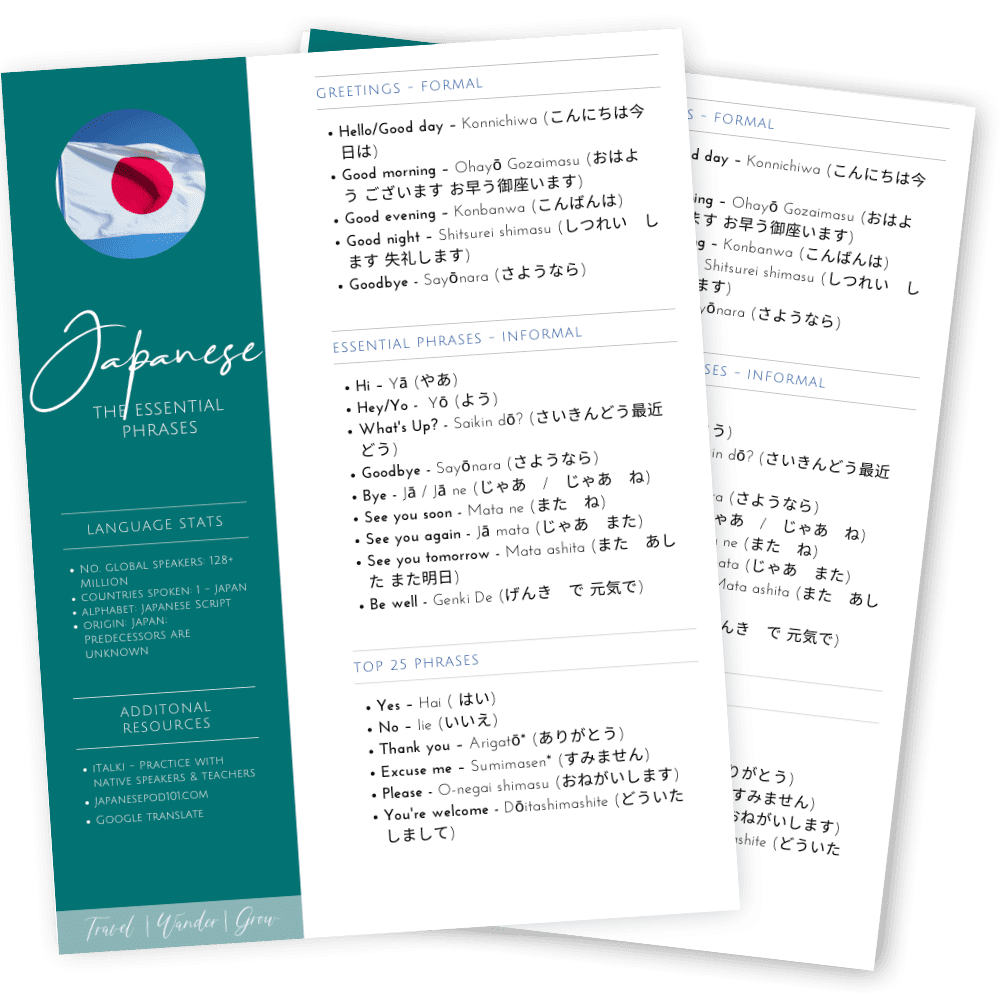
Get your free download!
Japanese phrases pdf.
This free download includes all the key Japanese phrases that you will need for your travels to Japan. In addition, get details on the best resources to improve your speaking and listening skills as well.
Japanese language history can be split into five main periods:
- Old Japanese (Prior to 8th Century)
- Late Old Japanese (9th – 11th Century)
- Middle Japanese (12th – 16th Century)
- Early Modern Japanese (17th-18th Century)
- Modern Japanese (19th Century – now)
Japanese has been a recognized language for the past 1200 years, from around the 8th century AD, where the earliest Japanese writings have been found. Some earlier evidence of the Japanese language has appeared in Chinese writings from as early as the 3rd century AD, but it is not known how long the language has existed on the island.
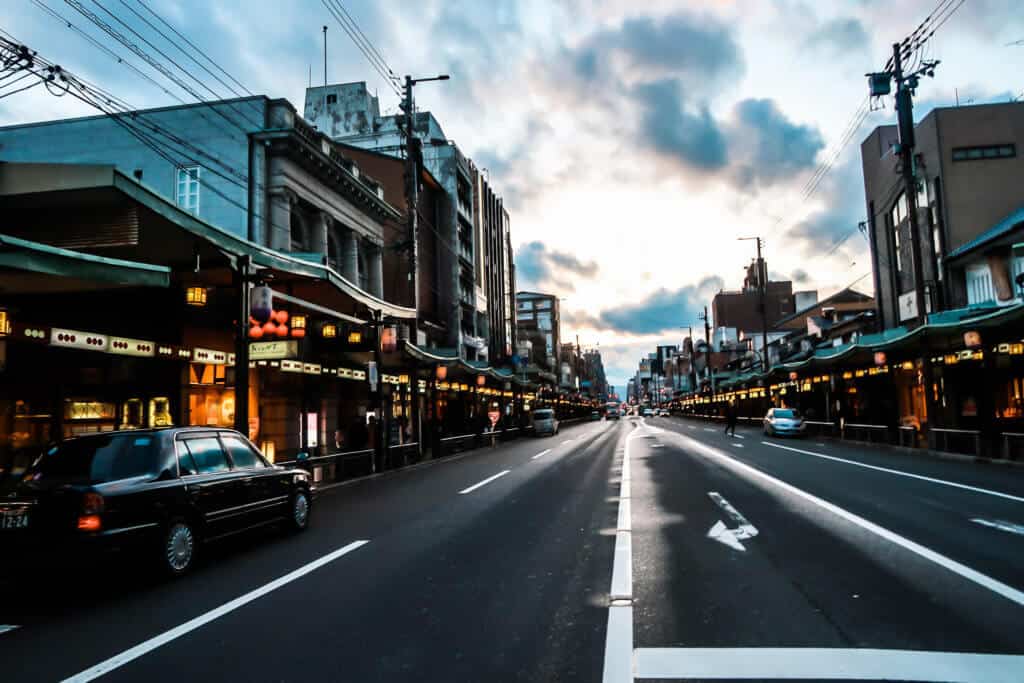
The Language Today
Today, Japanese is spoken by over 125 million people, most of whom reside in Japan. It is not the official language of Japan, but is the de facto national language of Japan. The standard form of the language is called hyojungo “standard Japanese or kyostugo “common language”. This is the variety of the language that is taught in schools and used in TV and official communications.
There are dozens of dialects spoken throughout Japan, as with many old languages. Some differences are more minor (e.g., changes to pronunciation or words used), while other dialects are so distinct from each other that they are mutually unintelligible. This is most often the case for dialects coming from peripheral regions, mountain villages, or isolated islands in the country.
I will also note, there are other languages spoken in Okinawa, as well as the Ryukyu and Amami Islands, known as the Ryukyuan languages. These languages are part of the Japonic language family, and some are considered endangered languages by UNESCO. Their decline is use is due to a shift in greater use of Standard Japanese and other dialects.
RELATED: Kyoto Travel Guide
Japanese Script
An interesting fact about Japanese that did not know until recently, is that Japanese has no genetic relationship to Chinese. Which was surprising to me because the language does use mostly Chinese characters in its written script. There have been two methods of using Chinese script – the first by using them as characters to represent an object or idea. The second method involves using the script to pronounce Japanese words phonetically – which is not widely done today.
Over time, the Japanese script has been modified from the traditional Chinese characters with the overall simplification of some characters. Additionally, there has been the incorporation of hiragana characters, which are also simplified and have a more rounded appearance.
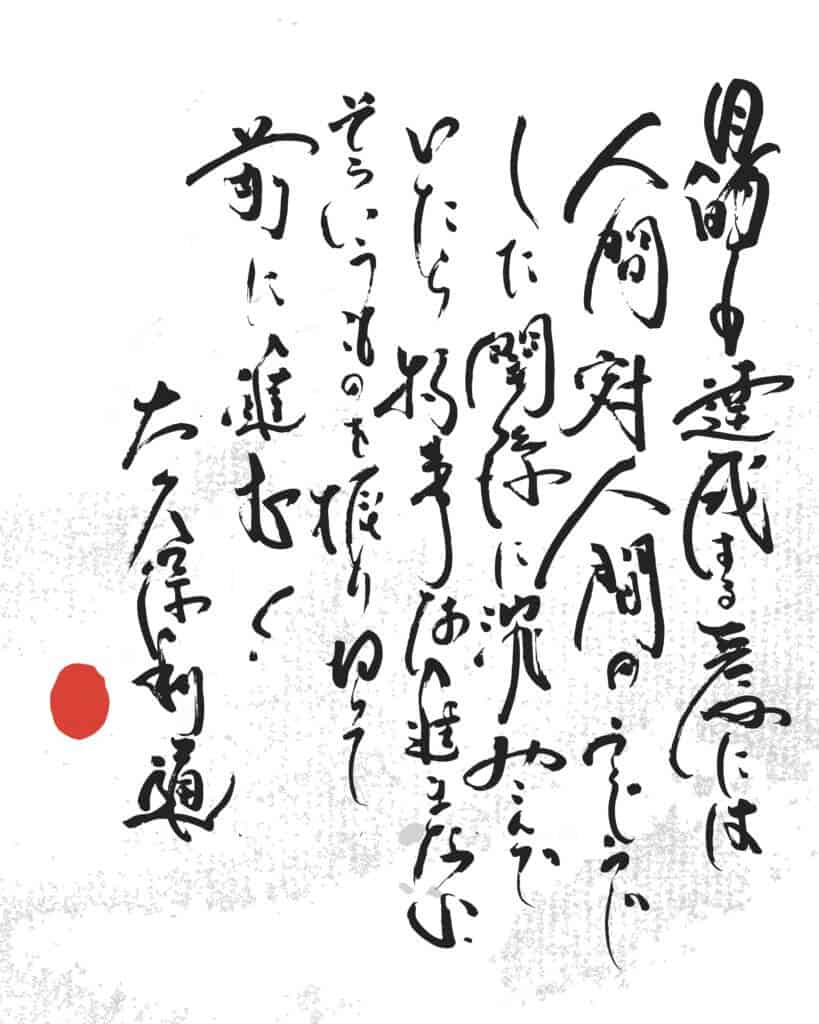
Additional Observations on Japanese
For the true language nerds out here are a few interesting facts about Japanese:
- There are no diphthongs in Japanese, only monophthongs, demonstrating that all Japanese vowels are “pure”
- Word order is classified as subject-object-verb, but the only strict rule there is that the verb must be at the end of the sentence
- The culture in Japan is VERY polite, and that is also represented in the spoken language as there is an extensive grammatical structure to express politeness, formality, and even differing levels of social status
Basic Japanese Words and Pronunciation
Japanese greetings – formal.
Here are some basic formal greetings (hi / goodbye) that you’d use on a regular day.
- Hello/Good day – Konnichiwa (こんにちは今日は)
- Good morning – Ohayō Gozaimasu (おはよう ございます お早う御座います)
- Good evening – Konbanwa (こんばんは)
- Good night – Shitsurei shimasu (しつれい します 失礼します)
- Goodbye – Sayōnara (さようなら)
Note, when greeting others in Japan be sure to accompany your words with a slight bow. This bow is often done again when saying goodbye as well.
Japanese Greetings – Informal
If you stay in Japan for a time and make friends, it may be appropriate for you to incorporate informal greetings into your vocabulary:
- Hi – Yā (やあ)
- Hey/Yo – Yō (よう)
- What’s Up? – Saikin dō? (さいきんどう最近どう)
- Bye – Jā / Jā ne (じゃあ / じゃあ ね)
- See you soon – Mata ne (また ね)
- See you again – Jā mata (じゃあ また)
- See you tomorrow – Mata ashita (また あした また明日)
- Be well – Genki De (げんき で 元気で)

Top 30 Japanese Phrases
Outside of Japanese greetings, here are the top 30 phrases that you should learn before visiting Japan:
- Hello – Kon’nichiwa (こんにちは)
- Yes – Hai ( はい)
- No – Iie (いいえ)
- Thank you – Arigatō* (ありがとう)
- Excuse me – Sumimasen* (すみません) – This phrase is important when trying to get the attention of your waiter in restaurants, and when passing people in tight quarters.
- Please – O-negai shimasu (おねがいします)
- You’re welcome – Dōitashimashite (どういたしまして)
- I’m sorry – Gomennasai (ごめんなさい)
- Do you speak English? – Eigo o hanasemasu ka (えいごをはなせますか。)
- I only speak a little Japanese – Watashi wa nihongo ga sukoshi shika hanasemasen. (わたしは にほんごがすこししか はなせません。)
- What is your name? – O-namae wa nan desu ka. (おなまえはなんですか。)
- My name is __ – Watashi no namae wa ___ desu. (わたしのなまえは かおりです)
- How are you? – O-genki desu ka. (おげんきですか。)
- I’m fine, thanks – Genki desu. (げんきです)
- I’m very glad to meet you – Oaidekite ureshī desu. (おあいできて うれしいです。)
- I don’t understand – Wakarimasen (わかりません。)
- What did you say? – Nante iimashita ka. (なんていいましたか。)
- Can you speak more slowly? – Motto yukkuri hanashite kudasai. (もっと ゆっくりはなしてください。)
- I understand you perfectly. – Yoku wakarimasu. (よくわかります。)
- How much is it? – Ikura desu ka? (いくらですか?)
- Do you have ___? – ______ wa arimasu ka? (はありますか)
- Help! – Tasukete (助けて。)
- I don’t need it. – Iranai (いらない)
- Great! / I’m glad! – Yokatta (良かった)
- Are you okay? – Daijoubu desu ka. (大丈夫ですか)
- What happened? – Doushitanda. (どうしたんだ)
- Welcome – Irasshaimase. ( いらっしゃいませ)
- How much does it cost? – Ikura kakarimasu ka? (いくらかかりますか?)
- It costs. .. – Hiyō ga kakarimasu (費用がかかります)
Note: I’ve put an asterisk by the phrases that I used the most while traveling through Japan.
Counting to 10 in Japanese
There are two methods of counting in Japanese: 1) Sino-Japanese and 2) Native Japanese. Sino-Japanese is used most often (by far), so this is what is demonstrated in the tabel below:
RELATED: The Link Between Languages and Travel
Pronouncing Japanese the Right Way
Check out this video from a native speaker that covers pronunciation for many of the phrases listed above. For best results, practice saying the words out loud so that you get used to speaking them.
Japanese Travel Phrases PDF
Keep your learning going by downloading this Japanese Phrases PDF. You will be able to practice as needed before your trip!
FAQs about Learning Japanese for Travel
Before your trip to Japan, some common phrases you should learn are “Arigatou gozaimasu” (Thank you very much), “Sumimasen” (Excuse me/I’m sorry), “Konnichiwa” (Hello), “O-genki desu ka?” (How are you?), and “Eigo o hanashimasu ka?” (Do you speak English?).
Japanese people often say “Ittekimasu” (I’ll go and come back) before leaving their home, which is a polite way of saying they are heading out. Similarly, upon returning, they say “Tadaima” (I’m back) to announce their arrival.
The Japanese word for travel is “tabi” (旅).
Some must-know phrases for Japanese travel include “Doko desu ka?” (Where is it?), “Ikura desu ka?” (How much does it cost?), “Eki wa doko desu ka?” (Where is the train station?), “Kudasai” (Please/give me), and “Osusume no o-sake wa arimasu ka?” (Do you have any recommended sake?).
Some cool Japanese phrases include “Yoroshiku onegaishimasu” (Please take care of it/Thank you in advance), “Kawaii” (Cute), “Oishii” (Delicious), “Ganbatte” (Good luck/Do your best), and “Natsukashii” (Nostalgic).
Learning Japanese for Travel | Final Recommendations
That wraps my list of essential Japanese phrases for travelers. Now that you know WHAT you need to learn, the next step is to take it into practice. I suggest that you do that by downloading the attached PDF of key Japanese phrases, and practice the phrases daily for at least a month before your trip.
To complement learning these phrases, there are a few additional resources that you may find helpful:
- iTalki – On this site you can practice with a tutor, formal teacher, or others just seeking to do a language exchange (for free!). The paid lessons have very cheap options, with some as low as $5 an hour. Check it out!
- LigoPie – Practice listening and reading Japanese with videos. You can make changes to the speed you are listening to as well. This is the best way to rapidly increase your comprehension skills!
- Japanese Pod – There are so many free resources on the website and through the podcast they offer. There are paid options as well.
- Duolingo – I don’t find this app useful for practicing spoken language, but it will help you remember key phrases through repetition.
Have you studied Japanese before? Let me know if you have any additional tips in the comments below!
Related Posts on Japan:
- 2 Days in Kyoto
- 4 Days in Tokyo
- Hakone Travel Guide
- The Best Samurai Experience in Kyoto
- Ninja Akasaka Review
Additional Travel Language Guides:
- Portuguese for Travel
- Spanish for Travel
- Italian for Travel
- Thai for Travel
- Greek for Travel
- Language and Travel
Don’t forget to pin this for later!
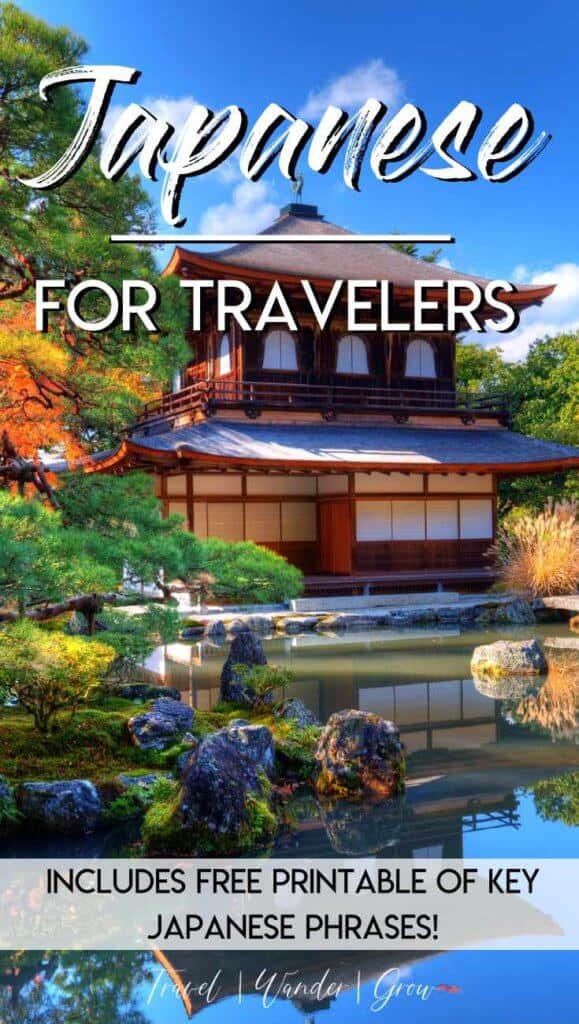
Christen Thomas is the founder of TravelWanderGrow, established in 2018. She has lived abroad and traveled extensively to over 30 countries. In addition, she is a certified Travel Advisor and is an expert in planning trips focused on city history and culture. As a frequent traveler, she also shares tips on how to prepare to travel well and how to save money while doing so.
Pinning this for later as we’re hoping to visit Japan in the next few years. Great breakdown of the common phrases. I had a Japanese roommate in high school so I’ve heard a lot of these phrases, but never knew how to spell them – so interesting!
Glad you have found the guide helpful, Emily! Hope you get to practice the phrases soon :).
I am Korean-American & can speak conversational Korean. I feel I would be able to easily pickup Japanese but they seem to talk so fast! Thanks for sharing this post! My husband & I hope to visit Japan later this fall…it will come handy!
Doesn’t it always seem that others speak so fast when you are learning a language? Hopefully you can put these to good use on your trip to Japan!
Very useful and interesting. Thank you! Keep it coming
Glad you found it helpful, Oliver!
Leave a Reply Cancel reply
Your email address will not be published. Required fields are marked *
Wandering the globe on a budget (as 'grown-ups')

20 Essential Travel Japanese Phrases (& FREE PDF sheet)
If you’re worried about going to Japan without speaking Japanese – don’t worry. In most major cities many English signs can be seen and some restaurants offer English menus.
However, there will be some situations where you need to go by pointing, gesturing, nodding etc, and having a few key phrases up your sleeve will certainly be helpful.
No time to ‘study’ Japanese? No problem! This is a mini travel Japanese lesson as well as a phrase list which will help you to build on your previous knowledge without involving any complicated sentence structures. The aim of this list is ‘simple and ready to be used’ rather than ‘complicated and forgotten already’.
I have also divided the list in different levels according to the frequency of use (strictly my personal opinion!) so you can choose how much or how little you want to learn.
Level 1 Sushi level (It’s not Suzie, it’s Sushi.)
ありがとうございます Arigato-gozaimas
You will find yourself saying this one often. I think this is one of the most important Japanese words also for the Japanese and you will probably hear local people saying this to one another a lot. So, don’t be shy with your ‘ arigato-gozaimas ‘, say it as often as you want – we love it! If you find it too much of a mouthful, the short and informal ‘ arigato ‘ should do.
2. Excuse me/Sorry
すみません Sumimasen
When you want to get someone’s attention; in a restaurant, a shop, train station, asking a stranger on a street for direction etc… The word can also mean ‘sorry’ and listeners will usually know which one you mean in the context.
おねがいします O’negai shimas
Use this in conjunction with finger-pointing and/or gestures to make requests in restaurants, shops and such. Ie: saying ‘ o’negai shimas ‘ whilst pointing at writing (or a photo of) ‘tall caramel latte macchiato’ means you’re saying ‘tall caramel latte macchiato please.’
If you’re up for a challenge, use 〜 o o’negai shimas (〜を おねがいします) format,
ie: Ko-hi- o o’negai shimas , ( coffee please).
Check-in o o’negai shimas , ( check-in please).
いいえ Iie (it’s an [i:] sound as in ‘feel’, then ‘e’ as in ‘end’)
6. Where is〜?
〜はどこですか 〜wa doko des ka
Insert the destination of your choice and you’re good to go, ie: toire wa doko des ka , (where is the toilet ?)
Other useful words:
- Police box 交番 Ko-ban
- Bank 銀行 Ginko
- Convenience store コンビニ Kon’bini (Japanese convenience store is a legend. You can pay your bills, buy bus tickets or concert tickets, and so much more. It goes without saying that most of your daily essentials can be purchased here. Trust me, you will want to take one home.)
- Train station 駅 Eki
- Bus stop バス停 Basu-tei
7. How much?
いくらですか Ikura des ka
Just in case. Sometimes ¥100 store giant Daiso has things that are ¥300, ¥500… (although they are always clearly labeled!!)
8. Do you have〜?/Is there〜?
〜は ありますか 〜wa arimas ka
When you are looking for that super-rare Nintendo game in Akihabara ( Virtual Bowling wa arimas ka ), or if you are that person who asks for cappuccino in a Japanese tea specialist cafe ( cappuccino wa arimas ka ). Can also be used when you want to know if a place has certain facilities like toilet, ( toire wa arimas ka ).
In English please? 英語でおねがいします Eigo de o’negai shimas .
If you’re desperate, just omit the ‘de’ and say ‘ eigo o’negai shimas !’ Not grammatically correct, but people will understand. I can not guarantee their ability to speak in English though.
Do you have an English menu? 英語のメニューはありますか Eigo no menu wa arimas ka (here comes that ‘ 〜wa arimas ka ‘ structure again).
10. Good-bye
さようなら Sayo-nara
There is this beautiful old Japanese song called ‘Sayonara (1979)’ by a band called Off Course, but I digress…
11. Numbers
Here is the super easy way to learn Japanese numbers 0 – 99. Worried that you might forget? Don’t worry, wear them on a T-shirt!

I hope you’re enjoying learning Japanese with this list so far. If you would like a free PDF version you can download from here , AND it comes with 5 extra phrases!

The next level is Onigiri rica ball level…
Level 2 Onigiri rice ball level
(you know onigiri is not sushi and can name at least 3 different classic onigiri fillings.).
〜 まで 〜made (NOT as in ‘made in Japan’, it’s ma’de.)
Will be handy when you want to express where you’re heading. For example at the train station: ‘ Kyoto ma’de ( des )’ which is ‘To Kyoto’ (with des = polite, without des = casual).
In case you want to learn to say ‘A ticket to Kyoto please’ it’s ‘ Kyoto ma’de no kippu o o’negai shimas ‘.
13. What time
Bring up in pitch at the end just a bit to say ‘what time? ( Nan ji ?)’
If you want to say ‘until what time?’ it’s ‘ Nan ji ma’de ?’ This can mean ‘what time do you close?’ and is useful when you need to know the closing time of shops or restaurants.
You learnt ‘ ma’de ‘, now you need to know ‘ kara ‘ as well. How do we say ‘from what time?’ You guessed it, it’s ‘ Nan ji kara ?’
And I can hear your clever brain clicking and thinking: ‘wait, does that mean I can say Kyoto kara – from Kyoto, too?’ That is right!
15. (Does this) go to〜?
〜に行きますか 〜ni iki mas ka
Useful when you want to check if a train or a bus really goes to your destination. ‘ Shibuya ni iki mas ka ? (Go to Shibuya?)’
You can also make a statement out of it simply by taking off the question marker か ka .
渋谷に行きます Shibuya ni iki mas = Go to Shibuya .
16. (I’m/it’s) Ok
だいじょうぶです Daijo-bu des
You’re standing outside the shop waiting for your friend, a keen Japanese person decides that you’re lost and tries to help you, you say ‘ daijo-bu des (I’m ok)’. A waiter accidentally knocks down your bag, nothing is broken, you say ‘ daijo-bu des (it’s ok)’.
Would you like to know how to say ‘are you ok/is it ok?’ Easy! Simply add ‘ ka か’ which is a question marker at the end and say ‘ daijo-bu des ka ?’
17. Is card ok?
カード だいじょうぶですか ka-do daijo-bu des ka
In high-tech Japan, cash is still king. Although cashless options are increasing especially since COVID19, it is always a good idea to bring cash and/or ask the staff if they take card payments. If you want to say ‘can I pay by card?’ it will be ‘ ka-do de hara’e mas ka ?’ but this simple ‘ ka-do daijo-bu des ka ? (is card ok?)’ sentence will do just fine specially when you ask at the cashier.
18. Good afternoon (and kind of ‘hello’)
こんにちは Kon’ni chiwa
You all know this one. Since Japanese does not have ‘hello’, I guess this is the closest as ‘good afternoon’ can be used during the waking hours of most average people.
- Good morning おはようございます ohayo-gozaimas
- Good evening こんばんは konbanwa
19. I don’t understand
わかりません Wakarimasen
Please feel free to say this when you don’t understand our ‘Japangrish’.
20. (It’s) different/wrong
ちがいます Chigaimas
Wrong price? Incorrect change? Wrong dish arrived? The room is different to the one you have booked? Say ‘ chigaimas ‘!
Congratulations for coming this far and I hope you found this list useful. Click here to download the PDF version for free (+ 5 extra phrases!) or you can use the form below.
I really hope we can travel to Japan again soon (August 2021). For up to date information, please visit Ministry of Foreign Affairs of Japan website : https://www.mofa.go.jp/ca/fna/page4e_001053.html

25 Essential Travel Japanese Phrases FREE download
Enter your details below to subscribe to our email list + grab FREE Japanese travel phrases.
By clicking Subscribe, you consent to being sent updates and newsletters. You can unsubscribe anytime. For more details, review our Privacy Policy .
What are your interests? (Please tick one or both.)
Please check your e-mail inbox 🙂
What is Tokyo like?

London Ramen Hunting: Hakata, Bermondsey
You may also like.

2 weeks in Kyushu with the Japan rail pass. Part 5 of 6: Day 11 – 13 Beppu and emergency move to Kyoto!

2 weeks in Hokkaido with the Japan Rail Pass (Part Two: Day 9 – 14)
Leave a reply cancel reply.
Your email address will not be published. Required fields are marked *

Useful Japanese Travel Phrases to Learn Before Visiting

If you’re planning a trip to Japan , it’s important to know some basic Japanese travel phrases to help you navigate the country and communicate with the locals.
A few Japanese speak English, especially in major cities, but using Japanese phrases can make a big difference in showing respect and building relationships with the locals.
From simple greetings to ordering food in a Japanese restaurant , a basic understanding of local phrases can go a long way. To help you get started, we’ve compiled some essential Japanese words and phrases for travelers, courtesy of Boutique Japan.
First, greetings such as “ Konnichiwa ” (hello) and “ Arigatou ” (thank you) are a great way to show respect and politeness when interacting with locals.
Simple phrases like “ Sumimasen ” (excuse me) and “ Onegaishimasu ” (please) can also be helpful in various situations.
When it comes to ordering food in a restaurant, phrases like “ Chuumon wo onegaishimasu ” (I would like to order, please) and “ O-mizu wo kudasai ” (Can I have some water, please?) can help make your dining experience smoother. In addition, asking “ Nani wo osusumeshimasu ka? ” (What do you recommend?) can lead to the discovery of new and delicious Japanese dishes .
These are just a few examples of essential Japanese phrases for travelers. By learning some basic Japanese travel phrases, you can enhance your travel experience and make meaningful connections with locals.
So start practicing and have a wonderful trip in Japan!
Here are useful Japanese travel phrases and words which will help you to explore Japan
- こんにちは ( Konnichiwa ) – Hello
- ありがとう ( Arigatou ) – Thank you
- すみません ( Sumimasen ) – Excuse me/I’m sorry
- はい ( Hai ) – Yes
- いいえ ( Iie ) – No
- お願いします ( Onegaishimasu ) – Please
- どうも ( Doumo ) – Thanks/Thank you very much
- ごめんなさい ( Gomen nasai ) – I’m sorry
- おはようございます ( Ohayou gozaimasu ) – Good morning
- こんばんは ( Konbanwa ) – Good evening
- さようなら ( Sayounara ) – Goodbye
- いくらですか?( Ikura desu ka? ) – How much is it?
- おいくらですか?( Oikura desu ka? ) – How much is it? (more polite)
- どこですか?( Doko desu ka? ) – Where is it?
- お手洗いはどこですか?( Otearai wa doko desu ka? ) – Where is the restroom?
- おいしいです ( Oishii desu ) – It’s delicious
- 英語が話せますか?( Eigo ga hanasemasu ka? ) – Do you speak English?
- わかりません ( Wakarimasen ) – I don’t understand
- すみません、もう一度言ってください ( Sumimasen, mou ichido itte kudasai ) – Excuse me, could you please say that again?
Here are some additional Japanese travel phrases, which you could use at a restaurant

- メニューを見せてください ( Menyuu wo misete kudasai ) – Could you show me the menu, please?
- 何をお勧めしますか?( Nani wo osusumeshimasu ka? ) – What do you recommend?
- 注文をお願いします ( Chuumon wo onegaishimasu ) – I would like to order, please.
- これを注文します ( Kore wo chuumon shimasu ) – I’ll have this one, please.
- お水をください ( O-mizu wo kudasai ) – Can I have some water, please?
- お酒はありますか?( Osake wa arimasu ka? ) – Do you have any alcohol?
- 焼き鳥を二本ください ( Yakitori wo nihon kudasai ) – Can I have two skewers of grilled chicken, please?
- お勘定をお願いします ( Okaikei wo onegaishimasu ) – Can I have the bill, please?
- もう少し辛くしてください ( Mou sukoshi karakushite kudasai ) – Can you make it a little spicier, please?
- お会計は、クレジットカードで払えますか?( Okaikei wa, kurejitto kaado de haraemasu ka? ) – Can I pay the bill with a credit card?
I hope these additional phrases help you navigate ordering food and drinks at a restaurant in Japan!
Related read: The Different Flavors of Japan: What Makes Japanese Cuisine so Special
Here are some additional Japanese travel phrases, which you could use when looking for directions

- ここはどこですか?( Koko wa doko desu ka? ) – Where am I?
- この地図を見てください ( Kono chizu wo mite kudasai ) – Could you please look at this map?
- ここに行くにはどうすればいいですか?( Koko ni iku ni wa dou sureba ii desu ka? ) – How do I get to this place?
- この場所には、どうやって行けますか?( Kono basho ni wa, douyatte ikemasu ka? ) – How can I get to this place?
- 左に曲がってください ( Hidari ni magatte kudasai ) – Turn left, please.
- 右に曲がってください ( Migi ni magatte kudasai ) – Turn right, please.
- まっすぐ行ってください ( Massugu itte kudasai ) – Go straight, please.
- どのくらい遠いですか?( Dono kurai tooi desu ka? ) – How far is it?
- この地域の交通情報はどこで調べられますか?( Kono chiiki no koutsuujouhou wa doko de shiraberaremasu ka? ) – Where can I find information about transportation in this area?
- 申し訳ありませんが、もう一度教えていただけますか?( Moushiwake arimasen ga, mou ichido oshiete itadakemasu ka? ) – I’m sorry, could you please tell me again?
I hope these additional phrases help you navigate to what you want to see in Japan!
Here are Japanese travel phrases when using the public transport or a taxi
- このバスは〇〇行きですか?( Kono basu wa ○○-yuki desu ka? ) – Does this bus go to ○○?
- どこでバスに乗れますか?( Doko de basu ni noremasu ka? ) – Where can I catch the bus?
- これで〇〇駅に行けますか?( Kore de ○○-eki ni ikemasu ka? ) – Can I go to ○○ station with this?
- 次の駅で降りる予定です。( Tsugi no eki de oriru yotei desu ) – I plan to get off at the next station.
- 何駅目ですか?( Nanboku-me desu ka? ) – What stop is this?
- 駅はどちらですか?( Eki wa dochira desu ka? ) – Where is the station?
- この電車は何番線ですか?( Kono densha wa nanbansen desu ka? ) – What platform is this train?
- この電車は〇〇に行きますか?( Kono densha wa ○○ ni ikimasu ka? ) – Does this train go to ○○?
- タクシーを拾いたいのですが。( Takushii wo hirotai no desu ga ) – I’d like to hail a taxi, please.
- 〇〇に行ってください。( ○○ ni itte kudasai ) – Please take me to ○○.
I hope that these additional phrases will make it easier for you to find your way around public transportation or taxis in Japan!
Related read: Traveling by Rail in Japan with JR Pass
So you’ve taken a taxi or train and arrived at your hotel. You’re going to find that hotels have a lot to offer you, which means you’re also going to get to use a lot of unique vocabulary.
Here are some of the words you’re most likely to use when checking into your hotel
- チェックインをお願いします。( Chekkuin wo onegaishimasu ) – I’d like to check in, please.
- 予約をしています。( Yoyaku wo shiteimasu ) – I have a reservation.
- 〇〇で予約をしています。( ○○ de yoyaku wo shiteimasu ) – I have a reservation at ○○.
- 予約名は〇〇です。( Yoyaku-me wa ○○ desu ) – The reservation is under the name of ○○.
- 一泊〇〇円の部屋を予約しています。( Ippaku ○○en no heya wo yoyaku shiteimasu ) – I have a reservation for a room at ○○ yen per night.
- シングルルーム/ダブルルーム/ツインルームを予約しています。( Shinguru ruumu/daburu ruumu/tsuin ruumu wo yoyaku shiteimasu ) – I have a reservation for a single/double/twin room.
- ルームキーをお願いします。( Ruumu kii wo onegaishimasu ) – May I have my room key, please?
- チェックアウトは何時ですか?( Chekkauto wa nanji desu ka? ) – What time is check-out?
- 禁煙ルームを希望します。( Kinen ruumu wo kibou shimasu ) – I would like a non-smoking room.
- 何階に部屋がありますか?( Nankai ni heya ga arimasu ka? ) – On which floor is my room?
I hope these additional phrases are of help to you during your hotel check-in process in Japan!
Here useful phrases to order coffee or tea
- コーヒー/紅茶を一杯お願いします。( Koohii/koucha wo ippai onegaishimasu ) – I would like a cup of coffee/tea, please.
- ホットコーヒー/アイスコーヒーをお願いします。( Hotto koohii/aisu koohii wo onegaishimasu ) – I would like a hot/cold coffee, please.
- 砂糖を入れてもらえますか?( Satou wo irete moraemasu ka? ) – Can I have some sugar, please?
- ミルクを入れてもらえますか?( Miruku wo irete moraemasu ka? ) – Can I have some milk, please?
- ホイップクリームを入れてもらえますか?( Hoippu kuriimu wo irete moraemasu ka? ) – Can I have some whipped cream, please?
- アイスカフェラテをお願いします。( Aisu kafe rate wo onegaishimasu ) – I would like an iced cafe latte, please.
- カフェモカをお願いします。( Kafe moka wo onegaishimasu ) – I would like a cafe mocha, please.
- アールグレイをお願いします。( Aaru gurei wo onegaishimasu ) – I would like Earl Grey tea, please.
- デカフェをお願いします。( Dekafe wo onegaishimasu ) – I would like decaf coffee, please.
Hopefully, these additional phrases will make your coffee or tea ordering in Japan a lot easier for you!
Let’s go shopping in Japan
- これはいくらですか?( Kore wa ikura desu ka? ) – How much is this?
- これをください。( Kore o kudasai. ) – Please give me this.
- ありがとうございます。( Arigatou gozaimasu. ) – Thank you very much.
- これはどこですか?( Kore wa doko desu ka? ) – Where is this?
- すみません、見てもいいですか?( Sumimasen, mite mo ii desu ka? ) – Excuse me, may I have a look at this?
- まだ見たい物があります。( Mada mitai mono ga arimasu. ) – Do you have something else I can see?
- このサイズがありますか?( Kono saizu ga arimasu ka? ) – Do you have this in my size?
- 買いましょうか?( Kaimashou ka? ) – Shall I buy this?
- かりとお願いします。( Karito o kudasai. ) – Could you wrap it up, please?
- クレジットカードが使えますか?( Credit card ga tsukaemasu ka? ) – Do you accept credit cards?
Related read: Hankyu Very Much: Non-bargain-shopping in Japan
Knowing a few basic Japanese travel phrases can make your trip to Japan much more enjoyable and rewarding.
Whether you’re asking for directions, ordering food, checking into a hotel, or simply interacting with the locals, using a few key phrases can go a long way in making connections and showing respect for Japanese culture .
With these additional phrases added to the list, you now have a solid foundation of essential Japanese travel phrases to use during your trip.
Remember to practice and be patient, as language barriers and cultural differences can sometimes present challenges. But with a friendly attitude and a willingness to learn, you’ll be able to navigate your way around Japan with confidence and ease.
Enjoy your travels and have a wonderful time in Japan!
I'm sure you've had similar experiences I had whilst traveling. You're in a certain place and a fellow traveler, or a local, tip you off on a little-known beach, bar or accommodation. Great travel tips from other travelers or locals always add something special to our travels. That was the inspiration for Travel Dudes.
View all posts
RELATED ARTICLES MORE FROM AUTHOR
Beginners allowed: a japow paradise for skiers of all levels, great mediterranean sailing routes for beginners, exploring kamikawa: adventures in the center of hokkaido, follow us on instagram @/traveldudes/.
- Advertise and Media

73+ Essential Japanese Travel Phrases for Tourists Visiting Japan & Free cheat sheet

Disclosure: This essential Japanese travel phrases for tourists article may contain affiliate links. If you click it and buy something you like, I’ll earn a small commission at no extra cost to you. Thank you! Read more in Disclaimer .
Going to Japan? Searching for essential Japanese travel phrases for tourists ? Look no further! When in Japan, being familiar with common Japanese phrases for tourists will be beyond helpful! Trust me! I have been to Japan and knowing basic Japanese phrases helped me to enjoy exploring the vibrant streets of Tokyo , serene temples of Kyoto , or the natural beauty of Mount Fuji during sakura.
Before you travel to the land of the rising Sun, learn Japanese travel phrases which will help to order ramen, and to deepen your understanding of Japanese culture and their way of life. Curious, what are some common phrases I need to learn before my trip to Japan ?
🥘 If you have been wondering “What is Anja’s favorite Japanese food?”, you will find the answer hidden in the blog.

Japan is one of the most sought-after and visited countries in Asia, known for its fascinating blend of tradition and modernity, breathtaking landscapes, and renowned cuisine. Especially popular in Spring at sakura or in Autumn for fall foliage. There are people in Japan, who speak English. But it is not as common as you would think. Thus, japanese phrases to know when traveling will come in handy. By knowing basic Japanese words you will also be able to show respect to the locals. In this common travel phrases Japanese language guide , you are going to find useful phrases in Japanese for tourists. From typical Japanese phrases for greetings, Japanese hotel phrases and Japanese words for simple conversation. Inside the post you will also find a FREE Japanese travel phrases pdf , that you can download and bring with you to Japan. Let’s begin your Japanese adventure by learning essential Japanese phrases for travel .
for ESSENTIAL TRAVEL PHRASES: • 73+ Essential ENGLISH Travel Phrases and Words You Should Know • 73+ Essential ARABIC Travel Phrases for Tourists in Arab Countries & Free PDF • 73+ Essential GREEK Travel Phrases for Tourists on a Greek Holiday & Download • 73+ Essential JAPANESE Travel Phrases for Tourists Visiting Japan & Free cheat sheet • 73+ Essential SLOVENIAN Travel Phrases for your trip to Slovenia & Free Download • 73+ Essential SWAHILI Travel Phrases for Travelers to East Africa + Free Download for WORDS & PHRASES in 101 different languages: • How to say You have beautiful eyes in 101 different languages • How to say What is the WiFi password in 101 different languages • How to say Hello in 101 different languages spoken around the World • How to say Love in 101 different languages spoken around the World • How to say I love you in 101 different languages spoken around the World • How to say Thank you in 101 different languages spoken around the World • How to say Happy Birthday in 101 different languages spoken In the World • How to say Happy New Year in 101 different languages spoken around the World • How to say Friend in 101 different languages spoken around the World with Pronunciation
for general JAPAN TRAVEL TIPS: • GET OVER JET LAG WITH THESE 19 EASY-TO-FOLLOW TIPS • ULTIMATE TRAVELER SAFETY GUIDE: WHAT TO DO DURING AN EARTHQUAKE for JAPAN TIPS: • Ultimate List of 23 Best Apps for Travel to Japan • JAPAN COST OF TRAVEL AND DETAILED BUDGET BREAKDOWN • HOW TO SPEND SEVENTEEN DAYS IN JAPAN: FIRST TIME ITINERARY • 73+ Essential Japanese Travel Phrases for Tourists Visiting Japan & Free cheat sheet for best TOURS IN JAPAN: • TOP 5 RAMEN TOURS IN TOKYO TO UNLOCK YOUR TASTEBUDS • 10 STUNNING JAPAN CHERRY BLOSSOM TOURS THAT YOU WILL ABSOLUTELY LOVE for INSTAGRAM CAPTIONS about JAPAN: • 55 BEST KYOTO CAPTIONS FOR INSTAGRAM – GOLDEN AND KAWAII • 55 BEST TOKYO CAPTIONS FOR INSTAGRAM – KAWAII AND CUTE • 73 Best Ramen Captions for Instagram – Delicious Like Broth • 87 Simplistic Cherry Blossom Captions for Sakura – Sweet and Dreamy • 135 Best Japan Captions for Instagram – Puns, Quotes, Riddles & Jokes
Table of Contents
📌 Don’t have time for a quiz now? Pin i t for later!
Don’t have time to read now? Pin it for later!
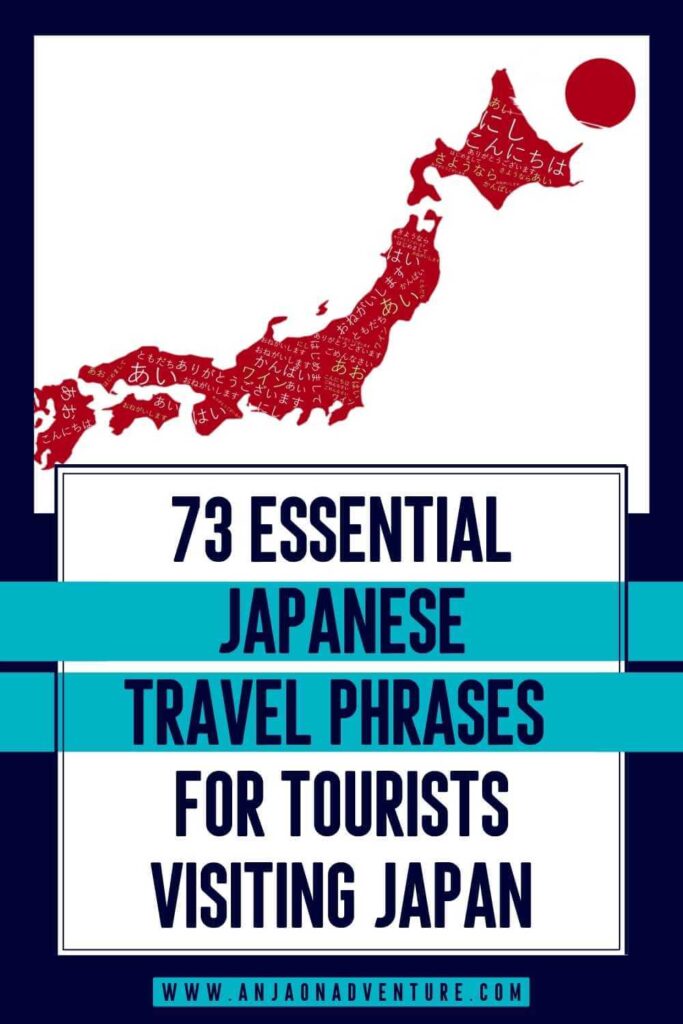
1. Where is Japanese spoken?
Did you know that more than 125 million people speak Japanese? Japanese is primarily spoken in Japan. It is the official language of Japan and is spoken by the majority of the population there. Due to globalization and the popularity of Japanese culture, Japanese is studied and spoken by learners in many countries worldwide. There are Japanese-speaking communities in countries around the world, particularly in the United States, Brazil, Canada, Australia, and the Philippines. The best way to learn Japanese for travel is by using apps like Duolingo or Memrise. If your Japan itinerary is longer than 2 weeks, maybe sign up for a language course. To master the basic Japanese phrases for conversation the best way would be going on a language exchange but if you don’t have time, just download Japanese cheat sheet in this blog post.
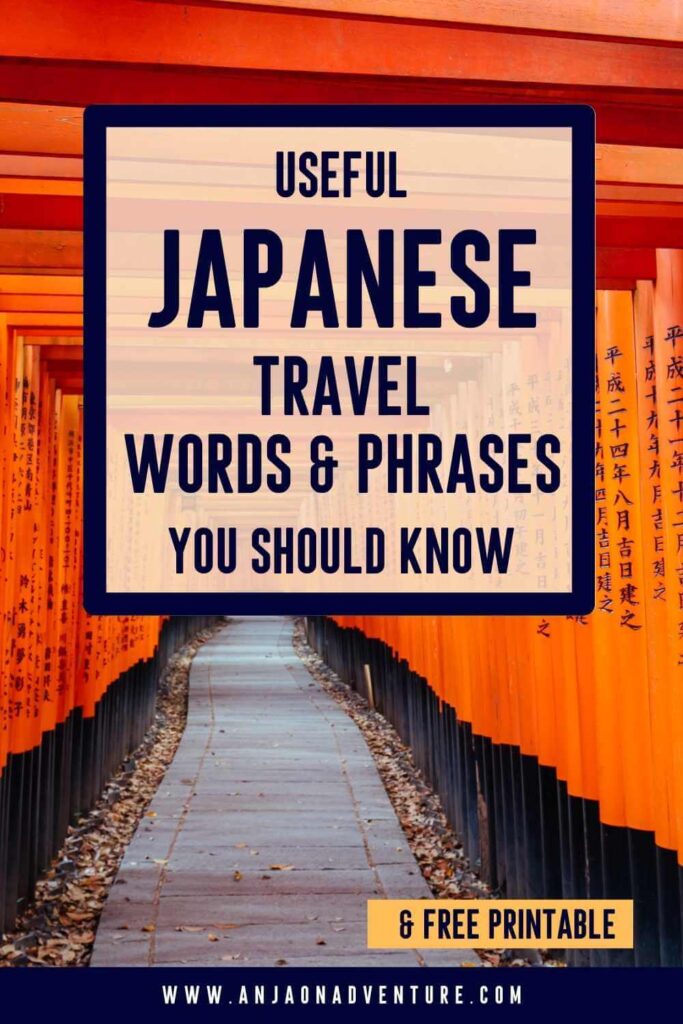
2. Japanese language basics: alphabet and pronunciation
Before you start learning common Japanese phrases for tourists, you have to familiarize yourself with the basics of the Japanese language . The Japanese writing system consists of three alphabets: Hiragana, Katakana, and Kanji . Hiragana and Katakana are native to Japan. They both use 46 characters , each representing one syllable and a specific phonetic sound . Hiragana is used for native Japanese words and Katakana for words borrowed from foreign languages. Kanji is a writing system borrowed from China, where each ideogram stands for a certain meaning and can have multiple pronunciations. Don’t get scared, let me tell you that Japanese alphabet has fewer letters than English alphabet, 21 in total. It uses the same sounds that you use in the English language. Each character represents a specific sound , and once you grasp the sounds, you will be able to read and pronounce Japanese with ease. Below you will find a guide for Hiragana and Katakana symbols and a similar sound in English language.
Pinning is winning and sharing is caring! What are you choosing?
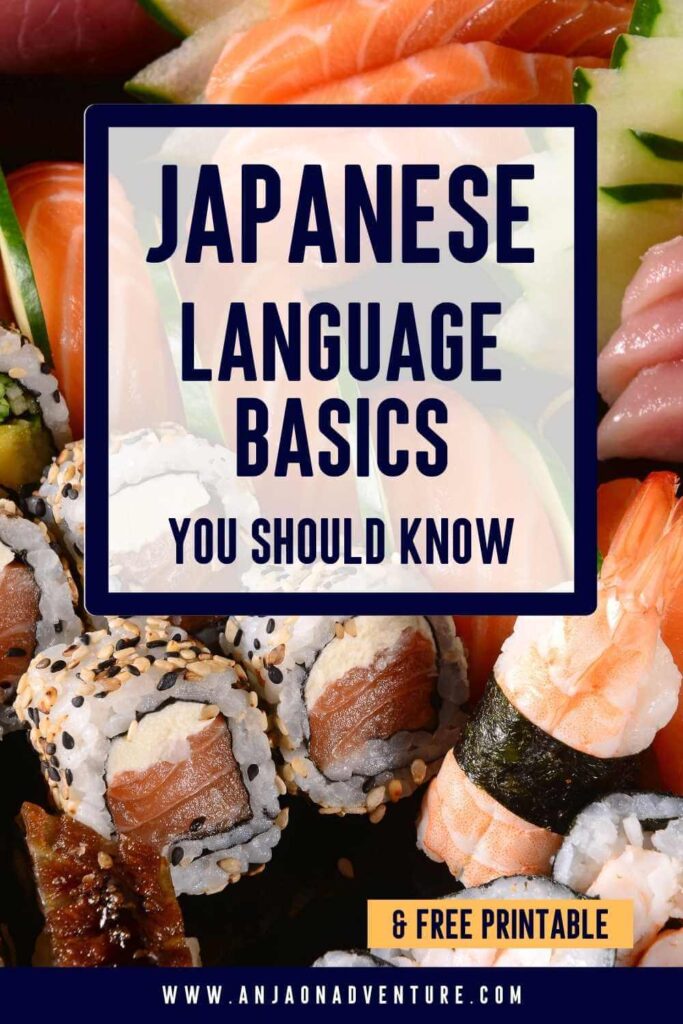
3. Essential Japanese travel phrases
3.1. basic japanese phrases for travelers.
Basic Japanese phrases for conversation that showcase politeness and cultural respect, encouraging positive interactions with locals and are a base for every communication. Those are basic phrases to know when visiting Japan.
ALSO READ: • HOW TO SPEND SEVENTEEN DAYS IN JAPAN: FIRST TIME ITINERARY
3.2. Essential Japanese phrases for greetings and introductions
Japanese words and phrases for greetings lay the foundation for any interaction, allowing you to initiate conversations and make a positive first impression. They are easy Japanese words to learn.
ALSO READ: • How to say You have beautiful eyes in 101 different languages around the World
3.3. Essential Japanese travel phrases for directions and getting around
Japanese travel phrases when asking for directions will enable you to navigate unfamiliar streets and find your way around.
ALSO READ: • Japan Cost of Travel and Detailed Budget Breakdown
3.4. Useful Japanese phrases for tourists when ordering food and drinks
Japanese language phrases for ordering meals, asking for recommendations, and specifying dietary preferences ensure enjoyable dining experiences and help you explore local cuisines.

3.5. Essential phrases in Japanese for shopping
Japanese basics terms for inquiring about prices, negotiating, and Japan tourist phrases for asking for sizes or colors are handy when exploring markets and boutiques.
ALSO READ: • Ultimate List of 23 Best Apps for Travel to Japan
🥘 “What is Anja’s favorite Japanese food?” It is ramen. I love ramen and could eat it every day.
3.6. Useful Japanese hotel phrases
Japanese language words and hotel phrases you will need when checking in a hotel, asking for towels, fixing air conditioning, enquiring what time is breakfast, and what is included in your room rate.
ALSO READ: • How to say Thank you in 101 different languages in the World
3.7. Survival Japanese phrases and Japanese travel terms in case of emergencies
Here you will find helpful Japanese travel terms in case of emergencies, natural disasters, or if you will be needing assistance in difficult or dangerous situations.
ALSO READ: • Best Japan Captions for Instagram – Puns, Quotes, Riddles & Jokes
3.8. Beyond tourist Japanese phrases
If you’re like me and really love learning a few phrases in new languages, expand your study beyond the essential travel phrases . I always learn how to say please and thank you, never visit a country without knowing the local word for “coffee” and never leave without knowing how to say;

4. Best language App for traveling abroad
Learning a language is a long process. If you think you won’t have time to learn basic Japanese phrases , or if the situations come your way when above mentioned Japanese travel phrases won’t be enough, use Google Translate. This is my favorite language app, that I use on (almost) every trip.
4.1. Google Translate
Google Translate is the most popular language travel app that can be used everywhere. I personally use it on all my travels, when going to Tanzania to learn what some Swahili words mean, when in Mexico to help with my not-the-best Spanish, when in Italy, in Japan and other places. I’m sure you are familiar with the language app already. The most obvious feature is it will help you translate the destination language into your own one. But the absolute best feature is that it can translate the text using ‘ camera translation ’. All you have to do is open the app, point your camera toward the text in a foreign language and Google Translate will do the rest. Perfect for menus! It also translates text from the photos on your camera roll. And it also works offline, when you download the language pair on your phone. Language: 133 languages Download: iOS | Android | Website Price: Free
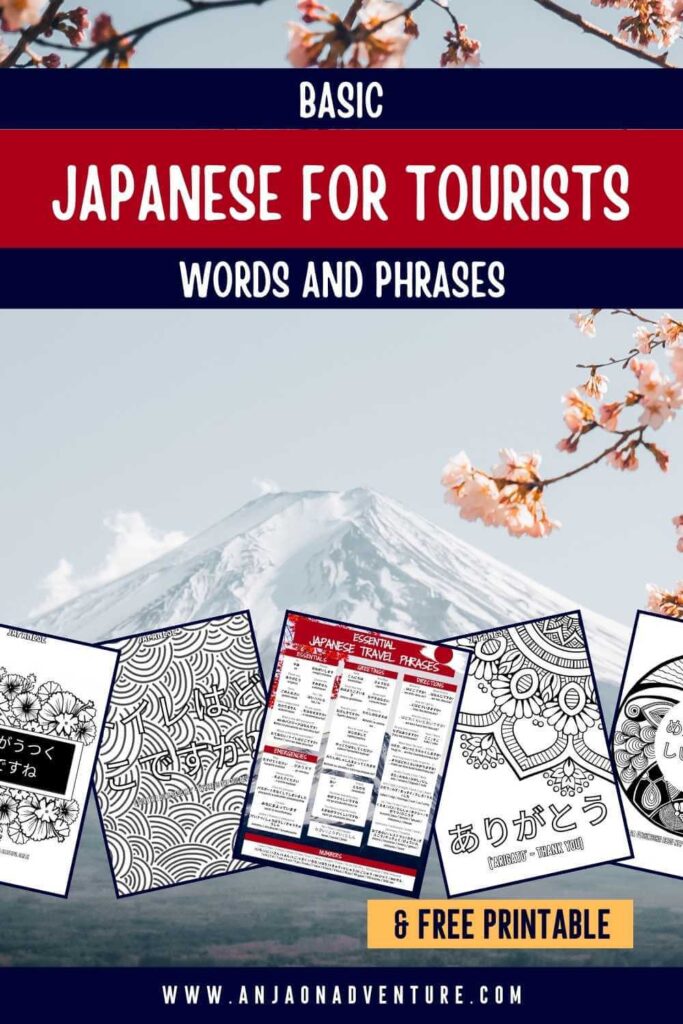
5. Final Thoughts on Essential Japanese Travel Phrases for Tourists
Whether it’s a warm greeting, ordering a meal, or expressing gratitude, this travel japanese guide and Japanese for tourists not only open doors to easier communication, but also show respect and will help you to understand Japanese culture in a different way. Before traveling to Nippon, learn Japanese words for tourists that will help you to navigate through this modern but culturally entwined land, full of history, sushis, shrines, and geishas. How to say Hello in Japanese and how to say thank you in Japanese language. Basic Japanese phrases for directions, ordering food, and checking in a hotel. And don’t forget to download Japanese travel cheat sheet . Which of these must know Japanese phrases for travel have you managed to memorize so far? Let me know in the comments! Safe travels = 安全な旅行 [anzen’na ryokō], Anja
➤ What you should read next …
• How to spend 17 days in Japan • Japan Cost of Travel and Detailed Budget Breakdown • Ultimate List of 23 Best Apps for Travel to Japan • 135 Best Japan Captions for Instagram – Puns, Quotes, Riddles & Jokes • How to say Hello in 101 different languages
📌 Lik e it? Pin it!

✈ Travel like a PRO
Are you ready to travel like a PRO? Save time and money with these travel tips and resources . I personally use these companies to save time and money. They do the work by providing a list of options, prices, and reviews from actual guests, for anywhere I am traveling worldwide. ✈️ FLIGHTS: I use Skyscanner in combination with Google Flights to find amazing flight fares (try the Explore feature). I book directly with an airline or pair it with Iwantthatflight for the best deals. 🏨 ACCOMMODATION: Booking.com is my favorite site for finding great hotel deals. They return the best rates and reviews are from actual guests! 🚘 RENTAL CARS: Discover Cars are my go-to, when planning an epic road trip. 🗽 TOURS & ACTIVITIES: I like to wander around on my own, but when I want to explore with a group, skip the line with an entrance ticket, I book it with GetYourGuide or Viator . ❤️🩹 TRAVEL INSURANCE: I never, under any circumstances travel without insurance. In most cases, I use yearly global travel medical insurance. But, if you don’t have that and some impromptu travel plans occur, use SafetyWing . With them, you can buy travel insurance even when you are already abroad. Better be safe, than sorry! 📲 ONLINE SAFETY: NordVPN keeps your devices’ browsing safe and malware-free. Stream shows from around the world, access social media in countries where they are blocked and buy cheap flights by changing your virtual location. 🛜 STAY CONNECTED WITH eSIM: Ditch the plastic SIM cards and waiting in lines at the airport! Airalo eSIMs allow you to connect as soon as you land at your destination. They have eSIMs for over 190+ countries worldwide.
Where is Japanese spoken?
Japanese is an official language in Japan. There are some Japanese-speaking communities in various other countries around the world, like the United States, Brazil, Canada and Australia.
How to say Good Morning in Japanese?
おはようございます pronounced as “ohayou gozaimasu” Learn basic Japanese words and quick Japanese phrases easy on Anja On Adventure blog. Here you can also FREE DOWNLOAD Japanese phrases for travelers pdf and key Japanese phrases for tourists.
How to say Thank you in Japanese?
Thank you in Japanese is ありがとうございます, which is pronounced as “ arigatou gozaimasu”. Learn more Japanese language basics and easy Japanese phrases for tourists on Anja On Adventure blog. Here you can also FREE DOWNLOAD basic Japanese travel phrases pdf and coloring pages with Japanese words.
How to say Hello in Japanese?
こんにちは pronounced as “konnichiwa” Learn basic Japanese for tourists and important Japanese phrases for travel on Anja On Adventure blog. Here you can also FREE DOWNLOAD Japanese for travelers pdf and Japan basic words.
How to say My name is in Japanese?
わたしのなまえは …, pronounced as “ Watashi no namae wa …”. Learn Japan travel phrases and top Japanese phrases for tourists on Anja On Adventure blog. Here you can also FREE DOWNLOAD basic Japanese words pdf and Japanese phrases while travelling Japan.
How to say How are you in Japanese?
おげんきですか? , pronounced as “ Ogenki desu ka?” Learn more Japanese phrases to know and basic Japanese phrases for tourists on Anja On Adventure blog. Here you can also FREE DOWNLOAD Japanese phrase cheat sheet pdf and useful kanji for tourists.
How do you say Hi in Japanese?
Hi in Japanese language is やあ , pronounced as “ya”. Learn learn basic Japanese for travel and Japanese phrases for travelling on Anja On Adventure blog. Here you can also FREE DOWNLOAD japanese cheat sheet tourist pdf and Japan phrases for travelers.
❥ About Anja On Adventure

Anja On Adventure is a travel blog, a collection of insider tips and information on destinations, that I visited as a solo female traveler, tour guide, teacher, yacht stewardess, and Survivor challenge tester. Anja, is a thirty-something adventure-seeking, sun chasing, beach hopping, gin-loving, tropics enthusiast with a creative mind and sarcastic spirit, who loves coconut and mango but doesn’t like chocolate and sweets. I am passionate about all things travel, maps, and puzzles. Click here to learn more About me .
About the author: Anja
The Ultimate Guide to Learning Japanese
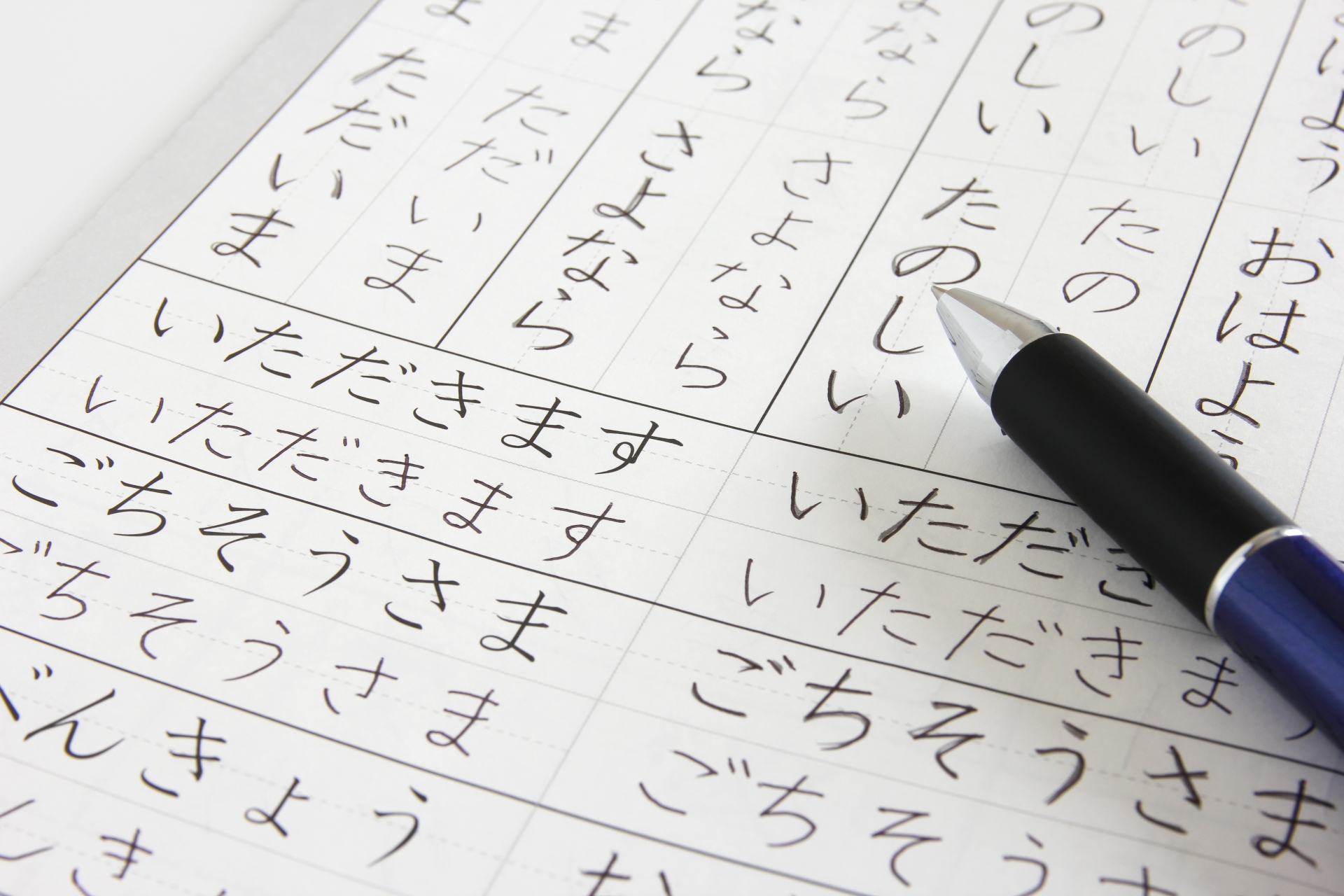
Bryce was born in California, but raised from the age of 3 near Seattle, Washington. He’s been living in Tokyo for about 7 years, and graduated from Temple University, Japan with degrees in economics and international business. He loves traveling of course, but also cooking, snowboarding, some video games as well. His biggest interest is songwriting/music production, more specifically electronic music… think Skrillex, Marshmello, Daft Punk, etc. He also has terrible humor as you’ll notice, but he hopes you’ll enjoy it!
This post may contain some affiliate links. When you click through and make a purchase we may receive some commission, at no extra cost to you.
Surely after checking out all of our great recommendations for activities , sightseeing , food , or other opportunities you’re already planning your trip here. Haven’t seen them? Go check them out after you’re done reading this! But if you already have and you’re here to figure out how to get started with learning Japanese, read further and find some great info to help you begin your journey.
1. Why you should learn Japanese
2. basic concepts of japanese, 3. how to start a conversation in japanese, 4. useful japanese phrases for hotels, 5. useful japanese phrases at restaurants, 6. useful japanese phrases for work, 7. interesting facts about the japanese language, 8. best ways to learn japanese, 9. japanese language schools , 10. taking the jlpt(japanese language proficiency test), japan wonder travel tours , other articles you might be interested in.

If you want to live in Japan, it’s no question that being able to speak Japanese will increase almost any aspect of your life there. In some social settings it could be said that fumbling your way through a conversation may be endearing and grant you a bit of attention that the fluent speakers may not get. In general, some endeavors will be a bit easier because a kind individual sympathizes with your lack of fluency and will guide you along. But, these scenarios are truly not sustainable in the long run, and the benefits of understanding and conveying yourself in Japanese far outweigh these temporary graces whether you’re there for 5 weeks or 5 years! Being able to take yourself on adventures, speak with locals, find things off the beaten path, and to be independent overall will significantly increase your enjoyment in Japan . And if you want an impressive job, speaking Japanese at a business level makes it many times easier to land!

Let’s assume that you will be learning Japanese as an English speaker, take note of the primary differences and important points you’ll be focusing on at the beginning. Firstly, compared to just the one alphabet for English, Japanese has three! Shocking, right? Not only do two of them have 46 characters each, but one has a whopping 49,000. Respectively, they are called Hiragana , Katakana , and Kanji . The first 2 are phonetic and don’t exactly carry meaning on their own, while Kanji all have their own meanings, hence the amount. But dont worry- not even native speakers know even close to all of them! To reach a solid level of fluency , you’ll “only” need to know about 2,000. Another thing you may notice right off the bat is the generally backwards or highly rearranged (in comparison to English) sentence structure; words at the end of English sentences often are found at the beginning of Japanese ones. And surely you speak to your boss a bit differently than your best friend, but it’s just a matter of word choice and tone that’s relatively loosely defined. In Japanese, the levels of politeness are very clearly separated/defined and have their own names, such as Keigo which is used for speaking to superiors or customers. Unfortunately, further summarizing it wont yield any significant results, so go ahead and take your first step and check out the basics in more detail !

Keigo is also a good way, if not the main way, to begin interactions or first-time meetings. Basically, it’s common to start things off by being polite to each other- sounds pretty standard for most cultures! So, to maintain this in Japanese, you can do this by selecting the right words for the occasion while also being very mindful of your body language . Shaking hands is much less common (perhaps mainly in international business interactions) and is something to allow a Japanese person to initiate; the common gesture is bowing, as you may already know! While situations can vary, “sumimasen”, which is a very polite and somewhat apologetic way to say “excuse me”. Keep in mind, this is not the direct translation (as are a multitude of other phrases); it is more to convey humbleness and to not be a bother and be polite. This is moreso used if you might have a follow-up statement or question. “konnichiwa” is the standard greeting for hello and is also polite but a bit more friendly. “ohayou” and “konbanwa” are the morning and evening equivalents, respectively. To learn a bit more about how to use these phrases, check out this article that offers more detail!

So, let’s take a look at some examples of phrases in context now that we’ve got some of the essentials noted down! This would certainly be a good opportunity to make use of “sumimasen” to preface your phone call or begin talking to the staff at the front desk! We have a great article that goes in depth about common phrases you’ll want to know before you head to your hotel or Ryokan , but let’s take a look at some examples. Making a reservation can be daunting on the phone, but so many online services bypass this so lets focus on checking in. You’ll notice that Japanese actually uses a lot of words from English and other languages, and this is a good example. To check in you’ll say: “Chekku in wo onegai shimasu”. Japanese uses “I”, “me”, “we” quite a bit less than English, so this phrase literally means “do check in please”. And as you may have already guessed, to check out you would say “Chekku auto wo onegai shimasu”. There are plenty of other phrases you’ll want to know of course so be sure to check out that article!

Moving on to another situation where you’ll be using “sumimasen” even more: dining at restaurants. Why more? Well, it’s the primary word to call the staff over to your table or get their attention to take your order. While in some English speaking countries it may be expected that your waiter/waitress will check in on you periodically, this is often not the case in Japan; if you need something, just call them over! It may seem rude and you’ll be surprised by the stage fright you’ll get when having to shout “sumimasen”, but it’s not rude and you’ll get used to it. Head over to this article to learn more useful phrases for asking where the toilet is, what kind of food is offered, and how to order!

This article goes over a few words and phrases we’ve already touched on so far in a work setting; it’s very useful and if you plan to work in Japan you’ll want to know how to use these, even if they dont require you to know Japanese. One particular phrase we haven’t gone over yet and is arguably the most important for a work setting is “otsukaresama”. This is another Japanese word that has no direct translation, but it is primarily used after the day’s work is done and basically means “you must be tired [from working so hard]”. You can use it for yourself and towards others, and you definitely should!

Where do we begin! Japanese is quite the language; as if 3 alphabets wasn’t enough! Some other notable facts about Japanese that aren’t right in front of your eyes (or ears) can be found here , but let’s touch on a couple. The amount of onomatopoeia is incredible, and surprisingly useful. Despite sentences often omitting “I” and similar words, there are many different ways to refer to yourself and often carry your intended tone. And the most “fun” fact: there are no plurals! But there is a way around this… just wait!
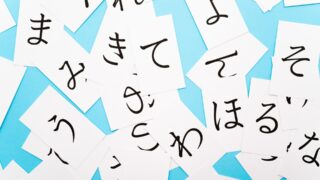
Now that you know a little more about the Japanese language, you are probably wondering how to best learn it. Well there are a number of answers to that question, and it can often depend on what your main objective for learning the language is. Of course everyone will learn differently and have their own best methods for studying, but we highly recommend joining a language school to get the most out of your studies in the shortest period of time. Find out more about the best language schools in the next section.
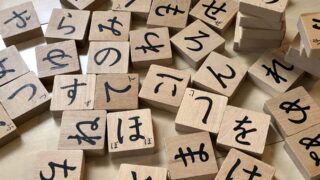
Even though you can find a lot of information and ways to learn Japanese here on our site, you’ll have the best results with your Japanese studies by attending a Japanese language school. This will give you the best opportunity to truly immerse yourself in the language and improve your skills at a rapid rate. There are plenty of great schools around and we have a great list of recommendations for you! Be sure to check them out and find one that suits your needs.
Sign up now: Tokyo Central Japanese Language School Classes

If you have already started studying Japanese, chances are you’ve heard of a test called the JLPT, or Japanese Language Proficiency Test. For those of you who haven’t, it’s the most well known and recognized test for foreigners studying Japanese or looking for work in Japan among other things. The test is given in 5 different levels of difficulty, from N5 to N1, with N1 being the hardest. Find out all about the test and the best ways to study for it with our article here .

Japan Wonder Travel is a travel agency that offers guided tours throughout Japan. From private walking tours to delicious Food and Drink tours, we can help you organize the best tours just for you! If you want to explore Japan and learn more about the history and backstories of each area you are visiting, our knowledgeable and friendly English speaking guides will happily take you to the best spots! In addition, we can provide you with any assistance you may need for your upcoming trip to Japan, so please feel free to contact us if you have any questions or need some help!
▶ Tokyo Fish Market Tour @Tsukiji – Enjoy Local Food and Drink Explore the most lively and popular fish market in Tokyo and try some of the local’s favorite street foods and sake with one of our friendly and knowledgeable English speaking guides!

▶ Tokyo 1–Day Highlights Private Walking Tour (8 Hours) There’s no better way to explore an area than taking a tour with a knowledgeable local guide. You will have the chance to learn about the history and interesting background stories of Tokyo, as well as discover some hidden gems which can be hard to do without a guide.
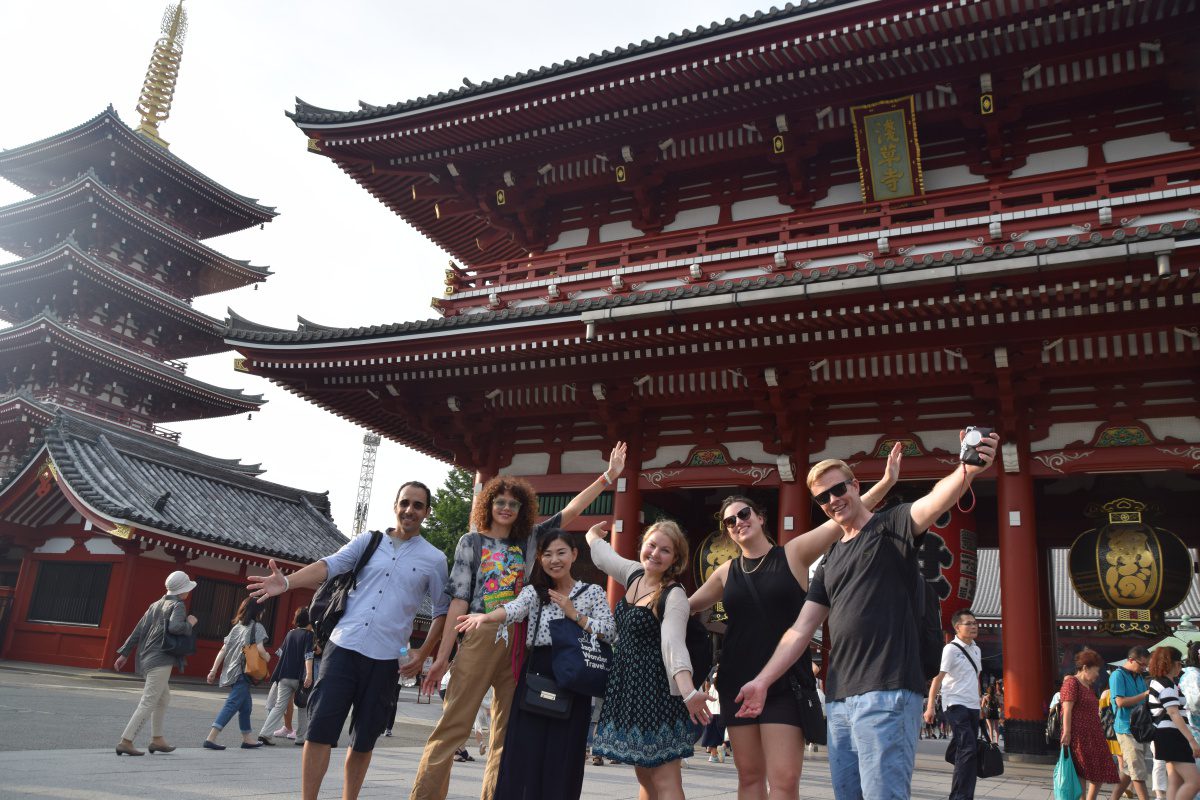
▶ Mt. Fuji Day Trip Bus Tour from Tokyo Experience the breathtaking views of Mt. Fuji by visiting the highlights of the area on our guided sightseeing bus tour! Departing from Shinjuku in central Tokyo, you can travel comfortably to all of the best spots in the area by bus.
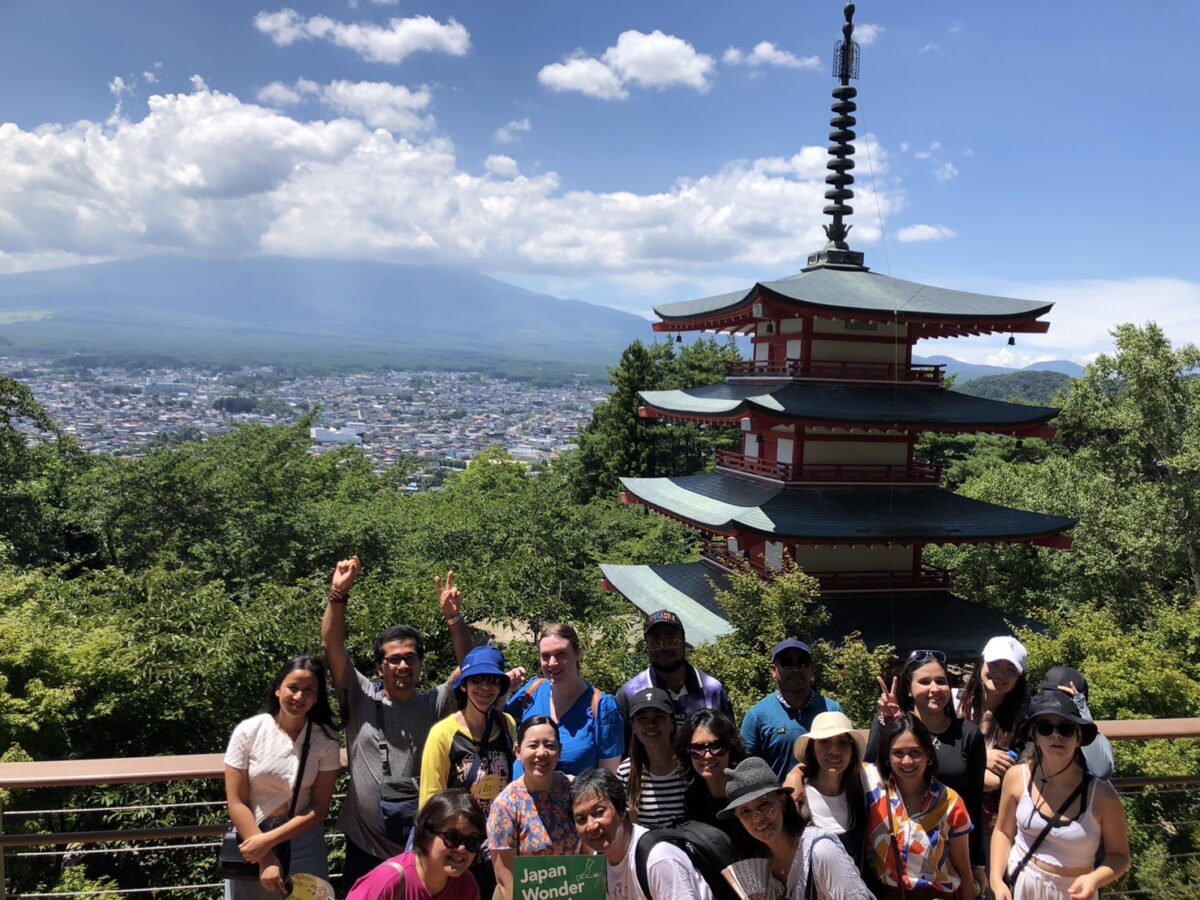
▶ Kyoto Private Full Day Walking Tour On this full-day private tour of Kyoto, you will be able to see the highlights of Kyoto in just one day and at the same time develop a deeper understanding of both the culture of the area and Japan as a whole.
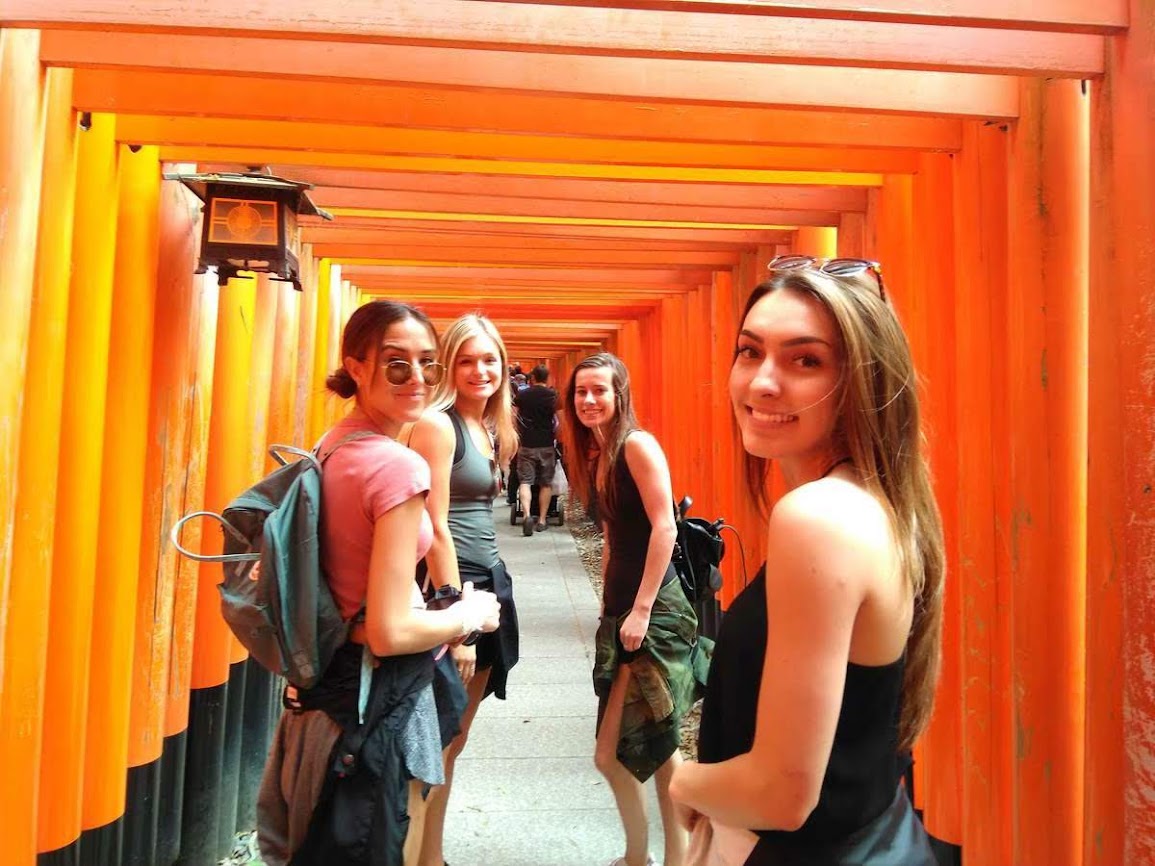
Follow us on Instagram , Facebook , Twitter , and TikTok for more travel inspiration. Or tag us to get featured!
Happy traveling!
Stay informed of the best travel tips to Japan, the most exciting things to do and see, and the top experiences to have with the Japan Wonder Travel Newsletter. Once every two weeks we will introduce you to our latest content.

- Popular destinations
- Hidden places in Japan
- Tours and workshop
- Food and drink in Japan
- Itinerary in Japan
- Places to visit in Tokyo
- Food and drink in Tokyo
- Seasonal events
- Tours & workshops
- Tokyo This Week
- Day trip from Tokyo
- Itinerary in Tokyo
- Places to visit in Kyoto
- Food and drink in Kyoto
- Itinerary in Kyoto
- Day trip from Kyoto
- Travel tips
- Accommodation
- Cultural tips
- Transportation
- Tokyo Tours
- Kyoto Tours
- Kimono Rental
- Fukushima Tours
- Mount Fuji Tours
- Tour Package
- Media Kit(English/日本語)
How to prepare for JLPT
Learning Japanese for Travel: Essential Resources for Communication
Introduction
Planning a trip to Japan can be an exciting adventure, and learning some Japanese before your journey can greatly enhance your travel experience. While it’s not necessary to become fluent in Japanese, having a basic understanding of the language can make communication easier and allow you to navigate through various situations. In this blog post, we will explore essential resources that will help you learn Japanese for travel and effectively communicate during your trip.
1. Phrasebooks and Travel Guides
Phrasebooks and travel guides are handy resources for learning essential phrases and vocabulary specific to travel situations. Look for pocket-sized phrasebooks like “Lonely Planet Japanese Phrasebook” or “Rick Steves’ Japanese Phrase Book” that include common phrases, pronunciation guides, and useful cultural tips.
2. Language Learning Apps
Language learning apps provide a convenient and interactive way to learn Japanese for travel. Apps like Duolingo, Memrise, and Pimsleur offer lessons focused on practical travel phrases and vocabulary. These apps often include audio recordings, quizzes, and interactive exercises to enhance your learning experience.
3. Online Language Lessons
Online language learning platforms and websites like italki, Verbling, and Preply offer one-on-one lessons with professional Japanese tutors. Taking a few lessons before your trip can help you learn basic conversational skills, improve your pronunciation, and gain confidence in speaking Japanese .
4. Online Travel Phrase Resources
Websites such as Japan Guide and Japan Talk provide useful travel phrase resources. These resources offer common phrases and expressions for various travel scenarios like ordering food, asking for directions, or making reservations. They often include audio recordings to help you practice pronunciation.
5. Language Exchange Meetup Groups
Participating in language exchange meetup groups in your local area or using language exchange platforms like ConversationExchange.com or Tandem can provide opportunities to practice speaking Japanese with native speakers. Meeting locals who are learning your native language can create a mutually beneficial environment for practicing conversational skills.
6. Travel-related Language Learning Podcasts
Listening to travel-related language learning podcasts, such as “Survival Japanese ” by JapanesePod101 or “Learn Japanese Pod” can improve your listening skills and provide valuable travel-specific vocabulary and phrases. These podcasts often include dialogues, cultural insights, and practical travel advice.
7. Travel Apps and Online Resources
Utilize travel apps and online resources specifically designed for navigating Japan. Apps like Google Translate, Japan Official Travel App, and Hyperdia (for train schedules) can help you communicate, find your way around, and access useful travel information in Japanese .
Learning Japanese for travel can greatly enhance your experience in Japan. By utilizing essential resources such as phrasebooks, language learning apps, online lessons, travel phrase resources, language exchange meetups, travel-related podcasts, and travel apps, you can effectively communicate and navigate various travel situations. Remember to practice regularly, be open to making mistakes, and enjoy the process of learning a new language. Have a wonderful trip to Japan!
For an in-depth review of Japanesepod101, you can check out this link .
My Recommendations for your Japanese learning
- Japanese Pod 101 My Honest Review Read more
- JLPT N5 Test Prep-course - The Expert Secret Check Out
Related Posts
Jlpt n3 grammar: か何か (ka nani ka) meaning.
It is essential to learn Japanese vocabulary when studying the language. In addition to words borrowed from other languages, Japanese…
Japanese Meaning of 肉 (niku) | JLPT N5
The role of katakana in japanese emphasis and expressiveness.
Katakana, one of the three scripts in the Japanese writing system, plays a significant role in adding emphasis and expressiveness…
Unconventional language hacking tips from Benny the Irish polyglot; travelling the world to learn languages to fluency and beyond!
Looking for something? Use the search field below.
Home » Articles » 25 Essential Japanese Phrases for Travellers and Tourists
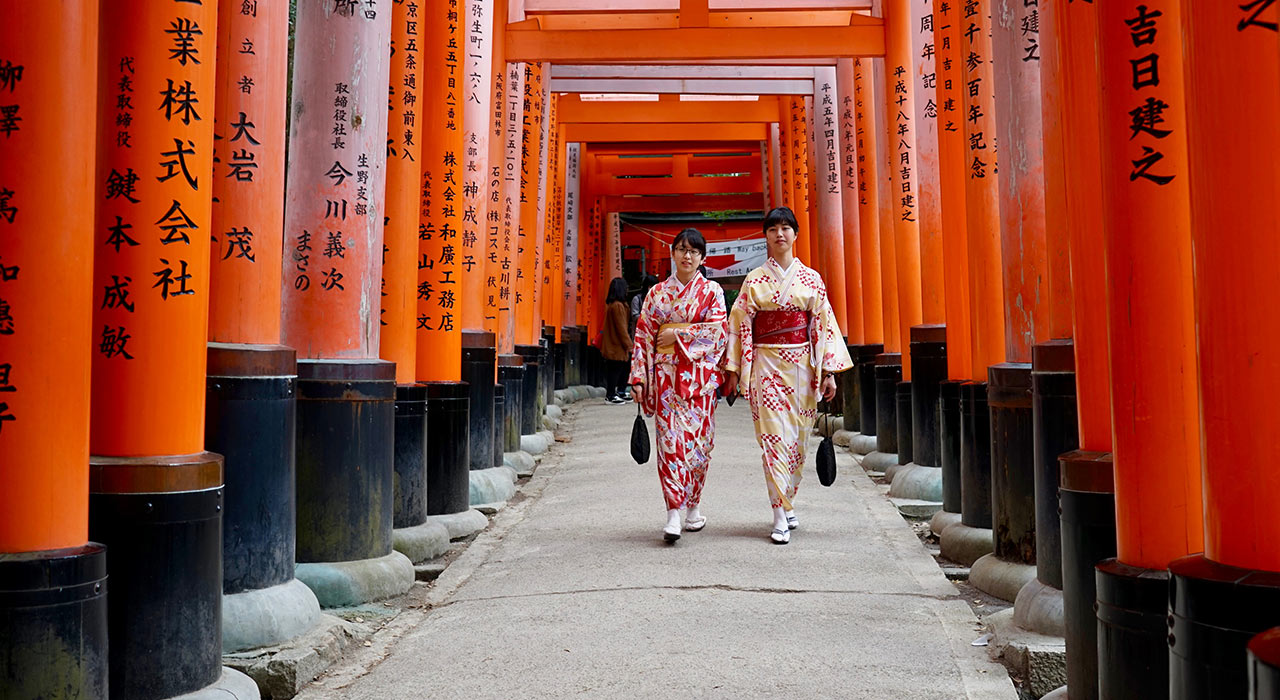
Full disclosure: This post contains affiliate links. ?
written by Caitlin Sacasas
Language: Japanese
Reading time: 12 minutes
Published: Dec 30, 2019
Updated: Sep 17, 2021
25 Essential Japanese Phrases for Travellers and Tourists
Getting ready to travel to Japan? You’ll need to know a few Japanese phrases before you go!
Learning even a few travel phrases in Japanese will break down a lot of barriers during your stay.
Japan is becoming more foreigner-friendly — you’ll notice updated signage includes English in main cities. And many Japanese people have spent some time learning English in school. But most people aren’t comfortable talking in English.
Japanese people know how hard it is to learn their language. They highly respect anyone who tries to learn and they appreciate your effort. Your willingness to try speaking Japanese will encourage them to try speaking the English they know. It’ll help you get by, and make your stay much more enjoyable.
Besides, it’s incredibly rewarding to visit a foreign country and connect with locals in their native language . And it shows a lot of respect for their culture, which the Japanese highly value.
So here are 25 essential Japanese phrases for all you travelers out there. All these phrases will be in formal, standard Japanese speech so they’re appropriate in any situation.
If you blast through these and you’re ready to learn more, check out JapanesePod101 . It’s the best podcast for learning Japanese, with courses dedicated to learning Survival Japanese — everything you need to know in Japanese to get by. Plus, there are culture classes, beginner to advanced lessons, and more. It’s definitely my favorite for getting started.
Okay, let’s start speaking Japanese!
1. “Hello” in Japanese – こんにちは ( Konnichiwa )
In Japanese, you can greet someone with こんにちは. It means “hello,” but there are many ways to greet someone in Japanese .
Konnichiwa also translates as “good afternoon,” so it’s best used during the day. In the morning, you can use おはようございます ( Ohayou gozaimasu ), and in the evening, こんばんは ( konbanwa ).
Konnichiwa actually means “This day is…” but it’s used now to say hello.
2. “Please” in Japanese – ください ( Kudasai )
There are a couple of ways to say “please” in Japanese. The most universal one is ください. It means “please,” and you’d use it to ask a favor of almost anyone.
For instance, if you’re at a restaurant, you can say メニューをください ( Menyu- o kudasai ) to say “Please give me a menu.”
If you want to be more polite, you could use お願いします ( Onegai shimasu ). Either version of “please” is okay, but this one is better if you’re asking something of someone with higher status, or if you’re asking for a service. At a restaurant, both ください and お願いします are acceptable. Another example: if you’re ready for the check, you say お会計お願いします ( o-kaikei onegai shimasu ).
Unlike English, where “please” can be at the beginning or end of the sentence, it always comes at the end of the sentence in Japanese.
3. “Thank You” in Japanese – ありがとうございます ( Arigatou gozaimasu )
To thank someone in Japanese, you say ありがとうございます. That’s the most common way.
But maybe you learned “thank you” was “ Domo arigatou , Mr. Roboto.” from the song. どもありがとう does mean “thank you” as well, but more like “Thank you very much.” And it’s a little less formal without the ending ございます ( gozaimasu ).
4. “Excuse Me” in Japanese – すみません ( Sumimasen )
When you want to get someone’s attention, you can say すみません, followed by your question or request.
You can also use this to ask someone (politely) to move, or even to apologize in place of “sorry.”
5. “Let’s Eat” in Japanese – いただきます ( Itadakimasu )
いただきます is a unique Japanese phrase. It’s used like “let’s eat” in English or “bon appetit” in French. But it’s original meaning is “I humbly receive” and it’s always said before every meal, even when you eat alone. It’s a way to give thanks for the food, almost like saying grace.
When eating with others, it’s the signal to begin eating. You clap your hands together in a prayer position and say “いただきます!”
But, if you wanted to suggest grabbing a bite to eat, the polite way to ask would be 食べませんか ( Tabemasen ka , “Would you like to eat?”).
6. “Thank You for the Food” in Japanese – ごちそうさまでした ( Gochisousama deshita )
After a meal, you always say ごちそうさまでした. It means “thank you for the food,” and you’d say it to whoever treated you to your meal or cooked your food. Even if you paid for or made your own meal, you say this as an expression of gratitude to have food to eat.
7. “One” in Japanese – 一つ ( Hitotsu )
There are two different ways to count in Japanese , but for most basic phrases you’ll need to know “one” as 一つ. Hitotsu is the universal counter for the number 1, meaning you can use it to specify how many of anything you want or have.
The phrase 一つをください ( Hitotsu o kudasai ) means “one, please.” You can use it to ask for one ticket, one pastry, one of anything while you’re out. Simply point and say Hitotsu o kudasai .
8. “Yes” and “No” in Japanese – はい ( Hai ) and いいえ ( Iie )
To say “yes” in Japanese, you say はい and “no” is いいえ. Both of these are the polite, formal way to say them. However, you’ll more often hear うん ( un ) and ううん ( uun ) even though these are informal. Since you’re learning the basics, stick to hai and iie for now, but just know you may hear un and uun from others.
There’s another way to say “no” that’s more common because it’s less direct than iie . I’ll get to that in a moment.
9. “What’s Your Name?” in Japanese – お名前は何ですか ( O-namae wa nan desu ka )
In Japanese, you can ask for someone’s name by saying お名前は何ですか. “Ka” is a question particle, so it takes the place of “?” at the end of a sentence in Japanese.
When replying, Japanese people say either only their last name or their last name and then first name. If you want to answer this question, you can simply say your name followed by です ( desu ). So here's how that exchange might look:
“お名前は何ですか。” ( O-namae wa nan desu ka ) “たけうちなおこです。お名前は何ですか。” ( Takeuchi Naoko desu. O-namae wa nan desu ka. ) “サカサスケイトリンです。” ( Sakasasu Keitorin desu. )
In that example, the other person is Naoko Takeuchi (if only I was so lucky as to introduce myself to the creator of Sailor Moon!). But in Japanese, she’s known by her family name first: Takeuchi Naoko.
As a 外国人 ( gaikokujin , “foreigner”), I could say my name as either Keitorin Sakasasu or Sakasasu Keitorin . Either way is fine.
After meeting someone, it’s respectful to say よろしくお願いします。( Yoroshiku onegai shimasu , “Nice to meet you.”)
10. “How are you?” in Japanese – お元気ですか ( O-genki desu ka )
In Japanese, you can ask someone how they are with お元気ですか. But it’s more common to say お元気でした ( O-genki deshita ), which is past tense for asking someone “How have you been?” You don’t often ask how someone is doing in Japanese, but rather how they have been since you’ve seen them last (when it’s been a while).
11. “I’m Sorry” in Japanese – ごめんなさい ( Gomen nasai )
To apologize in Japanese, you can say ごめんなさい ( gomen nasai ) or ごめんね ( gomen ne ). Gomen ne is more casual, but still quite common even in semi-formal situations. すみません ( Sumimasen ) works, too, or you could ask someone “Excuse me” and then follow with “Sorry” – ごめんね!
12. “What’s This?” in Japanese – これは何ですか ( Kore wa nan desu ka )
Chances are, in Japan, you’ll stumble across some wild and totally different things. There are a lot of things unique to Japanese culture , from the toilets to the vending machines. So this is a good phrase to have ready!
If you don’t know what something is, ask これは何ですか and someone will explain it to you or help you out.
13. “I Don’t Understand” in Japanese – わかりません ( Wakarimasen )
Still don’t know what that thing is? Or is someone trying to talk to you in Japanese, and you don’t follow along? Then reply with ごめんなさい。わかりません。( Gomen nasai. Wakarimasen ).
Don’t be embarrassed to explain that you don’t understand. It won’t hurt the other person’s feelings — and you’re just starting out! It’s better to be honest than to run into trouble because you pretended to understand .
14. “What Does _ Mean?” in Japanese – は何意味ですか (*__ wa nan imi desu ka*)
Didn’t understand a certain word in particular? You can then ask “ _ は何意味ですか. “ Insert the word you didn’t understand into the blank.
For instance, if someone told you that thing in the vending machine is a 傘 ( kasa ), and you don’t know what kasa means, then you can ask 傘は何意味ですか ( Kasa wa nan imi desu ka ). The other person can either explain it’s for rain — “雨のためですよ” ( Ame no tame desu yo ) — or they’ll tell you “umbrella” if they know it in English.
15. “Say it Again More Slowly, Please” in Japanese – もう一度ゆっくり言ってお願いします ( Mou ichido yukkuri itte onegai shimasu )
If you still don’t understand or can’t keep up, use this phrase. Japanese people talk very fast, and the words can run together easily. So if you didn’t understand because you need to hear it slower, say すみません、わかりません。もう一度ゆっくり言ってお願いします ( Sumimasen, wakarimasen. Mou ichido yukkuri itte onegai shimasu ).
Or, you could shorten it to ゆっくりお願いします ( Yukkuri onegai shimasu ). This is just “more slowly, please.”
16. “How do you say ?” in Japanese – _ は日本語で何と言いますか (*__ wa nihongo de nan to iimasu ka*)
If you don’t know the word for something in Japanese, you don’t have to completely revert back to English! You can say _ は日本語で何と言いますか and fill in the blank with the English word.
Using our umbrella example again, you could say “Umbrella は日本語で何と言いますか” and the other person can tell you it’s kasa .
17. “Do you speak English?” in Japanese – 英語を話せますか ( Eigo wo hanasemasu ka )
You can ask someone if they speak English with 英語を話せますか. You could use this phrase with any language, and swap out eigo (“English”) for any other language. 日本語を話せますか ( Nihongo wo hanasemasu ka ) means “Do you speak Japanese?”
If you’re really trying to learn the language, not just get by briefly on a trip to Japan, then I would encourage you to keep trying to speak only in Japanese . This is your chance to learn and really speak! Don’t waste it by reverting back to English. You can always use phrases like the last one – “ _ は日本語で何と言いますか” – over and over again to learn how to say what you need!
18. “Where is ?” in Japanese – _ はどこですか (*__ wa doko desu ka*)
If you’re lost or looking for something, and all the signs are in kanji that you can’t read yet, then ask someone for help with “ _ はどこですか.” Some words you might want to fill in the blank with:
- トイレ ( toire ) – Bathroom
- 駅 ( Eki ) – Train station
- 地下鉄 ( Chikatetsu ) – Subway
- バス停 ( Basu tei ) – Bus stop
- ホテル ( Hoteru ) – Hotel
- 地図 ( Chizu ) – A map
- 入口 ( Iriguchi ) – Entrance
- 出口 ( Deguchi ) – Exit
- レストラン ( Resutoran ) – Restaurant
19. “How Much is This?” in Japanese – これはいくらですか ( Kore wa ikura desu ka )
When you’re out shopping, you can find out the price of something by asking これはいくらですか. Keep in mind yen — represented by 円 ( en ) in Japan — is like counting pennies. If someone said 1000 yen ( sen en in Japanese), that’s actually about $10.
20. “It’s a bit…” in Japanese – ちょっと… ( Chotto… )
Ah, yes. The universal phrase, ちょっと. Chotto means “a little” or “a bit.” As a phrase by itself, it shows hesitation, and means “It’s a bit… (inconvenient, not good for me).”
You’ll hear this phrase used in place of no ( iie ) more than you hear a direct “no.” One thing you’ll learn is that Japanese is not a very direct language, and relies heavily on context and body language.
So, if you asked how much something was with “これはいくらですか” and it was too expensive, you can say “Aaa… chotto…” to say “Ah, that’s a bit pricey.” To be more direct, you could say ちょっと高い ( Chotto takai ), “It’s a bit expensive.” You may be able to score a cheaper price by being direct, but directness like that isn’t considered polite.
21. “What do you recommend?” in Japanese – おすすめは何ですか ( Osusume wa nan desu ka )
If you don’t know what’s good at a restaurant or shop, you can ask someone おすすめは何ですか to get their opinion.
This is a nice phrase to know because then you can ask locals what’s good around here, where you should eat, or what the house specialty is. It’s a good way to truly experience the country!
22. “Does this go to __?” in Japanese – これは__に行きますか ( Kore wa _ ni ikimasu ka)
This is another helpful phrase to know if you plan on using any of the public transportation. The train system can be especially confusing, so if you’re not sure you’re hopping on the right line, ask! “これは__に行きますか” will get a yes or no answer from someone. Fill in the blank with the destination of where you want to go.
23. “Do you have ?” in Japanese – __はありますか (* wa arimasu ka*)
If you’re looking for something, you can use the phrase “__はありますか” to ask. But this is also helpful if you’re at a restaurant and you’re wondering if they can meet your dietary needs. For instance, if you’re vegetarian, you could ask ベジタリアンメニューはありますか ( Bejitarian menyu- wa arimasu ka ).
If you can’t eat something specific, use the phrase “ は食べられません。” ( wa taberaremasen) For example, I can’t eat gluten. So I could say グルテンは食べられません。( Guruten wa taberaremasen. ) If it’s an allergy, you can say にアレルギーがあります。 (* ni arerugi- ga arimasu.*)
Here’s a few things you may not be able to eat:
- 肉 ( niku ) – Meat
- 牛肉 ( gyuuniku ) – Beef
- 豚肉 ( butaniku ) – Pork
- 鶏肉 ( toriniku ) – Chicken
- ピーナッツ ( pi-nattsu ) – Peanuts
- 小麦 ( komugi ) – Wheat
- 卵 ( tomago ) – Eggs
- 大豆 ( daizu ) – Soy
- 魚 ( sakana ) – Fish
- 貝類 ( kairui ) – Shellfish
- 乳製品 ( nyuuseihin ) – Dairy
24. “Can you take my picture, please?” in Japanese – 写真を撮ってもらえますか ( Shashin wo totte moraemasu ka )
Of course, you’ll want to capture your journey to Japan! So if you’re walking about and need someone to take your picture, you can politely ask them for the favor with 写真を撮ってもらえますか. Or you could simplify it with 写真ください? ( Shashin kudasai? )
25. “I’ll have a beer to start, please” in Japanese – とりあえずビールをください ( Toriaezu bi-ru wo kudasai )
This classic phrase is a must-know. Anytime you go out in Japan, you’ll hear people say とりあえずビールをください, or just とりあえずビール ( Toriaezu bi-ru )! It’s such a set phrase, everyone picks it up quickly. Drinking culture is a big part of Japan, and it’s rude to turn down a drink. Usually, everyone starts off the first round with beer, which is why this phrase is so common. When it’s time to toast, say かんぱい!( Kanpai , “Cheers!”)
Enjoy Your Trip to the Land of the Rising Sun with these Japanese Phrases!
These Japanese phrases will help you put the right foot forward during your stay in Japan, and help you have a deeper cultural experience.
Can you think of any other helpful Japanese phrases for travelers to know? Share them in the comments! 気を付けて ( Ki wo tsukete ) — or “Be safe!”
Caitlin Sacasas
Content Writer, Fluent in 3 Months
Caitlin is a copywriter, content strategist, and language learner. Besides languages, her passions are fitness, books, and Star Wars. Connect with her: Twitter | LinkedIn
Speaks: English, Japanese, Korean, Spanish
Have a 15-minute conversation in your new language after 90 days
Japanese For Tourists: 27 Essential Japanese Travel Phrases You Must Know

January 1, 2021
If a trip to Japan is on the cards for you, good for you! Japan is a wonderful country and is home to a vibrant culture, beautiful sights , amazing food , and a bustling city life.
However, when you get there, how are you going to get around? Sure, you may find some people that can speak English, but it’s not guaranteed, and even if you find english-speaking folks where’s the fun in that?
For the complete Japanese experience, you should know how to speak the Japanese language , right?!
Or at least you should know some basic words and expressions.
Learning Japanese can seem like quite a task for most people. But don’t worry, you don’t need to know the entire language. I have prepared a list of essential Japanese phrases that you should know if you’re planning on traveling to Japan .
These common phrases will make it easy for you to make your way through Japan, and even engage in small conversations.
Greeting people, thanking them, and asking for directions will all become simpler if you know these key phrases.
Let’s start!

1. Please: Kudasai ください
2. thank you: arigato gozaimasu ありがとうございます, 3. excuse me / sorry: sumimasen すみません, 4. yes: hai はい – no: iie いいえ, 5. where is the toilet: toire wa dokodesu ka トイレはどこですか, 6. good morning: ohayou gozaimasu おはようございます, 7. good afternoon: konnichiwa こんにちは, 8. hello: konnichiwa こんにちは, 9. good evening: konbanwa こんばんは, 10. goodbye: sayonara さようなら, 11. my name is…: watashi no namae wa … desu 私の名前は…です, 12. how are you: o genki desu ka お元気ですか, 13. i’m fine, thanks: hai, genki desu はい, 元気です, 14. this is fun/interesting: omoshiroi desu おもしろいです, 15. one more time/again: mou ikai もういっかい, 16. what is this: kore wa nan desu ka これは何ですか, 17. i’d like something: “something” o kudasai …をください, 18. how much is this: ikura desu ka いくらですか, 19. the bill/check, please: okaikei wo, onegaishimasu お会計をお願いします, 20. do you accept credit cards: kurejitto kado wa tsukaemasu ka クレジットカードは使えますか, 21. before eating a meal: itadakimasu 頂きます, 22. your recommendation: omakase お任せ, 23. non smoking seat: kinen seki 禁煙席, 24. i don’t understand: wakarimasen 分かりません, 25. can you speak english: eigo wa hanasemasu ka 英語を話せますか, 26. can you translate this for me: yakushite, kudasai 訳してください, 27. help me: taskete たすけて, 1. japanese for busy people – latest prices here, 2. japanese for travelers – latest prices here, 3. japanese phrase book – latest prices here.
- 4. Lonely Planet Phrasebook & Audio CD – Latest Prices Here (New Updated Version Here)
5. Lonely Planet Fast Talk Japanese – Latest Prices Here
6. remembering kanji – latest prices here, iii- wrapping up, i- japanese for tourists – japanese travel phrases.
Here are a few phrases in Japanese that will help you greet people, ask for help, and also make basic conversation.

There are two ways to ask for things; you can either demand it, or you can politely ask for it. Guess which one will make people more likely to help you out. Saying please is important if you’re going to a foreign land. Even when ordering food, you should say “please” at the end to sound polite.

Just like saying please, showing gratitude is encouraged – not just Japan, but anywhere in the world. In Japan, people usually bow down when they’re showing gratitude.

If you want to get someone’s attention, or if you bump into someone on the road or in a restaurant, you can use this phrase to apologize to them. This is one of the most common phrases that you will be using while in Japan.

To show consent, you use the word “hai.” You can also use it to show that you understand what the other person is saying. If you’re denying something or not giving permission, you use the word “lie,” which means no.

When you’re traveling, you might not always be near your hotel when you need to use the restroom, so it’s essential that you know how to ask someone where the nearest toilet is.

This is a formal way of saying good morning. However, if you want to say it informally, you can simply say, “Ohayou.”

Yes, it’s the same as Hello! Konnichiwa, when used at noon or around that time, means good afternoon.
If you want to say hello to someone in a formal or informal way, you can use this word. It is a term that is used as a very broad way of greeting someone and can also mean good morning or good afternoon.

This word can be used as both a formal and an informal way to say good evening.

When you’re taking leave from somewhere, you can use this word to signify that you’re going. Although it also means “goodbye forever” and that’s why you probably should say “Ja na” instead which is more widely used.

When you’re introducing yourself to someone for the first time, you first start off with your name. In Japanese, your last name will come first, as opposed to English.

It is generally a nice gesture to ask how the other person is doing after you introduce yourself to them. It makes for a pleasant conversation.

If someone asks you how you are, then this is how you should reply to them.

If you want to show that you’re interested in something or having a good time, you can use this phrase. If you’re with a guide or someone is showing you around the city, this is a good way to let them know that you’re enjoying yourself.

If you want someone to repeat something because you haven’t fully understood what they’re saying, then you can say this. Or if you liked a piece of food and you want more you can also say this. Note that it’s always better to end your request with “ Kudasai “.

Generally, if you can’t figure something out or want to know more about a particular object or situation, you can use this phrase to ask someone to tell you more about it.

You should definitely try new things to eat in Japan. If you want to ask for something to eat, then this is the phrase to use.

“Ikura” in Japanese means “how much.” Even if you don’t know the name of the item that you want to buy, you can simply point towards it and ask how much it is for by using this phrase.

When you are done eating at a restaurant, and you want to pay up and leave, you can ask for the bill by saying, “Okaikei wo, onegaishimas.”

You might not always have cash on you; neither is it recommended for you to carry a lot of cash on your person at all times. If you want to ask a shop or restaurant if they accept credit cards, use the phrase, “ Kurejitto kado wa tsukaemasu ka ”.

This is a phrase that is used very commonly in Japan before eating a meal. It means that you humbly receive what comes your way as food. You also use this phrase to thank the other person for the food.

You might not always know the best thing on the menu, especially if you’re visiting Japan for the first time, or even that restaurant for the first time. So if you ever need to ask the chef to recommend something for you according to your taste, then you can use this phrase.

Not everyone smokes and so they might want a seat in the non-smoking zone. You can use this phrase to show your preference.

If someone says something that you don’t understand, you can use this phrase to indicate to them that you didn’t get what they were saying to you. Using the phrase, “Mou Ikai,” you can ask them to repeat what they said in Japanese or use the next phrase to ask them to say it in English.

It is quite understandable that you won’t know how to keep a full conversation going in Japanese. So if you need to make a detailed conversation with someone, then you can first ask them whether they know how to speak English. It can make things much easier for you.

You might need quite a bit of help with translation, especially if you’re at the grocery store and you need to read the ingredients on a certain packet. You can politely ask a native speaker to help you with that.

This is the simplest way to ask for any assistance.
II- Additional Resources to Learn Japanese for Tourists
If you wish to learn the Japanese language in even more detail, here a few books that can help you learn the language before your trip to Japan.
You also can find more expressions and their pronunciations here .

This is one of the most popular books on the Japanese language. It has more than 20 components, including videos and manuals, that can help you learn the language right from the very basics. Which is perfect for who really wants to learn Japanese and also for the occasional traveler who want simple Japanese for tourists.

Not only does this book give you enough information on the Japanese language, but it also has a lot of travel tips for you. If you’re visiting Japan for the first time, then this is your go-to book. This book is also a rather small-sized one, so you can easily fit it in your travel bag. Keep it with you and read it while you’re in your hotel room.

This book can help you get familiar with everything you need to know about the Japanese language. It has all the possible phrases that any traveler will need. This book is also extremely useful for those people who are already aware of the basics of Japanese, to get to know all about travel-specific language. Moreover, this is a pocket-sized book that you can easily carry around with yourself wherever you go.
4. Lonely Planet Phrasebook & Audio CD – Latest Prices Here ( New Updated Version Here )

This is another book that can help you with Japanese travel phrases. More than anything, you will enjoy reading this book. It also has an audio CD that can help you pronounce the words in the correct way. It also has a very friendly layout that makes it all the more attractive with categories that have travel scenarios. This too is pocket-sized, so carrying it around is extremely easy.

This book, too, has all relevant phrases that can help you get through your trip without getting stuck at any instance. Again, just like a few of the books mentioned above, you can carry this one around in your pocket.

This is a book that is different from the rest in terms of the fact that the Japanese government approves of it . This book will help you differentiate between the writing and the meaning of different Japanese characters so that it is easier for you to remember. However, this book is not meant for beginners; you need to have a basic understanding of the Japanese language to use this book to its fullest.
I really hope that you find these Japanese travel phrases guide useful. You can have a wonderful time in Japan if you know some common phrases that you can use all throughout your trip. These can help you make basic conversations with native speakers. Using these phrases, you can ask for help, get directions, ask people to translate certain phrases for you, and other things that will only add to your trip to Japan.
About the author

Travel Reporter & Editorial Director
Ph.D. in Geography, Travel Photographer, and Software Engineer. Been on 4 continents and loved them all.
Latest Posts

The Best Ryokan in Hiroshima for an Authentic Japanese Stay
Read more →

The Best Time to Visit Kyoto

Where to Stay in Hiroshima? The Best Areas and Places
Travel Guides You Can Trust
About Travelness
Brand Assets
Recent Posts
Tours & Activities
Tours in Europe
Digital Security
© 2024 Travelness. All Rights Reserved.
Terms of use - Privacy policy

Japanese Language Cheatsheet For Travelers Going to Japan but don't want to really learn Japanese? Use a cheatsheet.
August 17, 2009 • words written by Koichi • Art by Aya Francisco
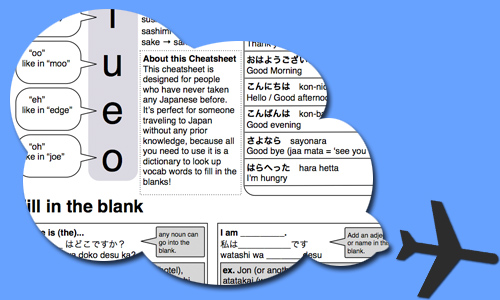
My boss is heading to Japan for a few days next week (lucky!), so I'm helping him with some really last minute language study before he heads out. The goal isn't to teach him any grammar, vocabulary, or anything like that, the goal is to make sure he's able to get by as simply as possible. That's why I made him a one-page cheatsheet, and then sharing it with all of you.
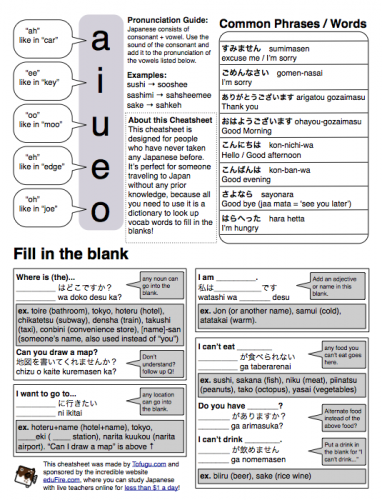
You can download it by clicking on the image of it up above, but let me offer some explanation on the pdf as well.
- This document was created for people with little to no Japanese language ability or experience. So, if you know a lot of Japanese then you should probably take a look at some other cheat sheet. It's good if you're traveling to Japan, don't know any Japanese, and want to have the bare minimum to get by.
- I've included the "Japanese" version of most everything on there. This isn't for the user of the sheet, it's more for people who just can't pronounce anything so that way they can just point to different things and native Japanese speakers will be able to read it.
- The "fill in the blank" section will probably require a dictionary (I'd recommend getting one on your phone if you can). I've included possible vocab words that you can put in the blanks right on the cheat sheet, but that won't cover every possible situation. With a dictionary you'll have a lot more flexibility.
- The Japanese language pronunciation guide might be a little confusing, but I couldn't think of a better way to describe it. Most Japanese "letters" consist of both a consonant and a vowel (or just a vowel), and the sound of the vowel is pretty much always the same no matter what consonant is attached to it. Just do your best and point to things on the sheet all confused-kine if you have to. If you want to go more in depth on the pronunciation try learning some hiragana .
- Of course, I'd recommend you actually go learn some Japanese rather than relying on this cheatsheet if you are planning on going to Japan. It'll make your life a lot easier, and a one-pager won't get you very far. It's one page, and covers only the bare minimum!
Hope you enjoy it and find it useful. Feel free to share it around, give it to a friend, etc etc. Once again, here's the download link !
10 Essential Tips For First-Time Travelers To Japan
To make the most of your journey to Japan it's crucial to be well-prepared. Here are 10 tips for your first visit to Japan.
Dominique Jackson • Nov 9, 2023
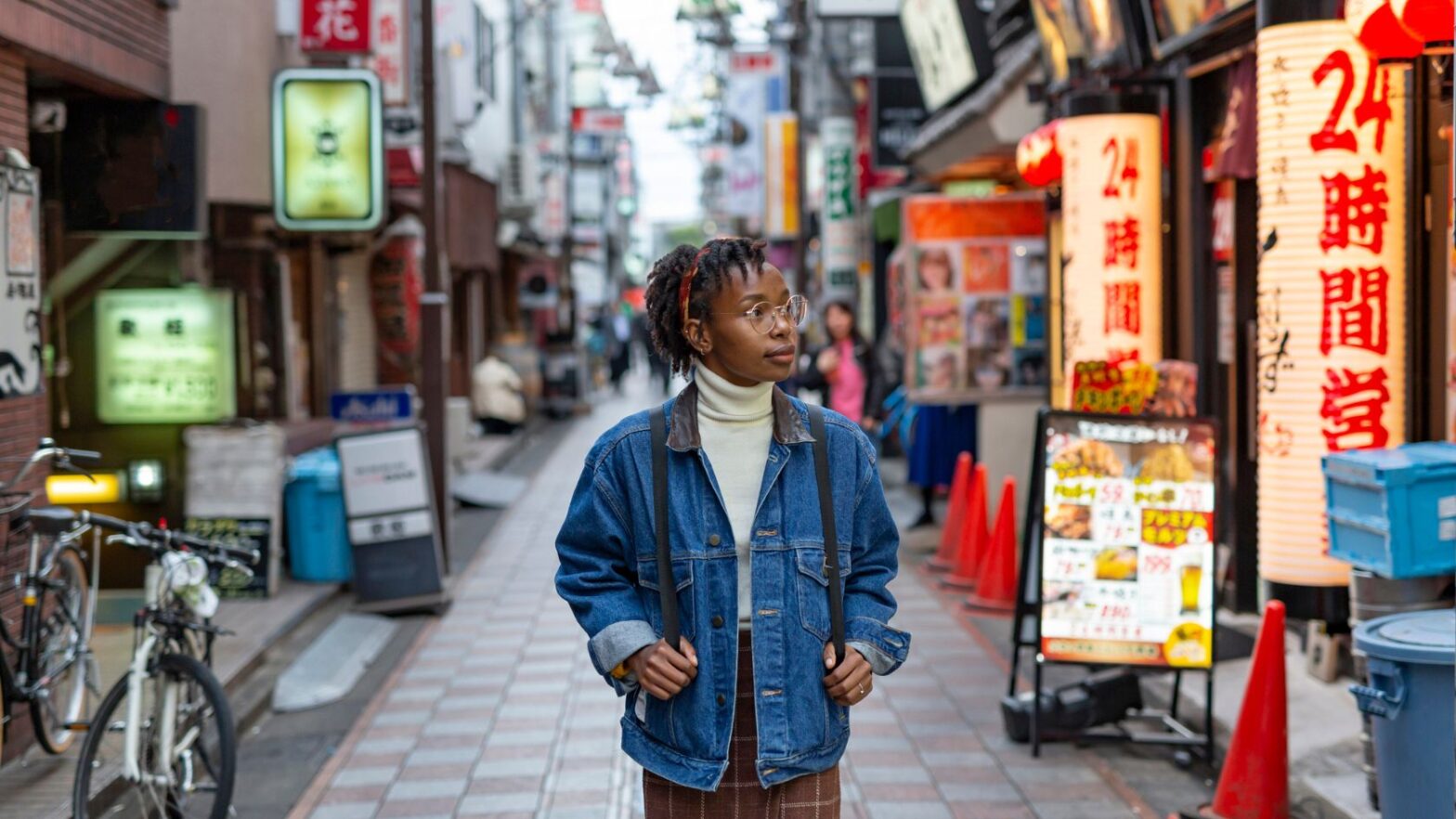
Japan is a country that effortlessly blends ancient traditions with cutting-edge technology. From its rich history and stunning natural landscapes to its vibrant cities and world-renowned cuisine, Japan has something to offer every type of traveler.
However, to make the most of your journey, it’s crucial to be well-prepared. Here are 10 tips for your first visit to Japan.
Learn Basic Japanese Phrases
While many people in Japan, especially in urban areas, can speak some English, it’s polite and helpful to learn a few basic Japanese phrases. Greetings like “Konnichiwa” (Hello) and “Arigatou gozaimasu” (Thank you) will go a long way in fostering goodwill and communication with locals. You can download language apps like Duolingo to help you practice.
Respect Local Customs and Etiquette
Japan has a strong emphasis on etiquette and customs. Bowing is a common form of greeting, and it’s important to remove your shoes when entering homes, traditional ryokans, or some restaurants. Familiarize yourself with dining etiquette, like not tipping and not speaking on the phone in public places.
Japan Rail Pass
If you plan to explore multiple cities in Japan, consider purchasing a Japan Rail Pass. This cost-effective pass provides unlimited travel on Japan Railways (JR) trains for a specified period, offering significant savings for long-distance travel.
Master the Train System
Japan’s rail system is world-renowned for its efficiency and punctuality. However, it can be daunting for first-time visitors. Familiarize yourself with train schedules, ticketing procedures, and station layouts. Hyperdia is a useful app for planning train journeys.
Pocket Wi-Fi
Renting a pocket Wi-Fi device is a lifesaver for staying connected in Japan. It provides reliable internet access, making it easier to navigate using maps, translate text, and stay in touch with loved ones.
Try Local Cuisine
Japanese cuisine is famous worldwide, and trying local dishes is a must. Don’t limit yourself to sushi; explore ramen, tempura, takoyaki, and street food. Be adventurous and savor the flavors of Japan.
Onsen Etiquette
Visiting an onsen (hot springs) is a quintessential Japanese experience. Familiarize yourself with onsen etiquette, which often includes bathing naked and following specific procedures. Tattoos are generally not allowed in many onsens, so check their policies in advance.
Respect Nature and Environment
Japan’s natural beauty is a sight to behold, from cherry blossoms in spring to colorful foliage in autumn. When visiting parks and natural areas, follow the “leave no trace” principle and be mindful of local rules and regulations.
Garbage Disposal
Japan is exceptionally clean, and you’ll rarely find public trash cans. Carry a small bag for your trash and dispose of it properly. Recycling is taken seriously, so sort your trash according to local guidelines.
Plan for Seasonal Events
Japan has numerous festivals and events throughout the year, such as cherry blossom festivals (sakura) in spring and vibrant matsuri (festivals) in summer. Research the dates and locations of these events to enhance your cultural experience.
Traveling to Japan for the first time is an exciting adventure that can be greatly enhanced by being well-prepared and respectful of local customs. Learning basic Japanese phrases, embracing the cuisine, and understanding the intricacies of Japanese culture will ensure a memorable and enjoyable trip. By following these tips, you’ll be well-equipped to explore the Land of the Rising Sun with confidence and appreciation.
Subscribe to travel noire
Get more travel content
Subscribe to Travel Noire, a free daily newsletter that features the best of travel, destinations, and guides to the cities you love from a new point of view — yours.
By subscribing to this newsletter, you agree to our terms of service and privacy policy.
Popular posts
Trending stories in world travel
Press ESC to close
Japanese phrases and etiquette for travel in japan.
If you decided to read this article, it’s probably because you are either interested in, planning on, or currently traveling in Japan. The language barrier in Japan can sometimes make travel a bit intimi dating , but it doesn’t have to be.
Learning a few basic phrases and some etiquette will help you feel a bit more confident as you go through Japan, even if you still stick out as a foreigner.

- 1 The BasicsPhrases and Etiquette for Travel in Japan
- 2 What Verb Should I Use?
- 3.1 Etiquette in Japan
- 4.1 Casual & Formal way to say “Thank you” and “I’m sorry” in Japanese
- 4.2 Learn Japanese phrases and etiquette online with BondLingo ?
- 5.1 Related
The Basics Phrases and Etiquette for Travel in Japan
If you’re traveling to any foreign country, it’s a really good idea to know some essential phrases and etiquette to help you get by. Of course you’ll want to know “yes” (はい: hai ) and “no” (いいえ: iie ), but here’s a list of other super basic phrases you probably already have down.
Remember as you travel that it’s important to be polite in Japanese. All of these phrases use more formal Japanese because you’ll generally be using them with people you don’t know. You should also remember to bow when saying “thank you” or when stopping someone to ask for help.
What Verb Should I Use?

Now that we’ve talked about some of the basics (and we can ask anyone where the bathroom is), let’s talk about how to discuss travel plans. This can be helpful in normal conversations with friends, or when asking for directions.
One of the big questions with talking about methods of travel is knowing which verb to use. Sometimes verbs in Japanese can be tricky, so let’s look at some verbs that pertain pretty specifically to travel .
Of course, there’s the verb “to go,” which is iku (行く). A lot of times, it’s going to be alright to use this one. Iku is especially good for describing a mode of transportation. You can do this by using the particle de (で), which in these cases means something like “by means of.”
“ Basu de iku ” means “To go by bus” (バスで行く), “ Densha de iku ” is “To go by train” (電車で行く), and so on.
The verb for “to ride” or “to take” is noru (乗る). So you can also say “ Basu ni noru ” (バスに乗る) and it only changes the meaning to “To take the bus.” These are generally interchangeable, but they do have subtle differences in both English and Japanese.
You can also combine noru and iku and say “ Basu ni notte iku ” (バスに乗って行く). You might hear this phrase used as well.
Common Phrases and etiquette When Asking For Directions
As you travel , you might need to ask for directions at some point. Sometimes you’ll be lucky enough to find someone who speaks English and can help you out, but that’s going to be pretty rare (especially if you’re going to rural, less touristy places).
Here’s a list of words that will help when you’re giving or receiving directions.
Etiquette in Japan

Being polite is always a really good idea when going to a foreign country, and that applies especially to a country like Japan.
Japanese culture is built on etiquette, so if you want to travel there, make sure you know the rules pretty much everyone follows. Of course, not everyone follows the rules all the time. But you’re going to stick out as a foreigner, and you’ll probably feel more comfortable if you try.
As I mentioned before, bowing is super important. There’s a bunch of unspoken rules on when to bow, how low, and for how long. For a casual traveler though, you’ll just want to make sure you bow when you say thank you or if you happen to get in someone’s way. You might notice that even a head nod is enough (like for when someone holds a door open for you). You aren’t going to be making any formal apology bows though, so don’t worry about all the little details too much.
Another big unspoken rule is that people generally stay quiet on public transportation. Trains and buses are almost silent in Japan. If you need to have a conversation, try to keep it quiet so you don’t disturb the other passengers.
Also keep an eye out for Women Only cars on trains. In more rural places, they might only be labeled in Japanese, so you may need to be careful. If you’re a man and you get on one of these, you’re definitely going to get a lot of dirty looks.
Eating and drinking while you’re walking is also frowned upon. People will buy drinks (from conbinis and vending machines), and then just stand and drink them because it’s a little rude to walk around with them.
These are just a few examples. It never hurts to do a bit of research before traveling in a new country to make sure you’re respectful during your trip .
Traveling in Japan can be an absolute blast! There’s so many places to go, and Japanese people are honestly some of the kindest I’ve ever met. It’s a super safe country, and pretty much everyone I talked to was happy to help whenever I got lost.
Doing a little preparation with your language skills, and really trying to understand and follow some basic Japanese etiquette will help you feel more comfortable as you travel through Japan.
Casual & Formal way to say “Thank you” and “I’m sorry” in Japanese
Learn Japanese phrases and etiquette online with BondLingo ?
Study in japan.

Share Article:
Learn Japanese online with BondLingo? Want to learn more about Japanese language and cultures with Japanese teacher for free ?
Let’s Study in Tohoku, Japan!
Top 10 tips for passing the jlpt.

IMAGES
VIDEO
COMMENTS
Asa (朝) - Morning. This one is fairly self-explanatory: asa means morning. While it's no surprise that a food-loving culture like Japan has multiple words for breakfast, one of the most common is asagohan ( gohan literally means rice, but is more generally used to mean food ). 14. Kyou (今日) - Today.
Greetings and Basic Japanese Phrases. I'll provide the hiragana, kanji and romaji for each word, and will explain the use of certain Japanese phrases for tourists in context. 1. Hello — konnichiwa. こんにちは. 2. Good morning — ohayou gozaimasu. おはようございます. 3.
Additional resources to learn Japanese phrases for travel. These resources boosted my Japanese language learning specifically. To learn any language quickly, ... and became a #1 Amazon New Release in two categories including Japan Travel. Alyse's unique approach to travelling has resulted in her work being featured on Japanese TV, in tourism ...
If you spend time learning any basic Japanese phrases and words, start with these 83 Japanese travel phrases so that you can head into Japan on the right foot! Regardless of where you are or what you're doing, two of the most important words you'll need to know are arigatou gozaimasu and sumimasen. Arigatou (gozaimasu) means "thank you ...
First, if you want to talk to someone, you'd better start with a greeting. If you meet somebody in the morning, you can start the conversation by saying: おはようございます。. Good morning. Ohayou gozaimasu. こんにちは。. Good afternoon/Hello. Konnichiwa. こんばんは。.
English Translation: English, please. This is another important Japanese travel phrase. De is the particle, and in this case it means "by" or "by means of.". The phrase literally translates as "English by please.". You can also say M saizu de onegai shimasu (Mサイズでお願いします) which means "Medium size, please.". 2.
Get "Point and Learn Japan Travel Conversation" for your trip. It's an travel phrase application for Taiwanese Mandarin. Features: Easy-to-use on your trip: You can find expressions and words whenever you need. Just touch the icon. It's ready for use in a minute. Perform comfortably: You can flick and shake. See light and smooth move.
Top 30 Japanese Phrases. Outside of Japanese greetings, here are the top 30 phrases that you should learn before visiting Japan: Excuse me - Sumimasen* (すみません) - This phrase is important when trying to get the attention of your waiter in restaurants, and when passing people in tight quarters.
Arigatooooo for watching \(^o^)/Today we're going to learn 100 phrases that will help you to understand Japanese and communicate with Japanese people in Japa...
英語のメニューはありますか Eigo no menu wa arimas ka (here comes that ' 〜wa arimas ka ' structure again). 10. Good-bye. さようなら Sayo-nara. There is this beautiful old Japanese song called 'Sayonara (1979)' by a band called Off Course, but I digress…. 11. Numbers. Here is the super easy way to learn Japanese ...
Here are useful Japanese travel phrases and words which will help you to explore Japan. こんにちは ( Konnichiwa) - Hello. ありがとう ( Arigatou) - Thank you. すみません ( Sumimasen) - Excuse me/I'm sorry. はい ( Hai) - Yes. いいえ ( Iie) - No. お願いします ( Onegaishimasu) - Please. どうも ( Doumo ...
Essential Japanese travel phrases. 3.1. Basic Japanese phrases for travelers. Basic Japanese phrases for conversation that showcase politeness and cultural respect, encouraging positive interactions with locals and are a base for every communication. Those are basic phrases to know when visiting Japan.
You can use these Japanese common daily phrases everyday in Japan. ' Yoyaku (予約)' means 'reservation'. To tell someone you have a reservation, you say, "yoyaku ga ari masu ". ' Otooshi (お通し)' refers to an appetiser that you receive in exchange for paying a mandatory entry/table fee that some restaurants will charge.
The Ultimate Guide to Learning Japanese. Bryce was born in California, but raised from the age of 3 near Seattle, Washington. He's been living in Tokyo for about 7 years, and graduated from Temple University, Japan with degrees in economics and international business. He loves traveling of course, but also cooking, snowboarding, some video ...
What you'll learn. Ask basic questions and understand basic answers in Japanese related to travel. Speak to hotel staff, ask for directions, order food, and more. Hear how native Japanese speakers pronounce the vocabulary and phrases. See how what you've learned can be used in real life with role playing examples between a native and non-native ...
Practice common Japanese phrases for travel! ️ Get the full travel phrasebook for free: https://bit.ly/3F3RpHVLet's learn Japanese! This video includes the ...
Language learning apps provide a convenient and interactive way to learn Japanese for travel. Apps like Duolingo, Memrise, and Pimsleur offer lessons focused on practical travel phrases and vocabulary. These apps often include audio recordings, quizzes, and interactive exercises to enhance your learning experience. 3. Online Language Lessons.
The phrase 一つをください ( Hitotsu o kudasai) means "one, please.". You can use it to ask for one ticket, one pastry, one of anything while you're out. Simply point and say Hitotsu o kudasai. 8. "Yes" and "No" in Japanese - はい ( Hai) and いいえ ( Iie) To say "yes" in Japanese, you say はい and "no" is ...
For now though, your goal is to develop a habit of collecting, processing, and studying vocabulary that is unfamiliar to you. This should become second nature. 1. Collecting Vocabulary. Most likely, you will find most of the vocabulary that you want to learn in your Japanese textbook (we'll cover that really soon!).
I- Japanese for Tourists - Japanese Travel Phrases. Here are a few phrases in Japanese that will help you greet people, ask for help, and also make basic conversation. 1. Please: Kudasai ください. There are two ways to ask for things; you can either demand it, or you can politely ask for it. Guess which one will make people more likely to ...
Of course, I'd recommend you actually go learn some Japanese rather than relying on this cheatsheet if you are planning on going to Japan. It'll make your life a lot easier, and a one-pager won't get you very far. It's one page, and covers only the bare minimum! Hope you enjoy it and find it useful. Feel free to share it around, give it to a ...
However, to make the most of your journey, it's crucial to be well-prepared. Here are 10 tips for your first visit to Japan. Learn Basic Japanese Phrases. While many people in Japan, especially in urban areas, can speak some English, it's polite and helpful to learn a few basic Japanese phrases.
Etiquette in Japan. Being polite is always a really good idea when going to a foreign country, and that applies especially to a country like Japan.. Japanese culture is built on etiquette, so if you want to travel there, make sure you know the rules pretty much everyone follows. Of course, not everyone follows the rules all the time. But you're going to stick out as a foreigner, and you'll ...